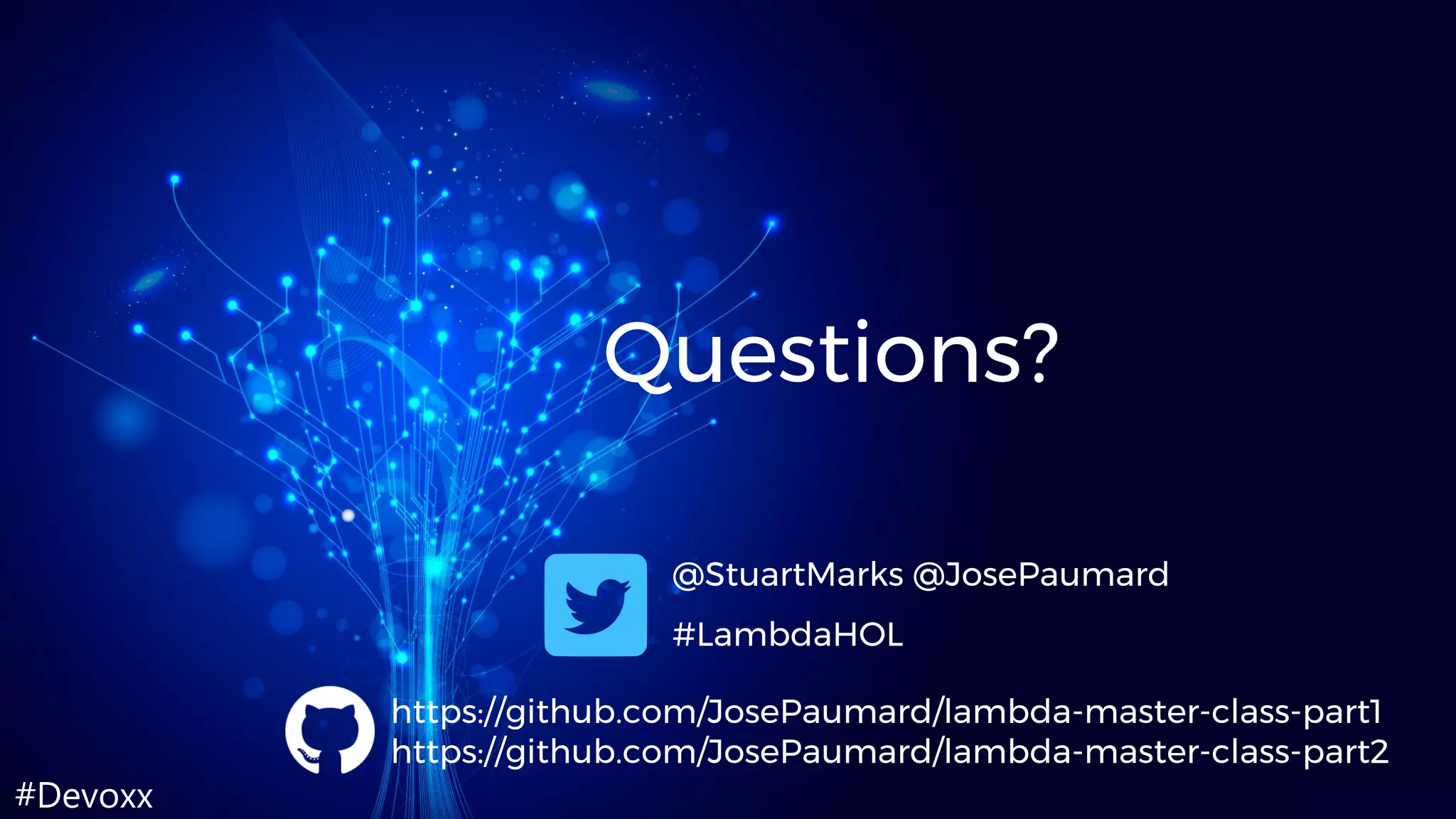The document outlines a Java Lambda and Stream Master Class presented at Devoxx, focusing on advanced stream operations such as map, filter, flatMap, reduction, and function combination. It includes practical examples demonstrating sorting and filtering with comparators, manipulating strings, and using collectors like toMap and groupingBy to aggregate data. Additionally, it discusses the implementation of custom collectors to handle duplicate keys and combines predicates for filtering collections.

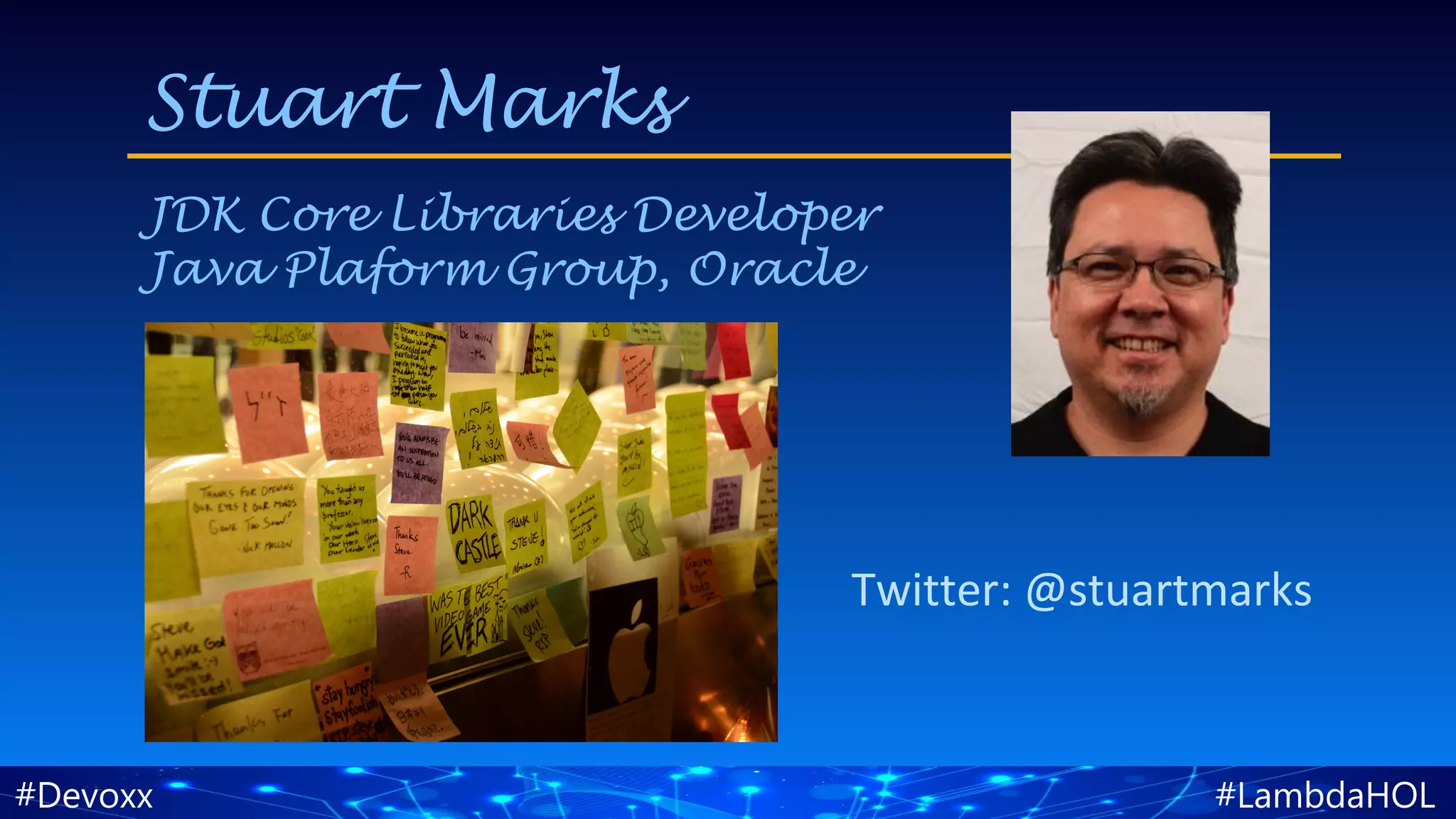
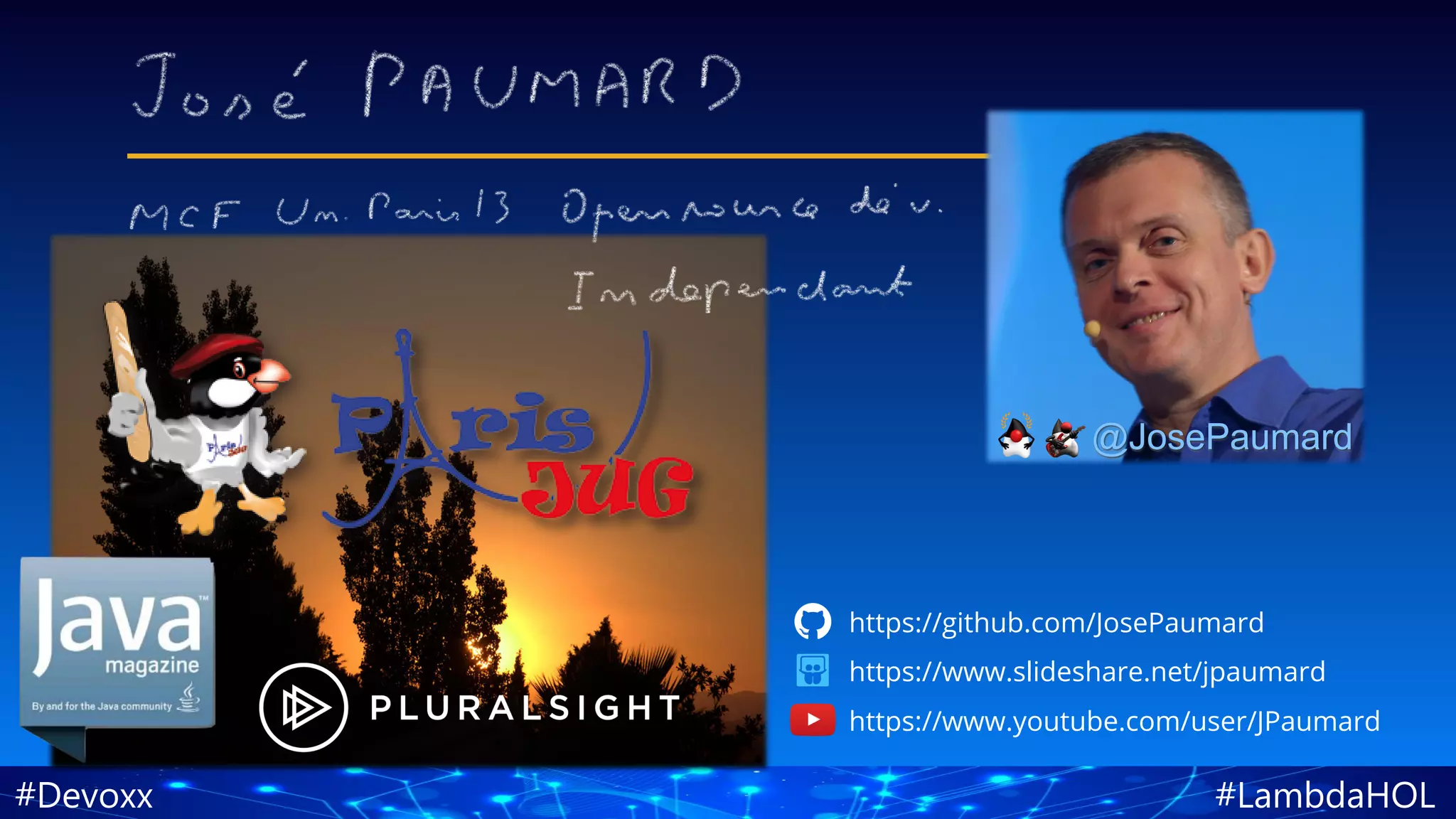
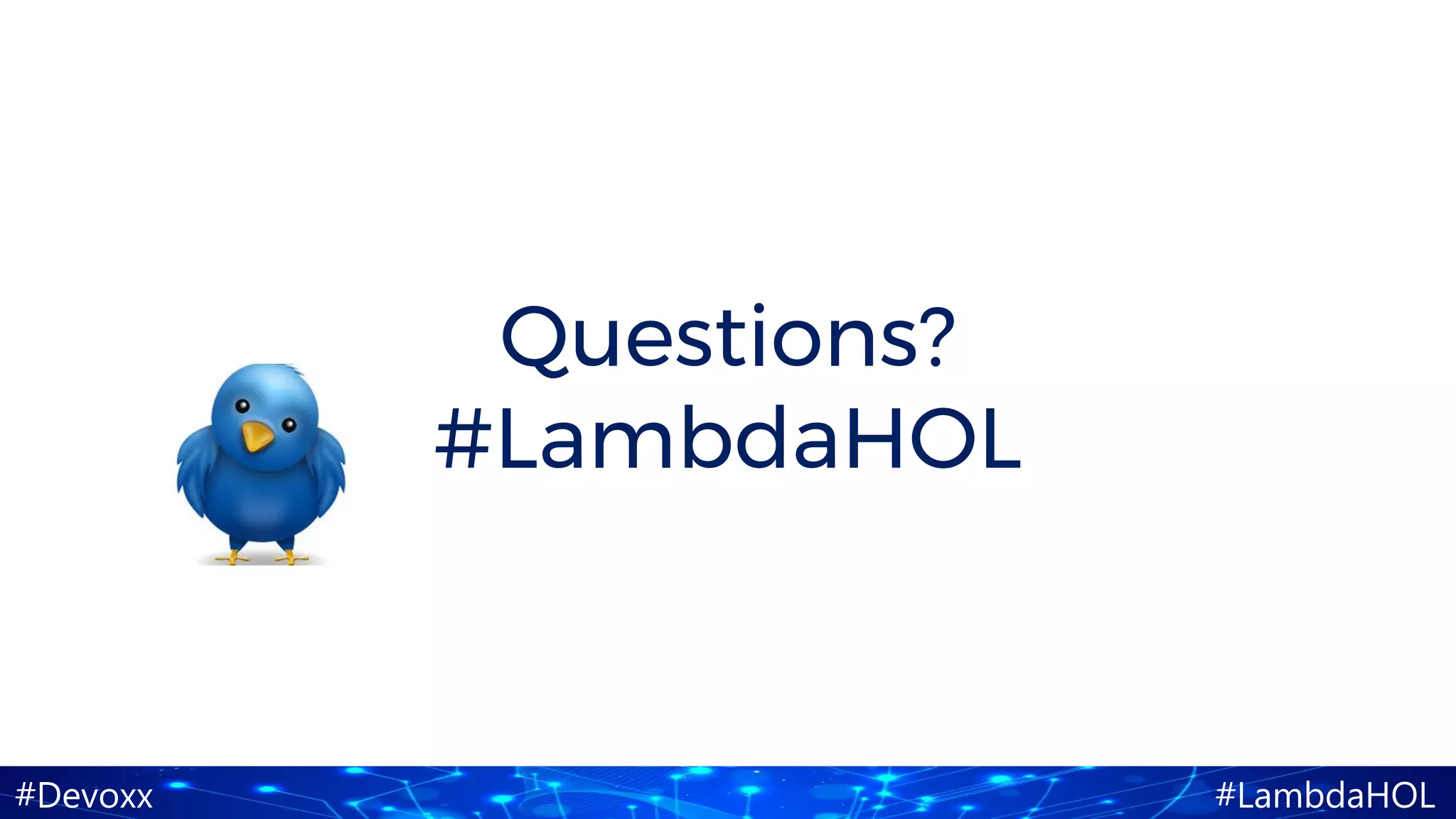
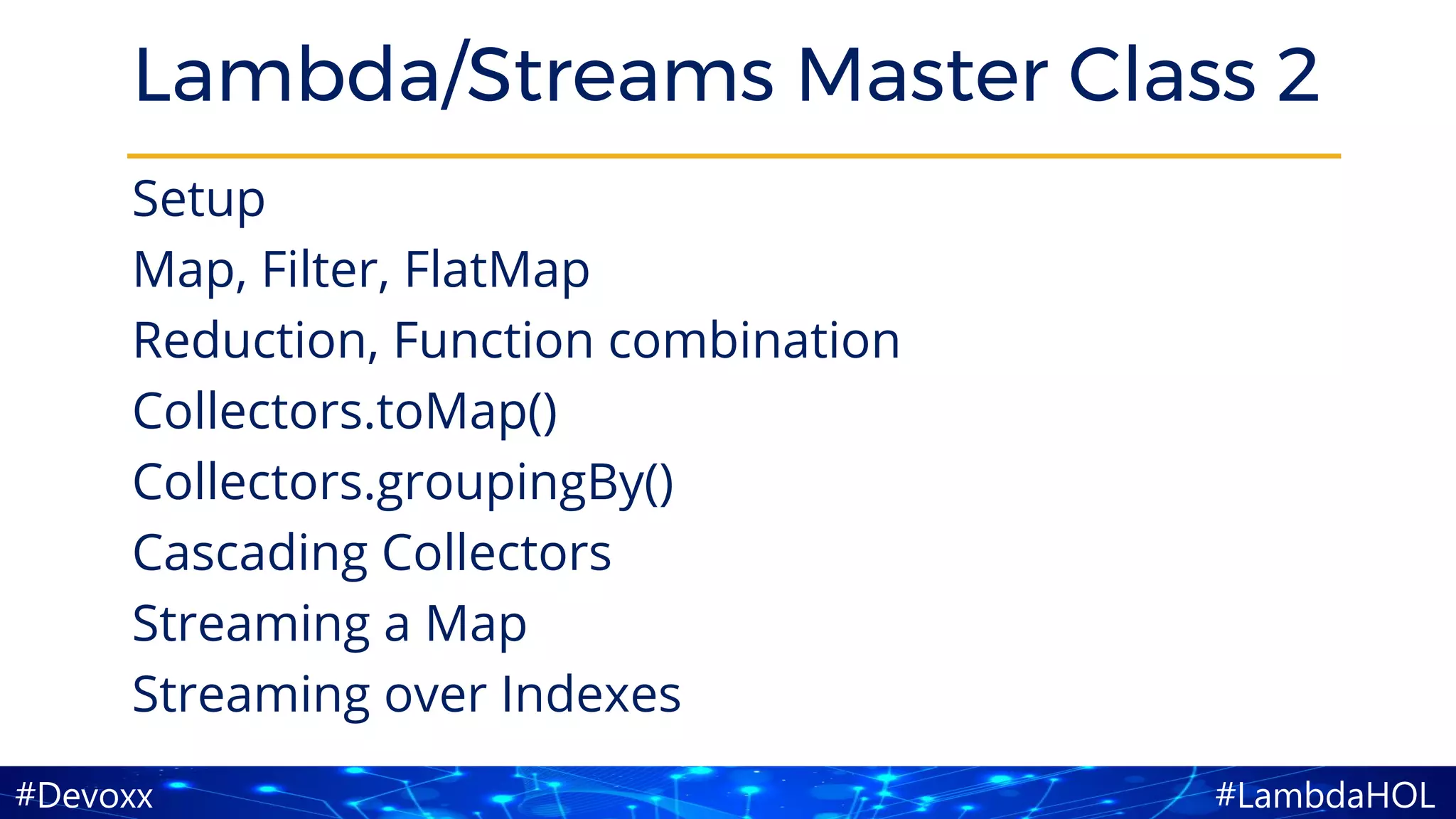
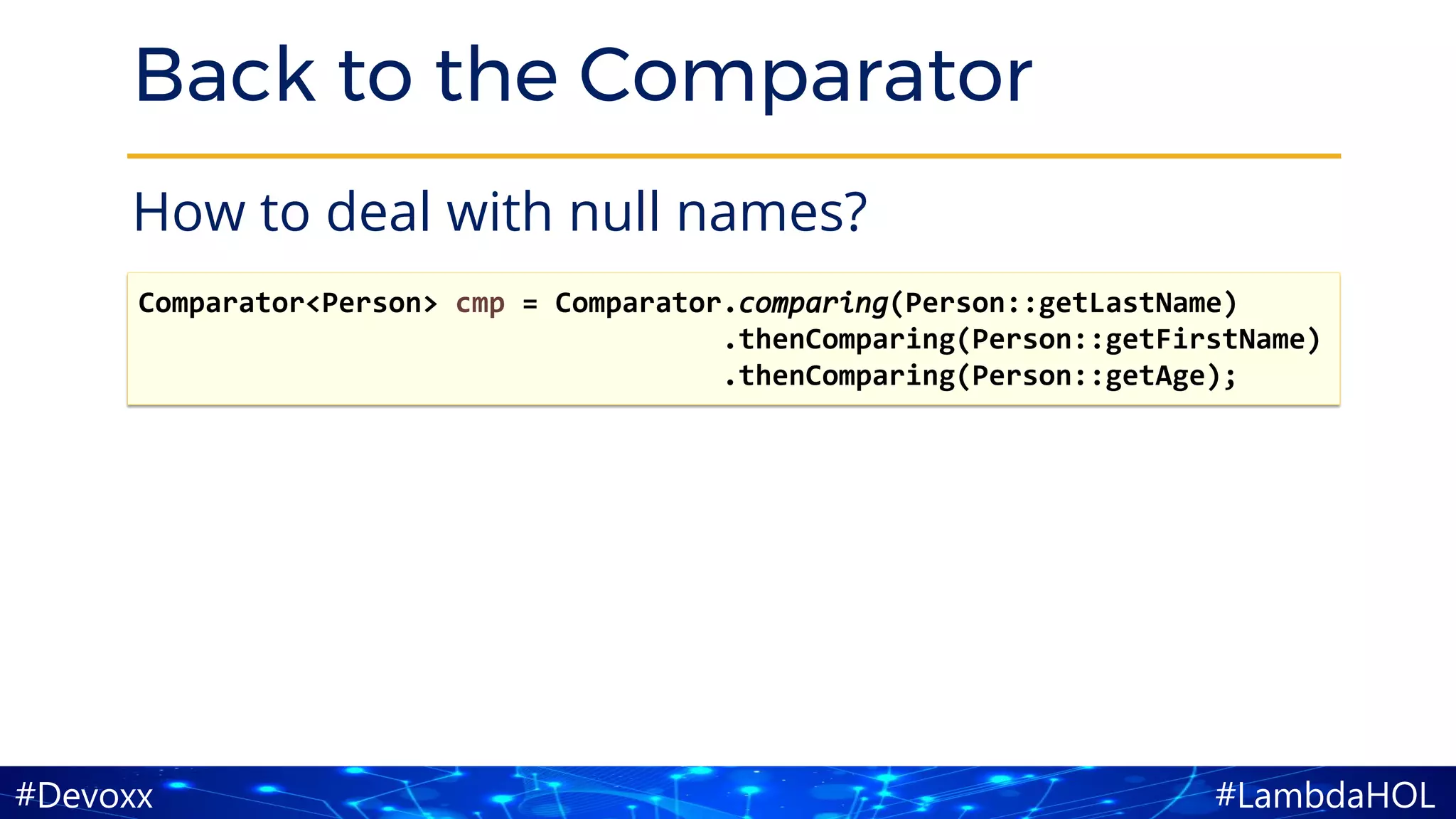
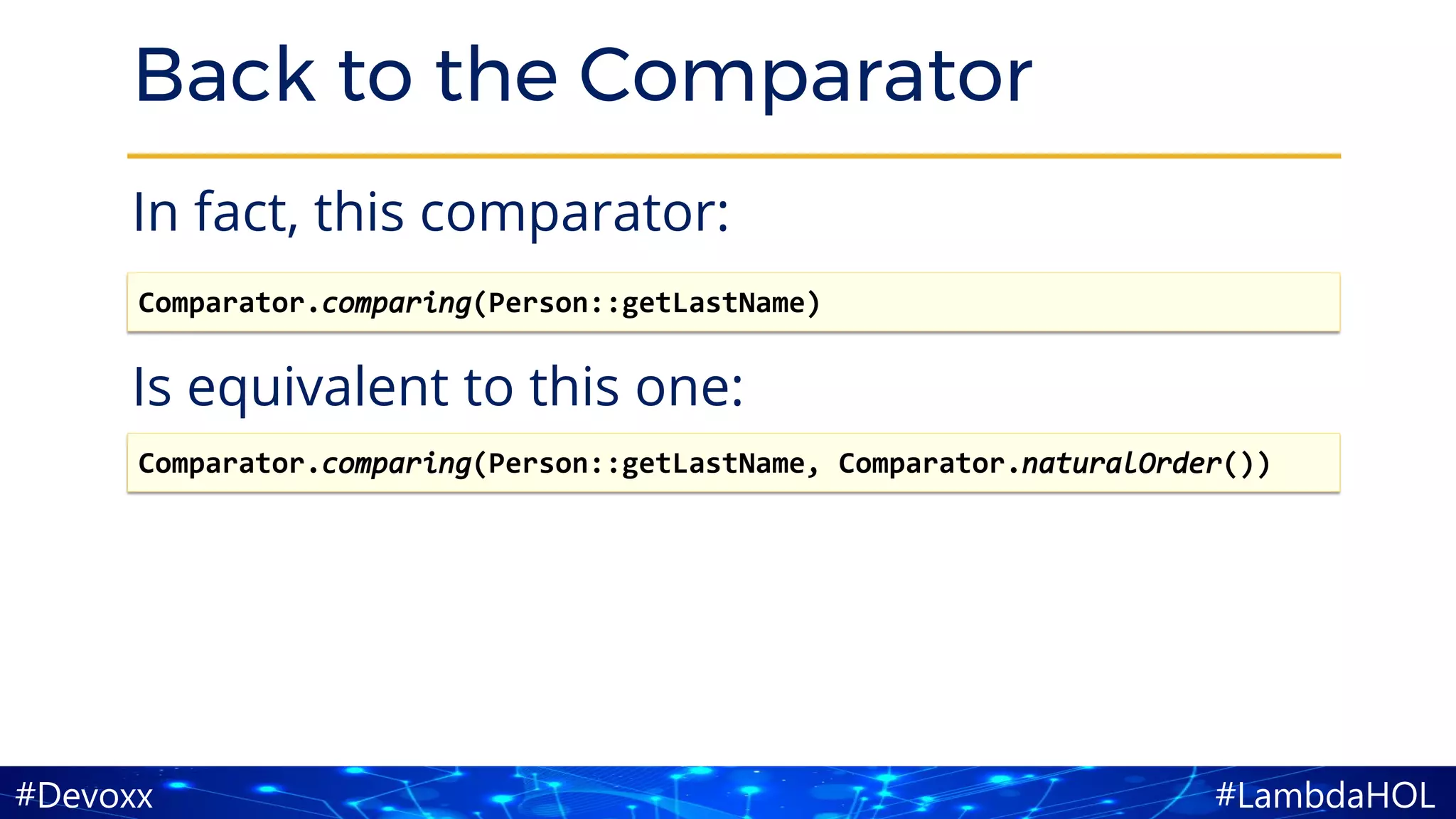
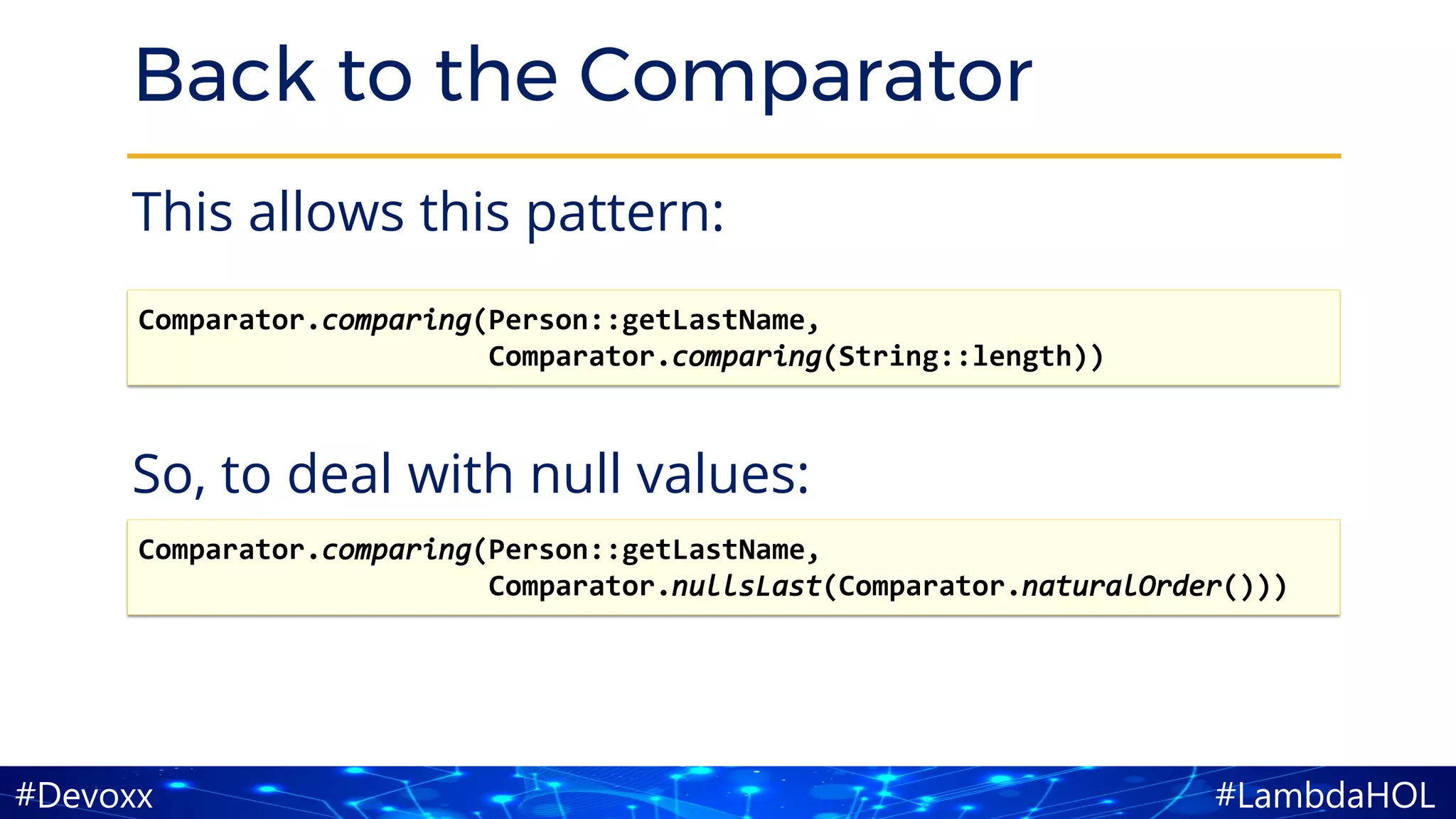
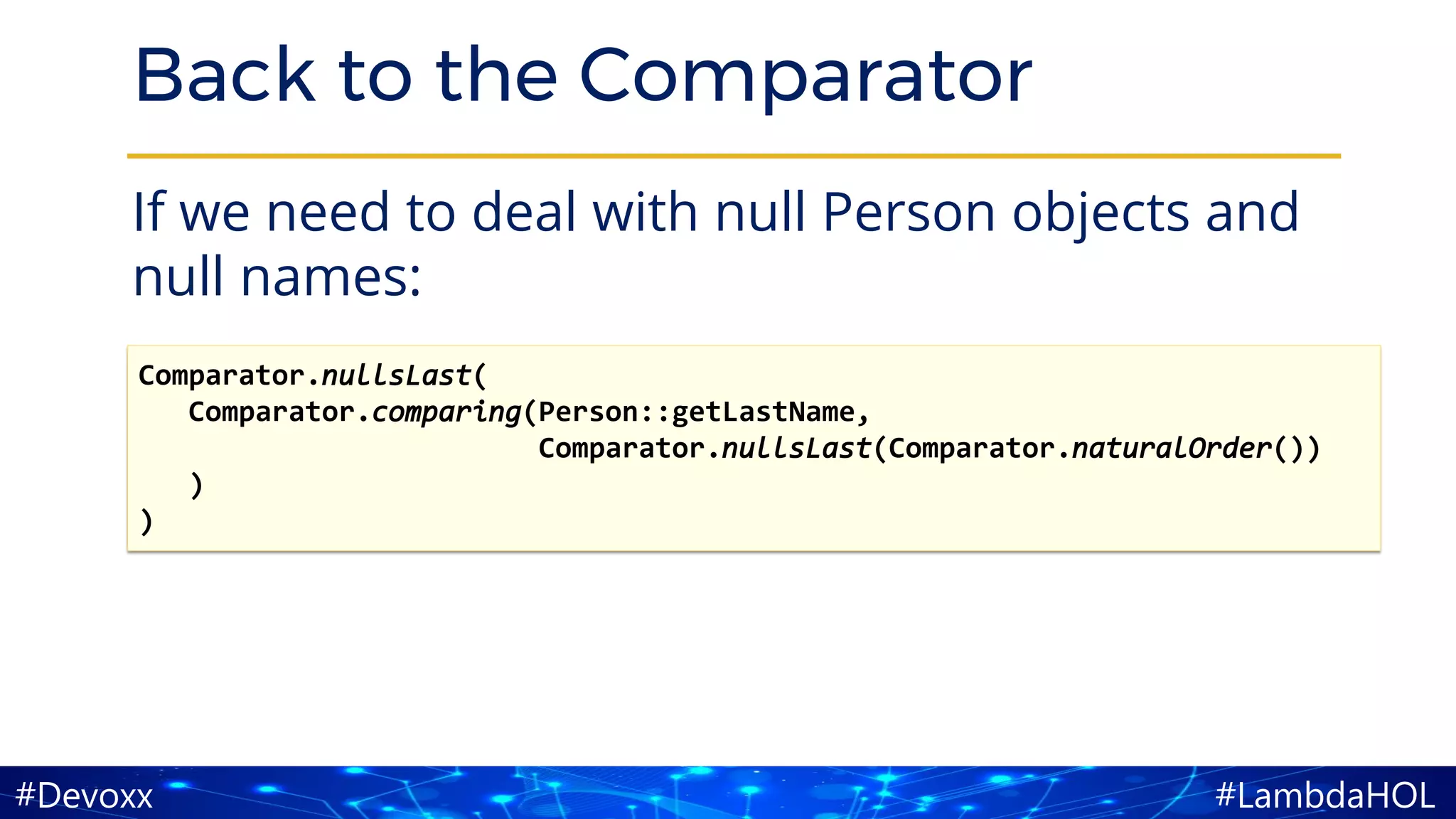
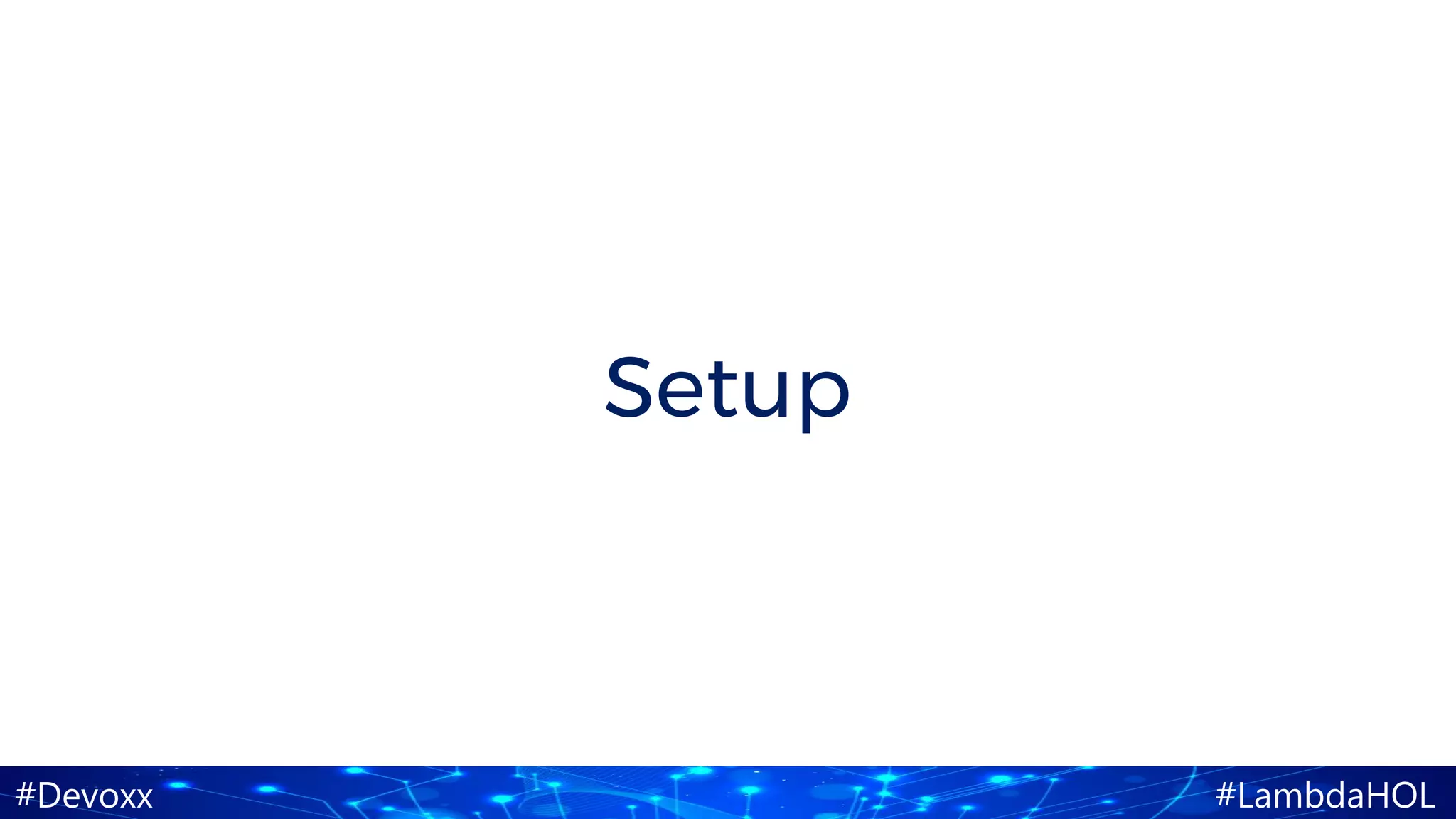
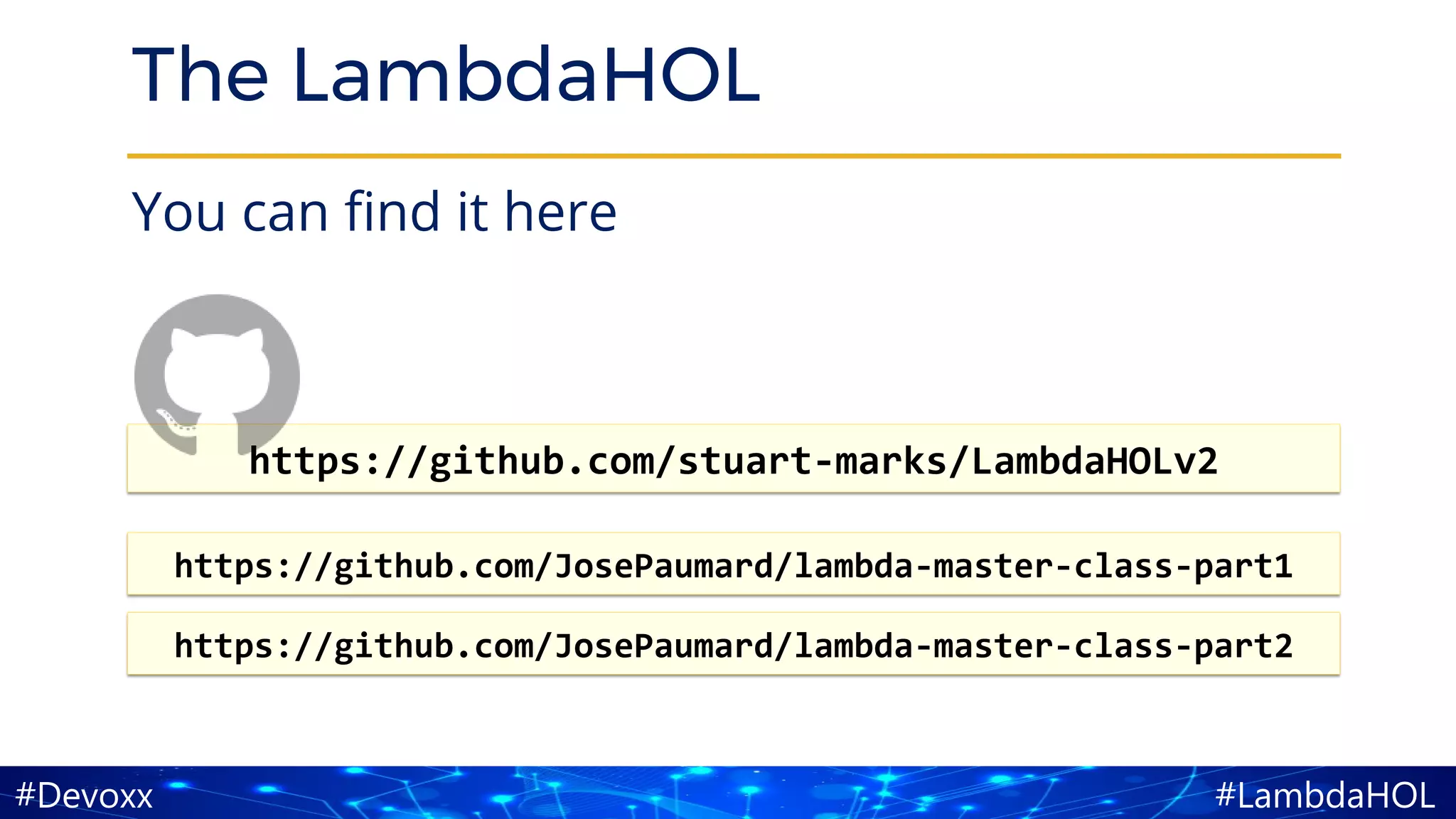
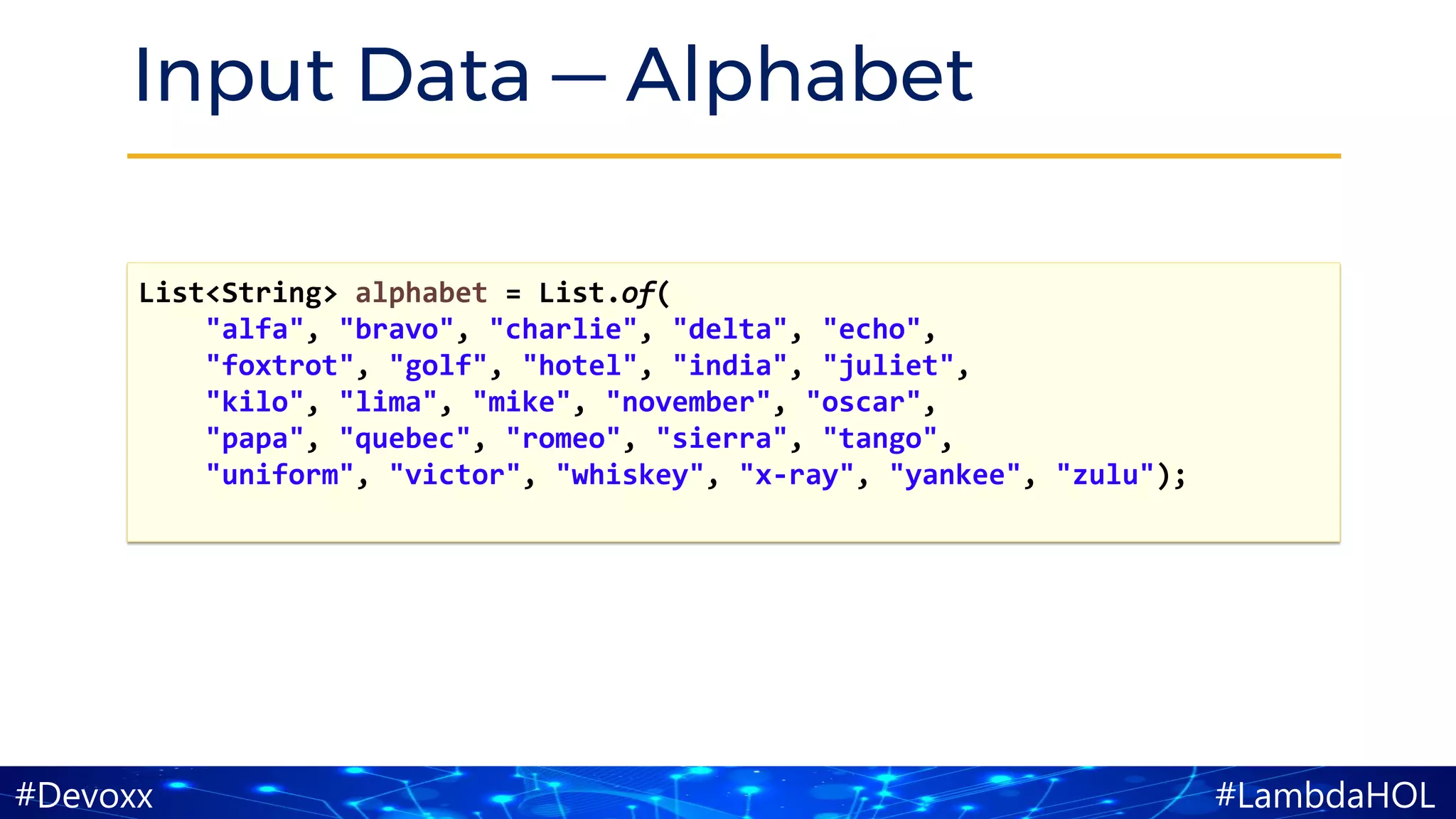
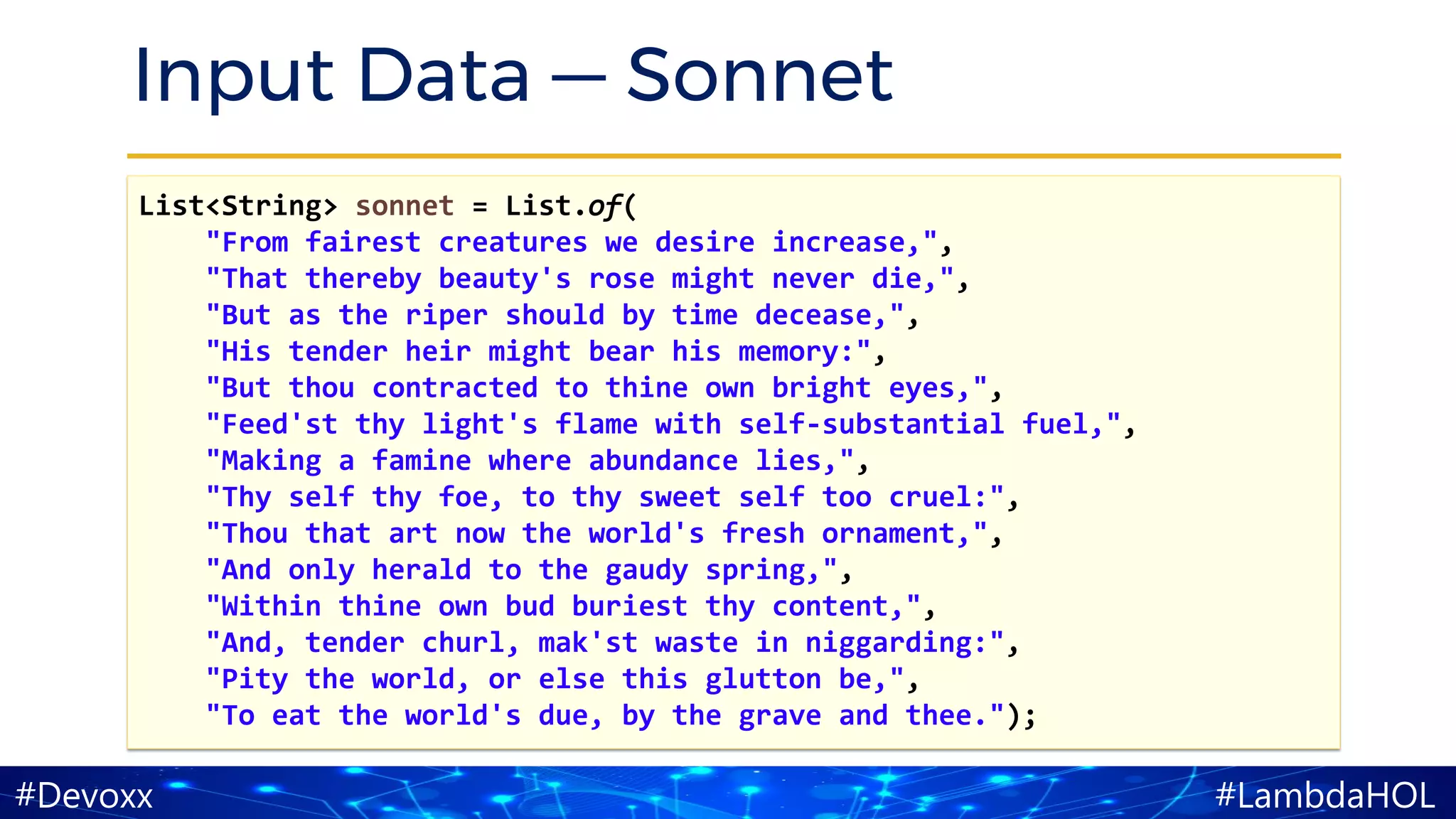
![#LambdaHOL#Devoxx
Helper Method — expand()
expand("abc") ⇒ ["a", "b", "c"]
List<String> expand(String s) {
return s.codePoints()
.mapToObj(Character::toString)
.collect(toList());
}](https://image.slidesharecdn.com/devoxxbe-2018-part02-181114210036/75/Lambdas-and-Streams-Master-Class-Part-2-14-2048.jpg)
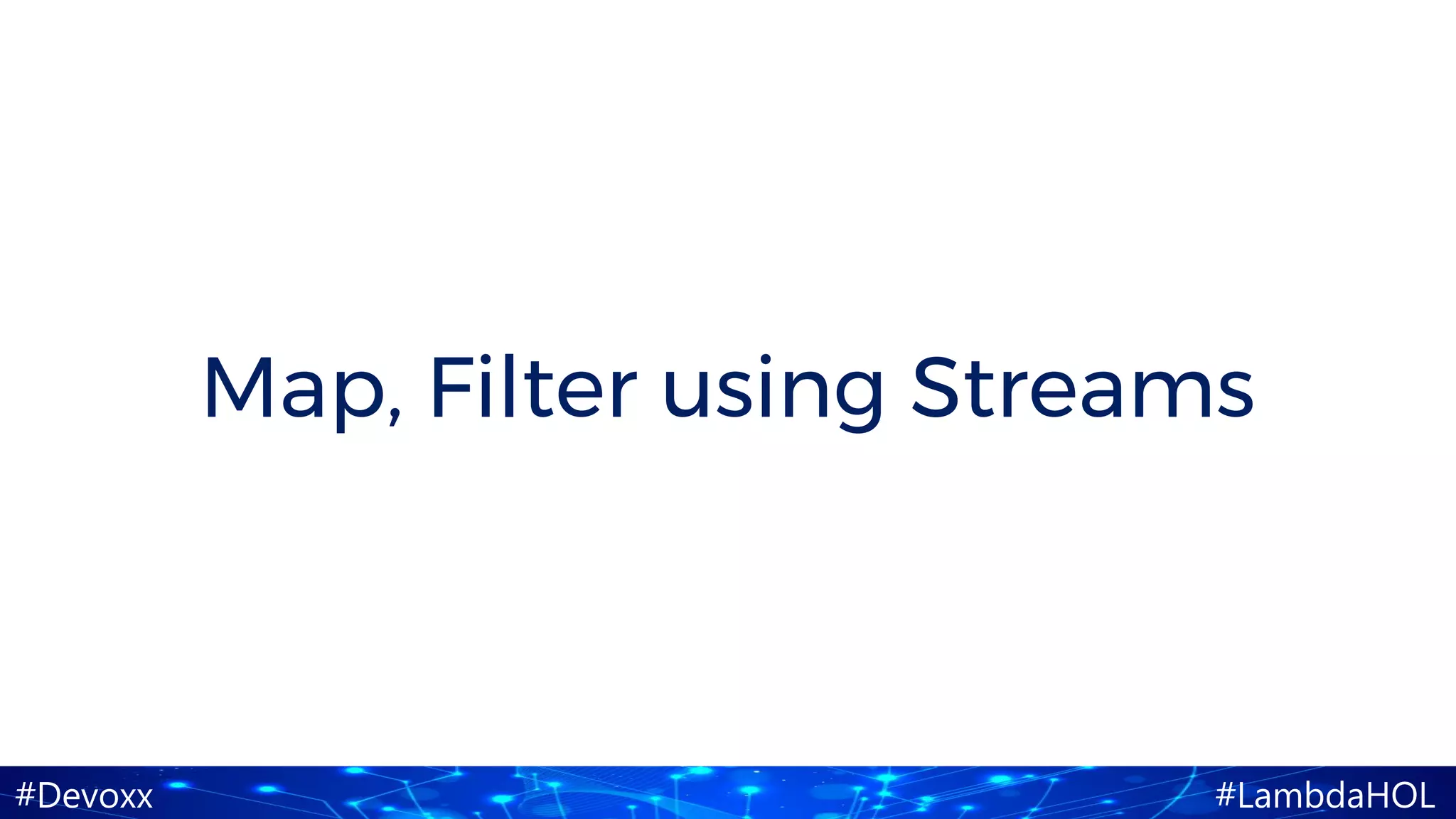
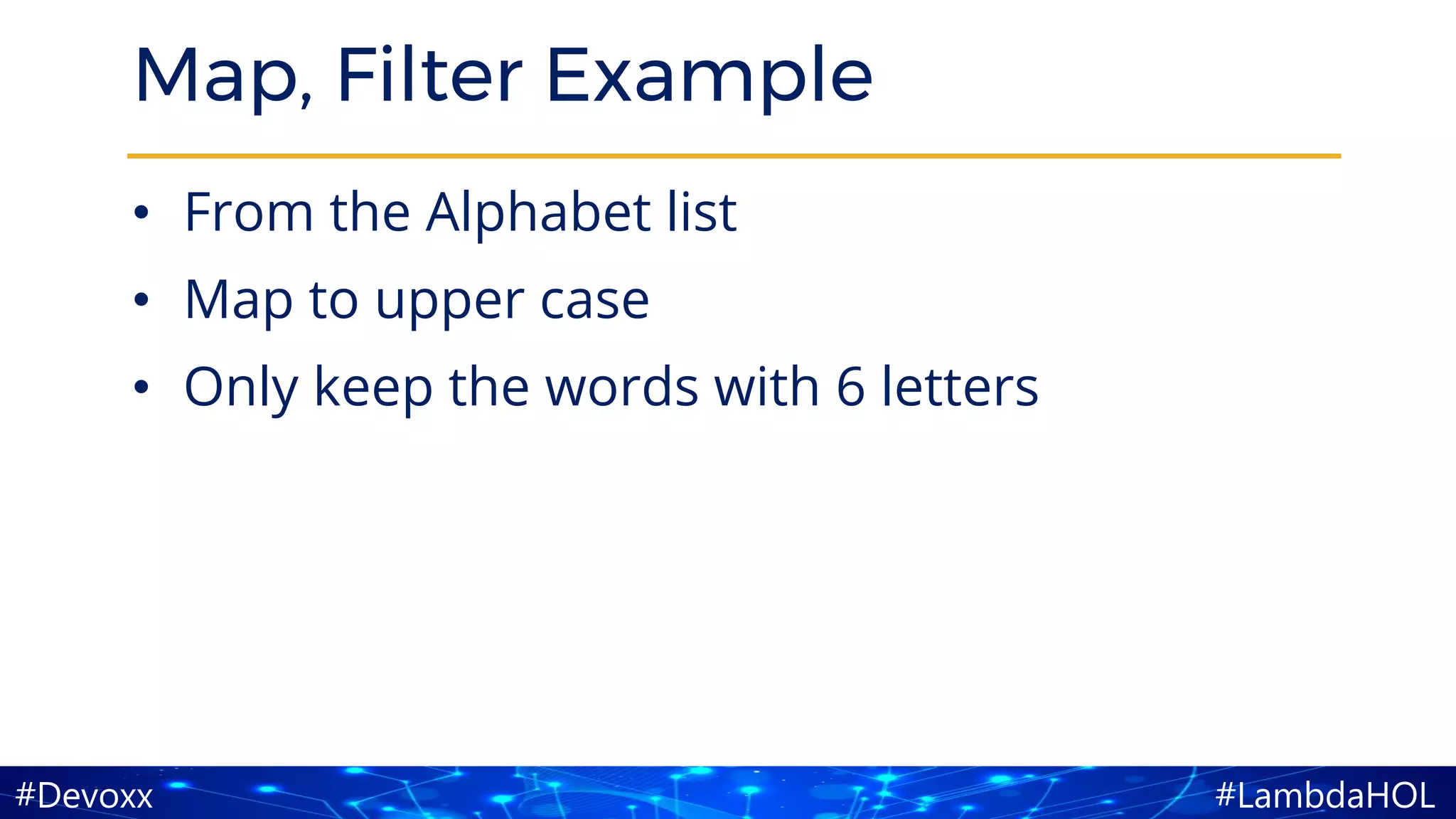
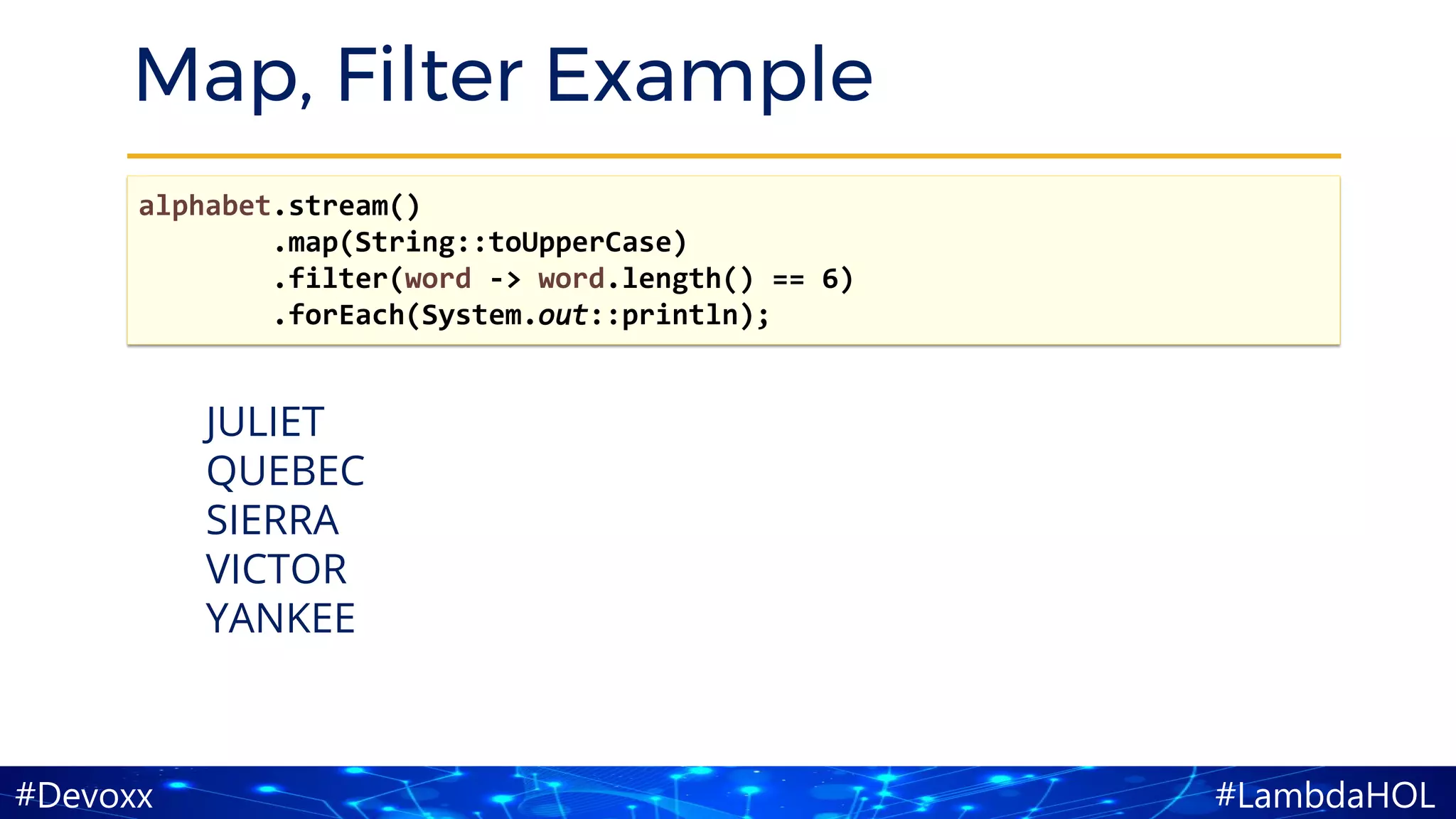
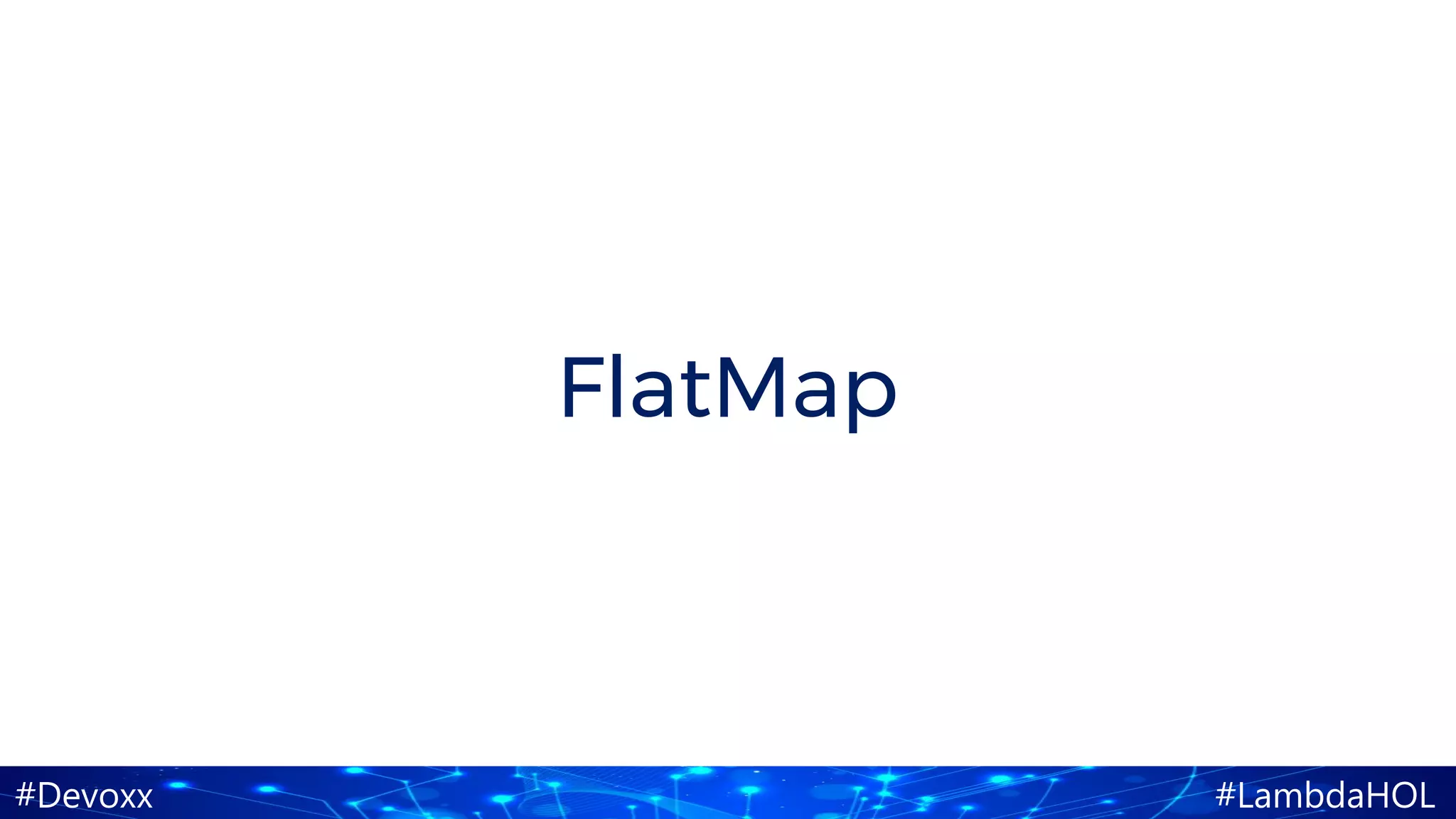
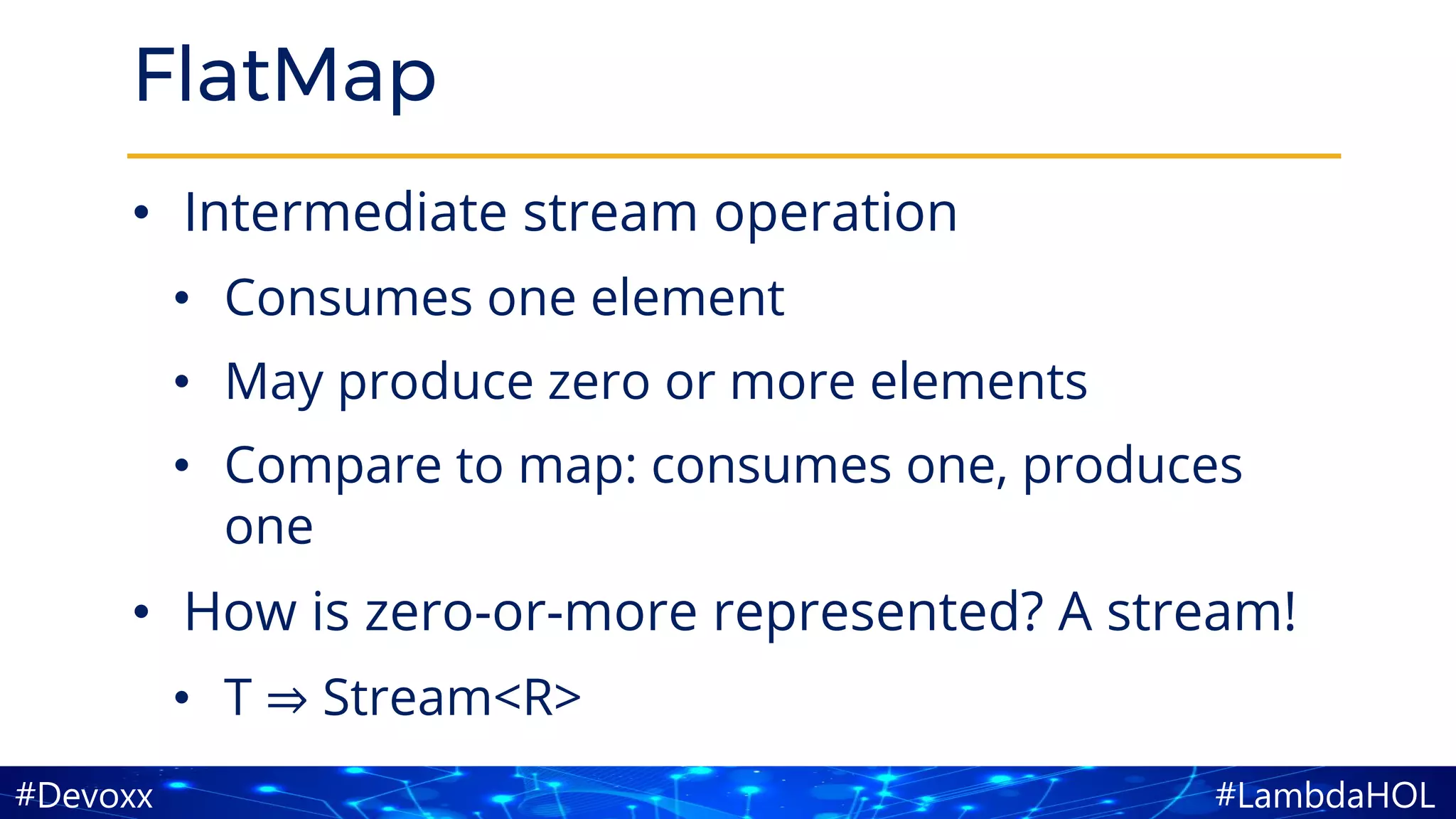
![#LambdaHOL#Devoxx
FlatMap
Given a list of strings...
[alfa, bravo, charlie, ...]
expand each string to a list of one-letter strings
[ [a, l, f, a], [b, r, a, v, o], [c, h, ...] ... ]
but «flatten» the nesting structure
[a, l, f, a, b, r, a, v, o, c, h, ...]](https://image.slidesharecdn.com/devoxxbe-2018-part02-181114210036/75/Lambdas-and-Streams-Master-Class-Part-2-20-2048.jpg)
![#LambdaHOL#Devoxx
FlatMap
[[a, l, f, a], [b, r, a, v, o], [c, h, ...] ...]
List<List<String>> flatMap1() {
return alphabet.stream()
.map(word -> expand(word))
.collect(toList());
}](https://image.slidesharecdn.com/devoxxbe-2018-part02-181114210036/75/Lambdas-and-Streams-Master-Class-Part-2-21-2048.jpg)
![#LambdaHOL#Devoxx
FlatMap
[a, l, f, a, b, r, a, v, o, c, h, a, r, l, i, e, d, e, l, ...]
List<String> flatMap2() {
return alphabet.stream()
.flatMap(word -> expand(word).stream())
.collect(toList());
}](https://image.slidesharecdn.com/devoxxbe-2018-part02-181114210036/75/Lambdas-and-Streams-Master-Class-Part-2-22-2048.jpg)
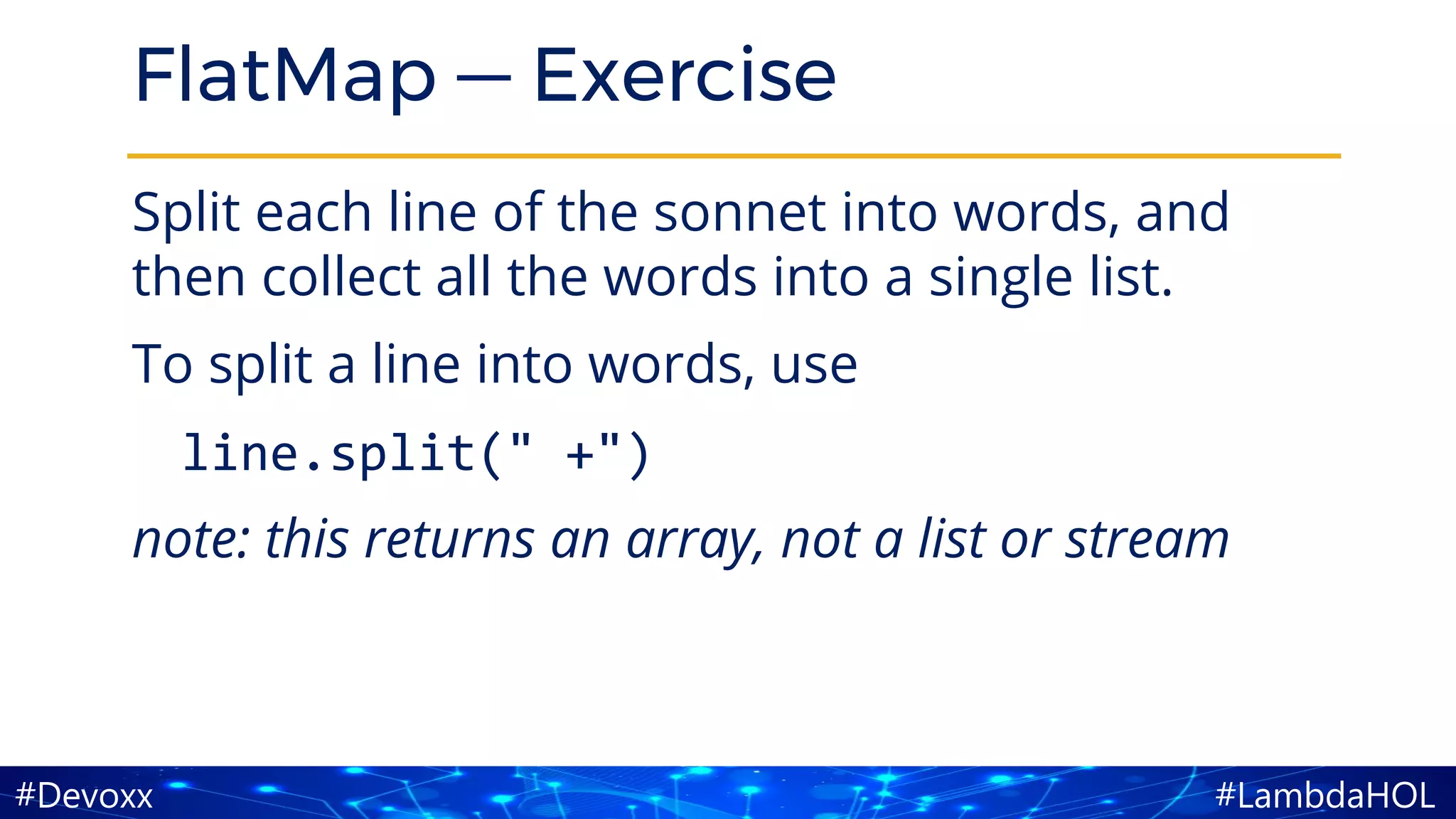
![#LambdaHOL#Devoxx
FlatMap — Solution
Split each line of the sonnet into words, and then
collect all the words into a single list.
[From, fairest, creatures, we, desire, increase, ...]
total 106 words
List<String> flatMapSolution() {
return sonnet.stream()
.flatMap(line -> Arrays.stream(line.split(" +")))
.collect(toList());
}](https://image.slidesharecdn.com/devoxxbe-2018-part02-181114210036/75/Lambdas-and-Streams-Master-Class-Part-2-24-2048.jpg)
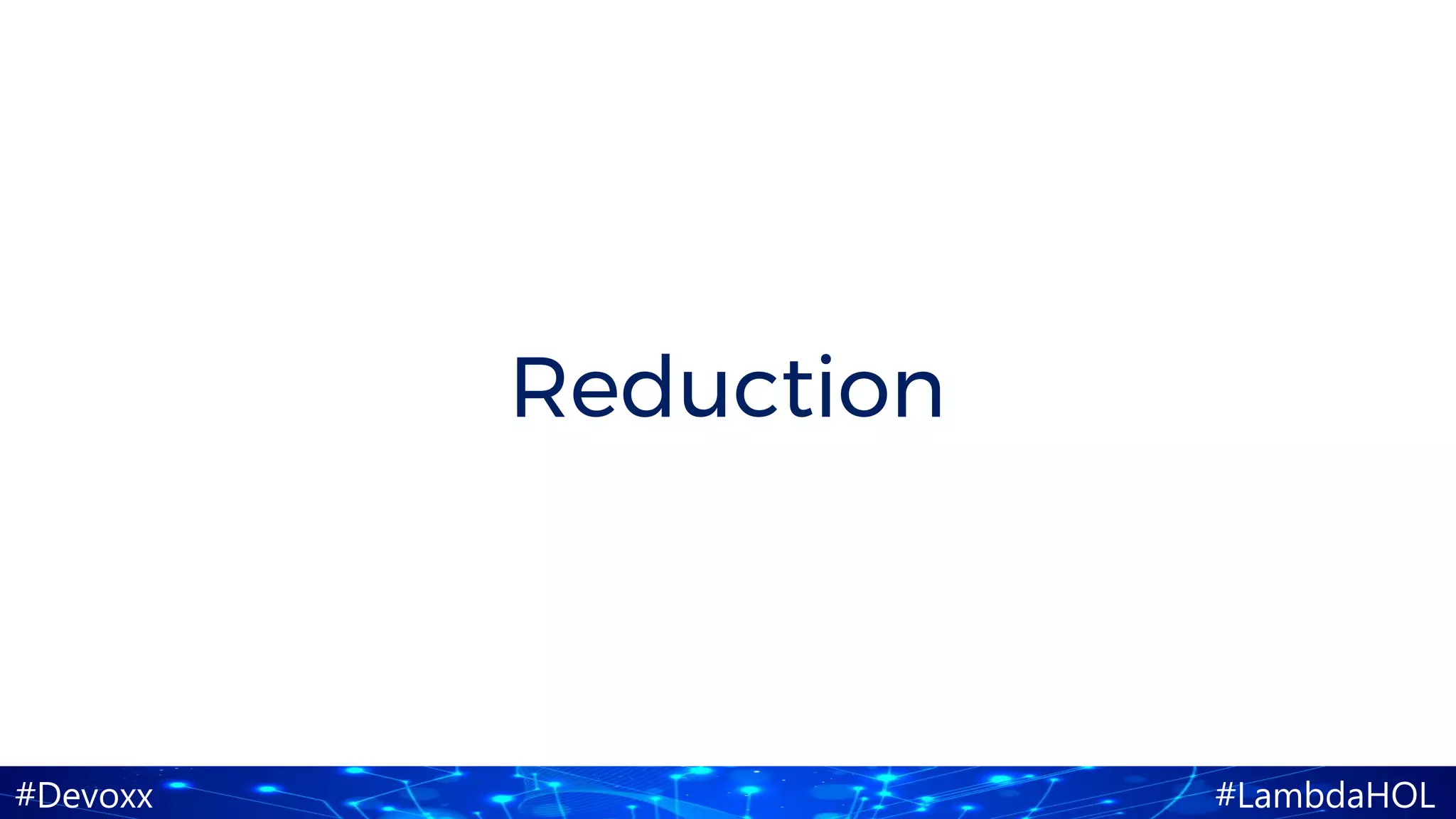
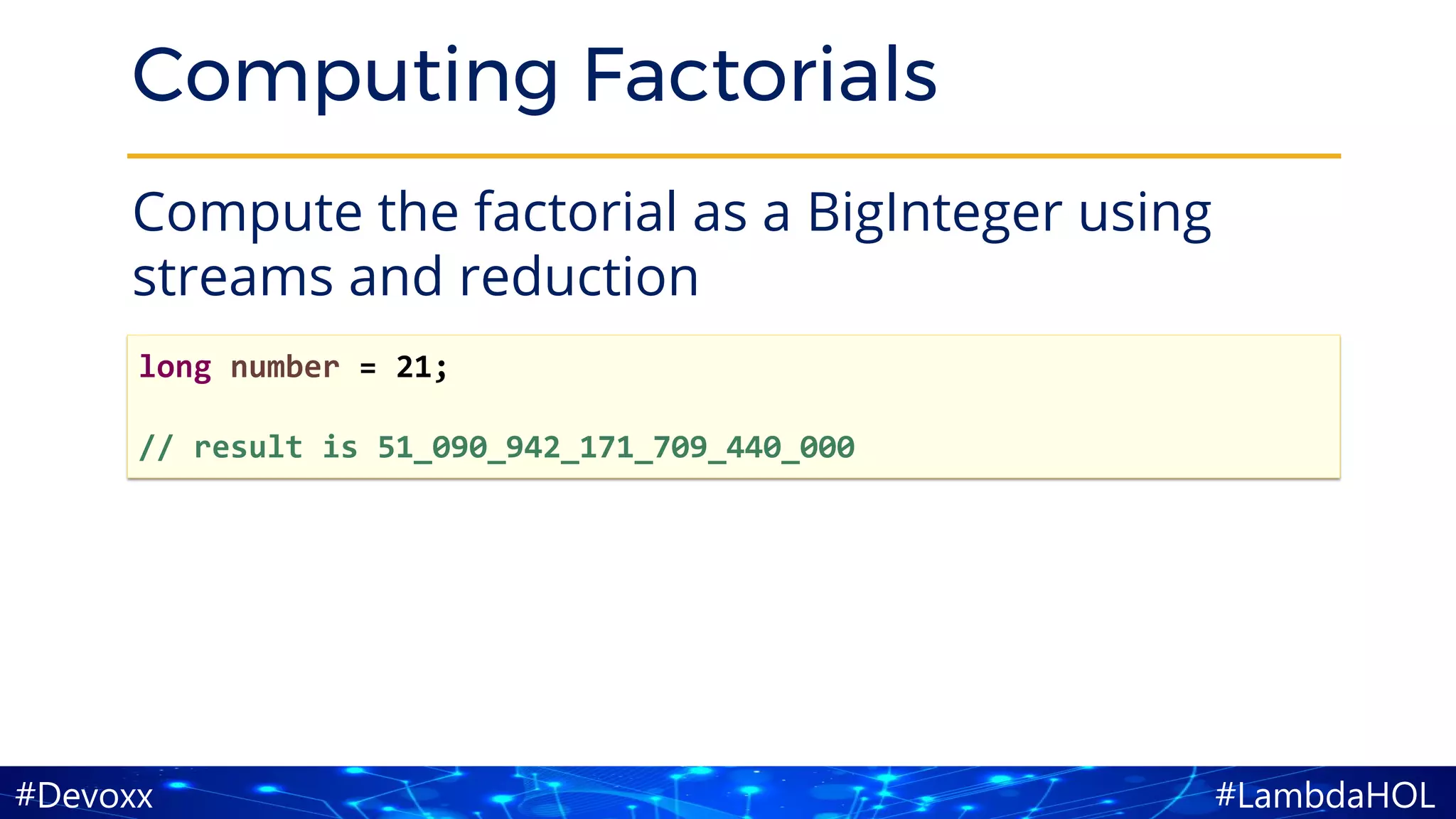
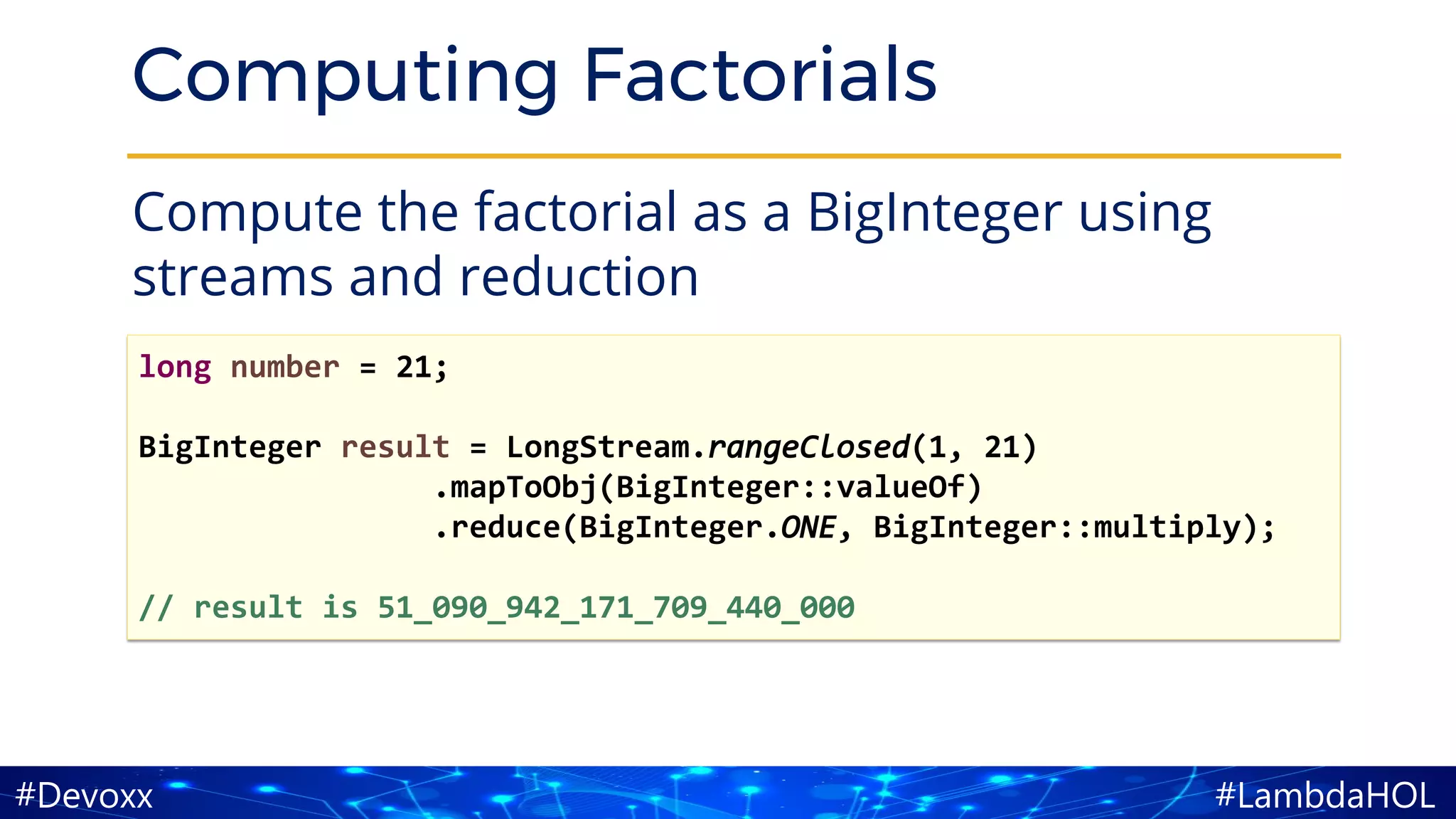
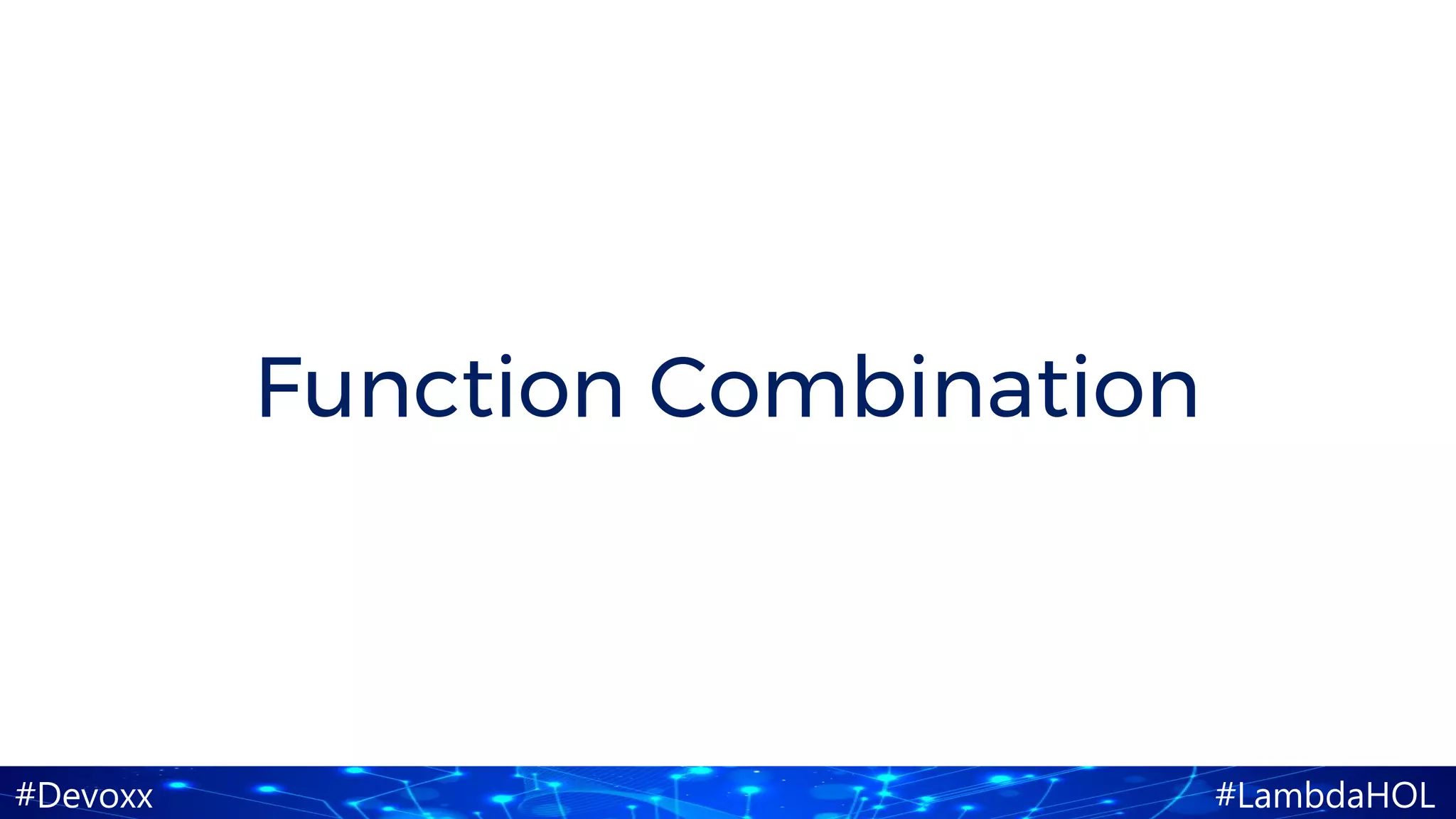
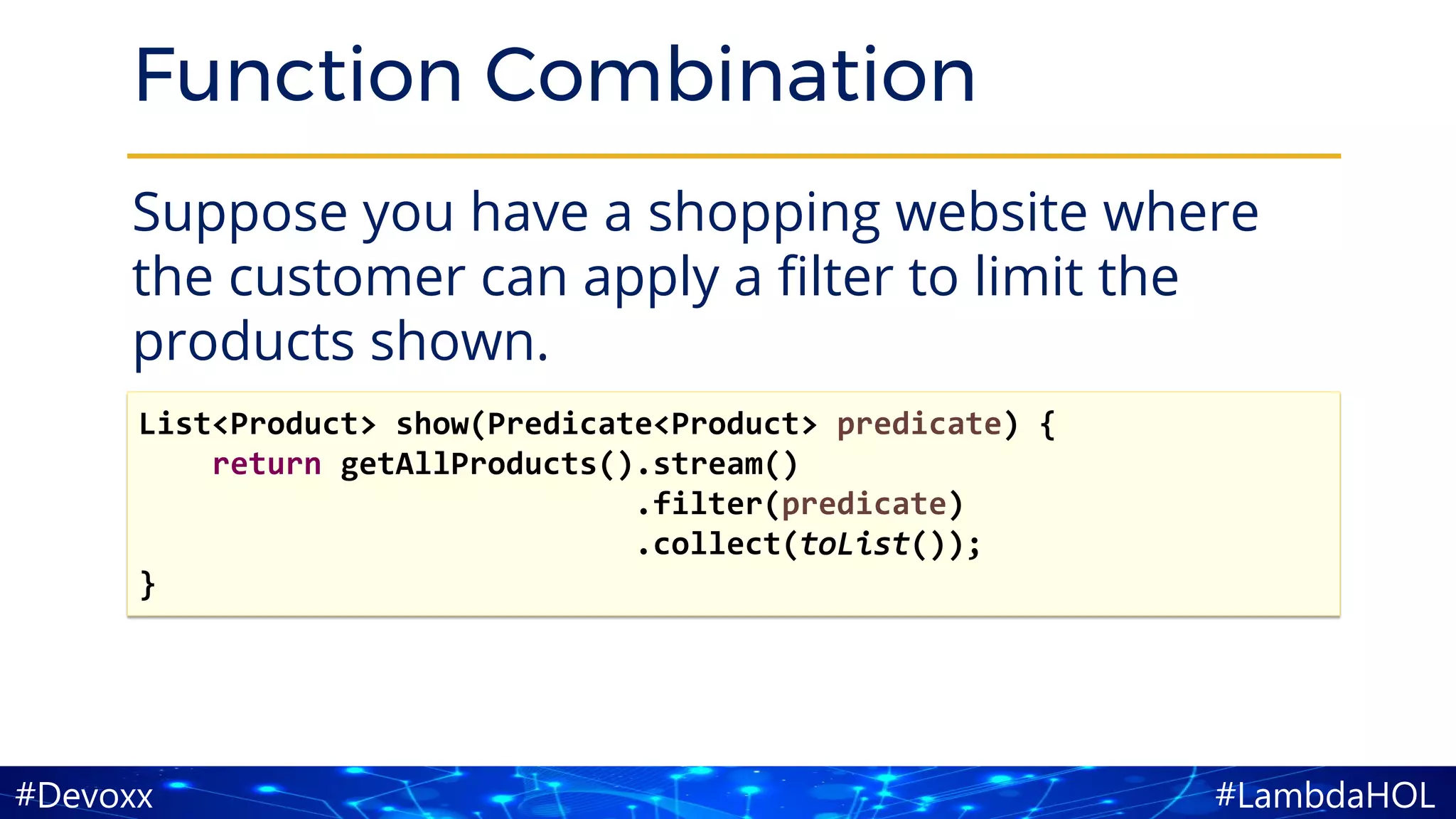
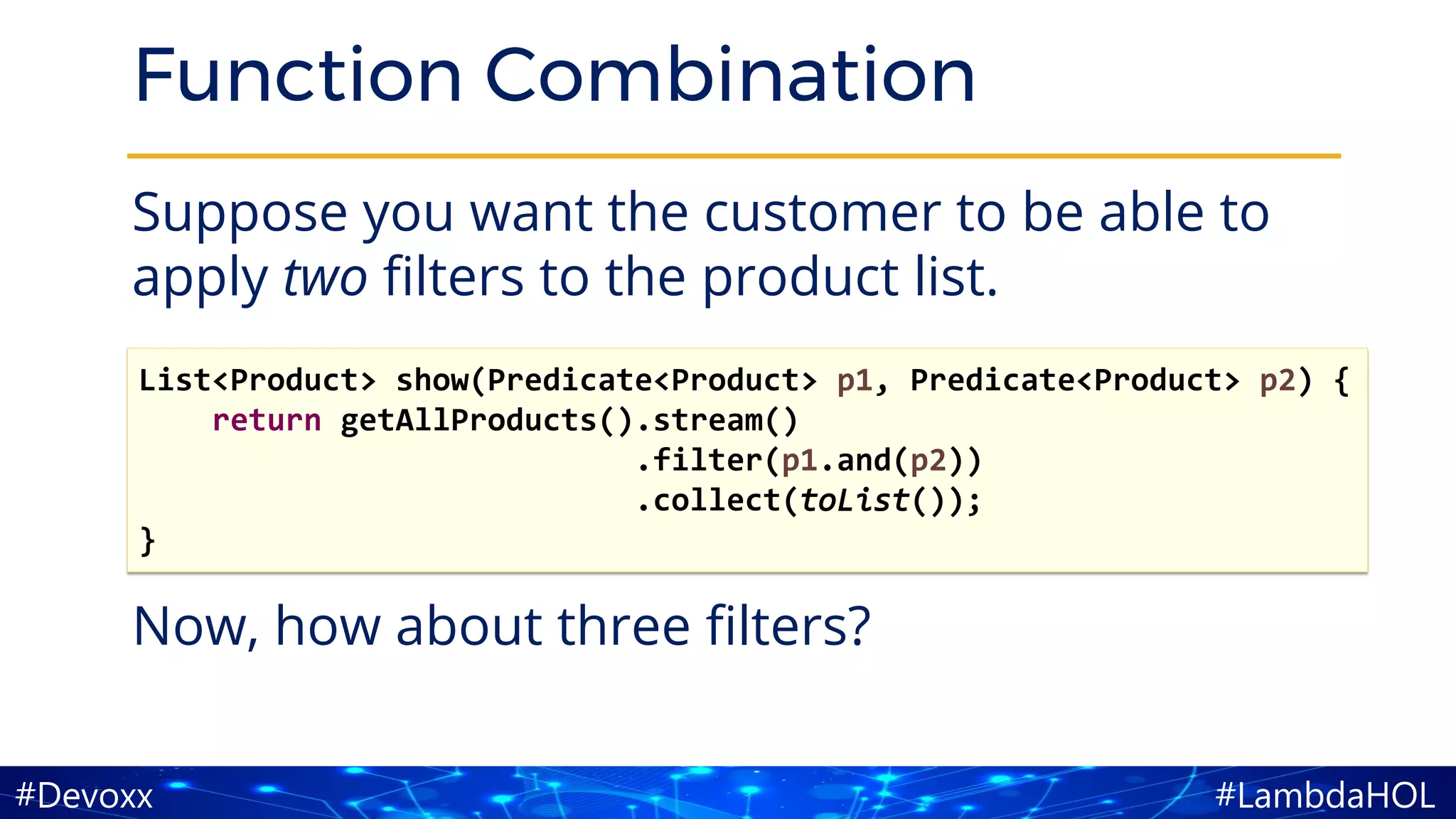
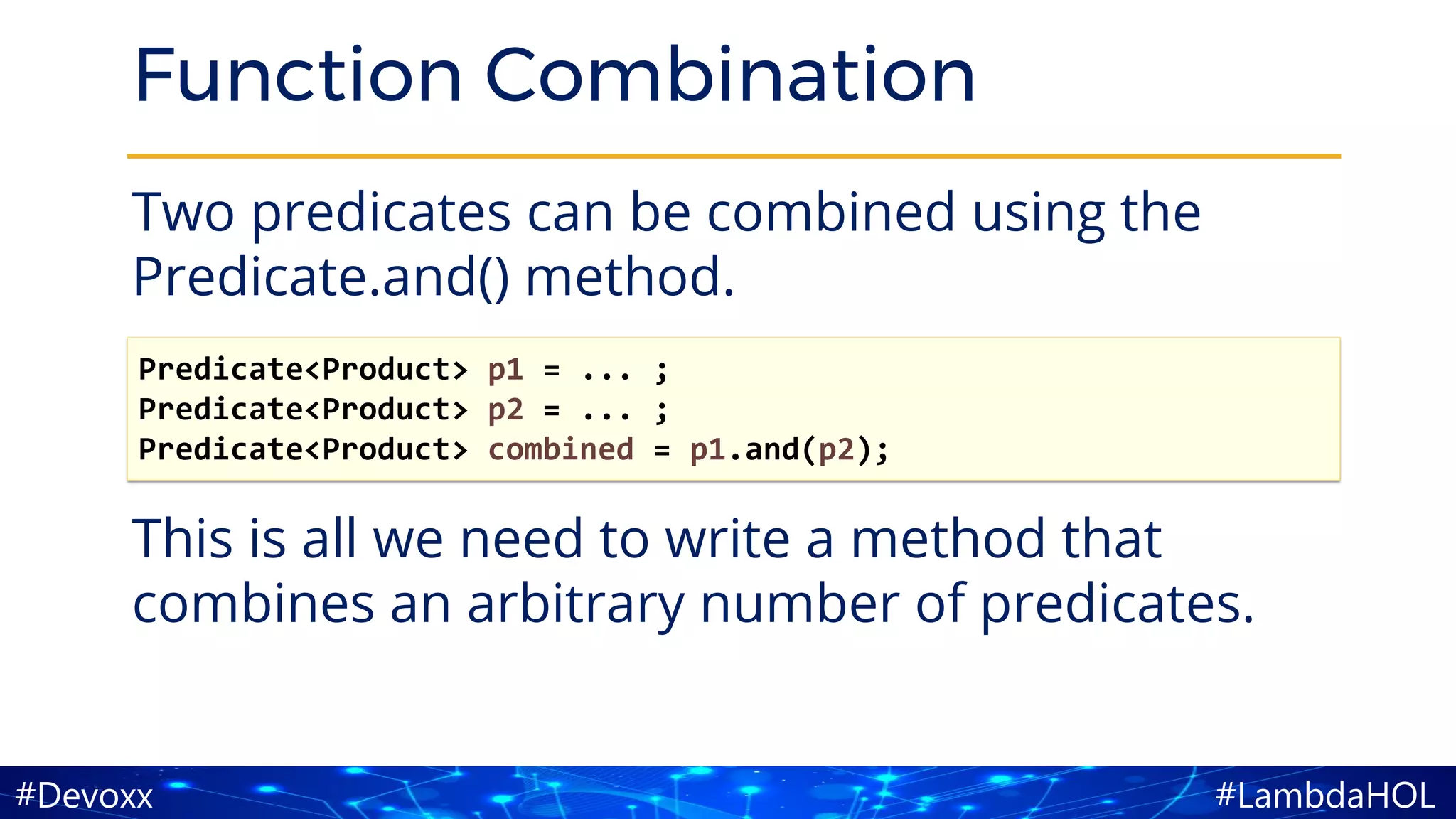
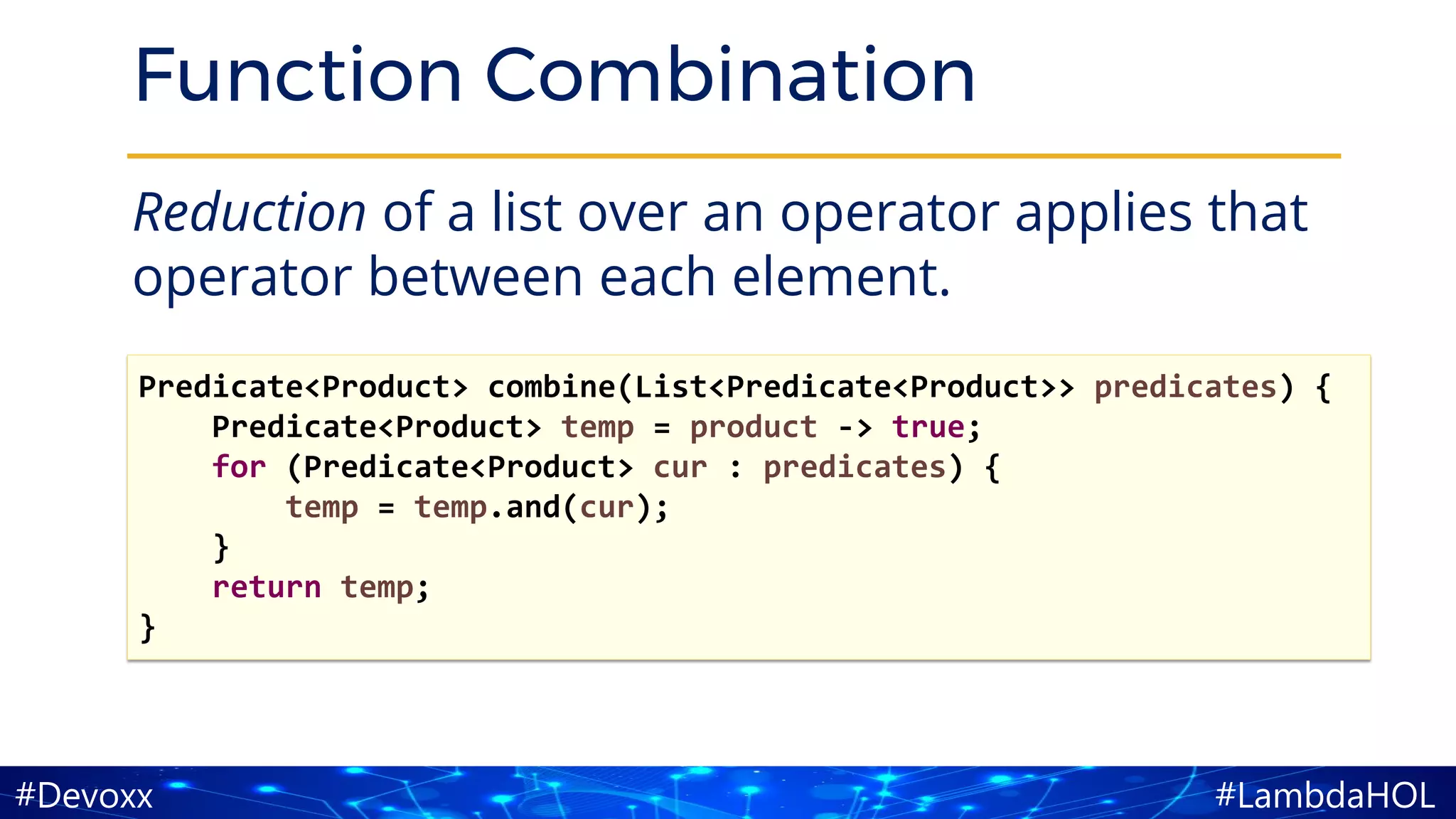
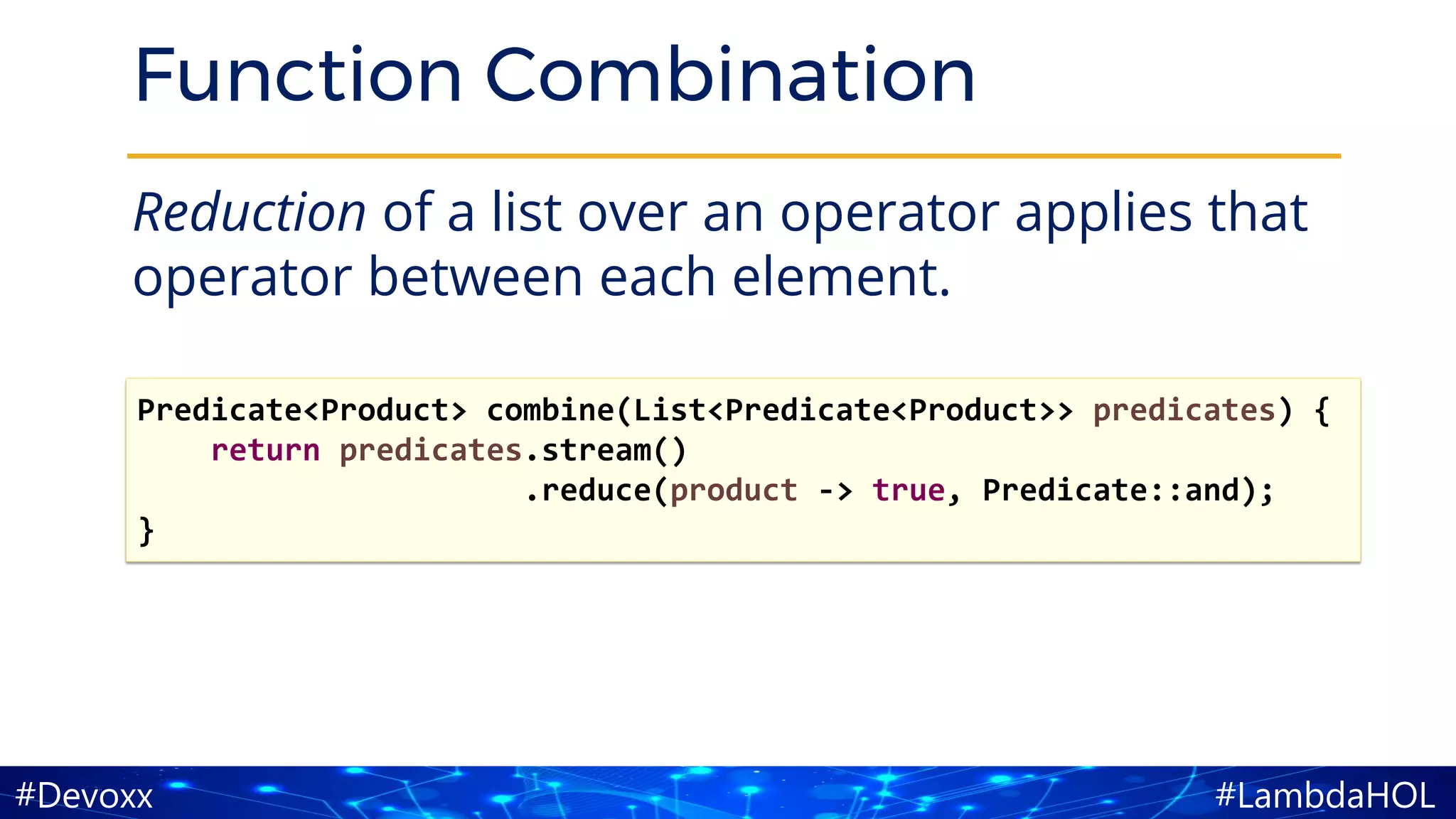
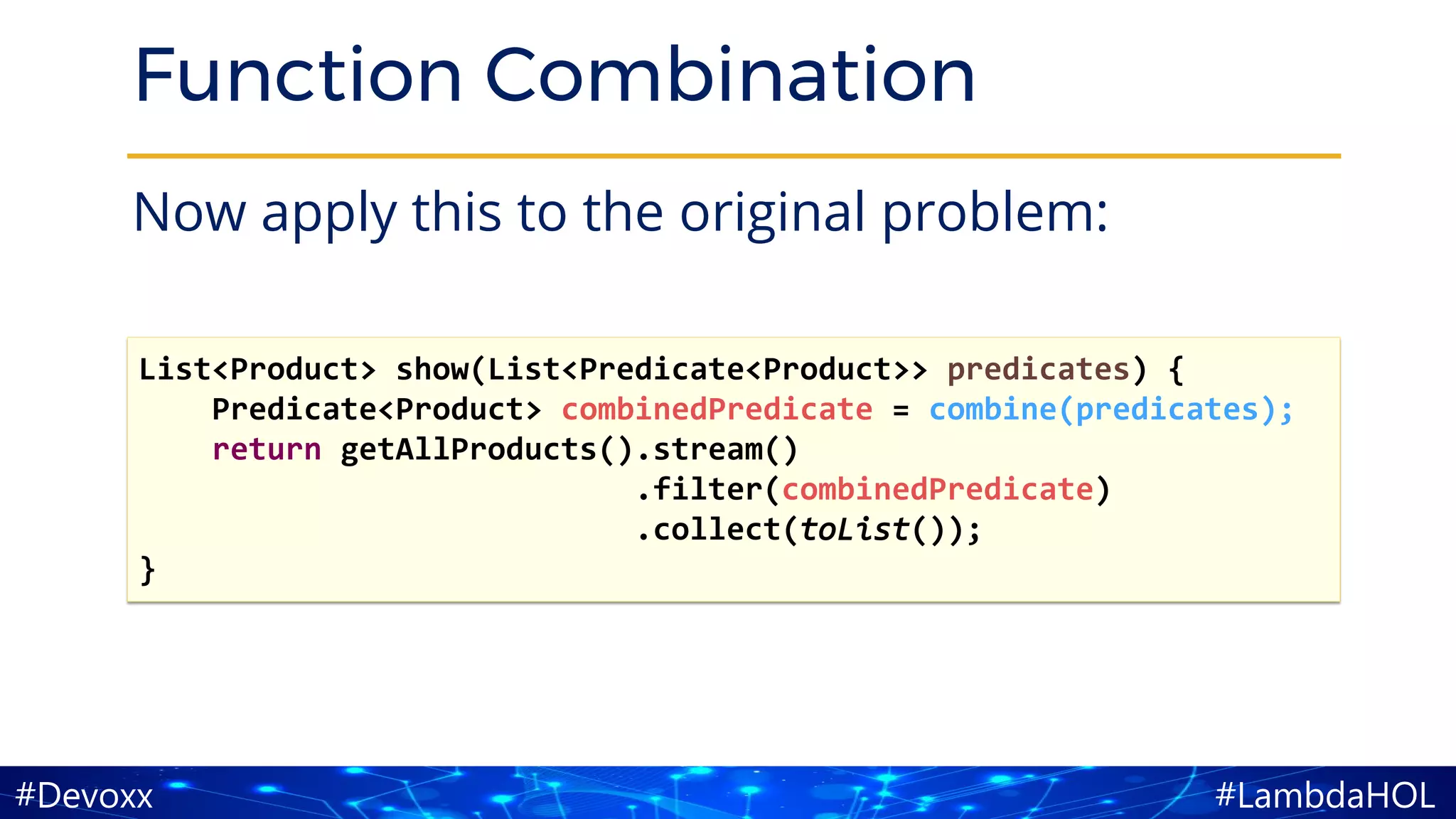
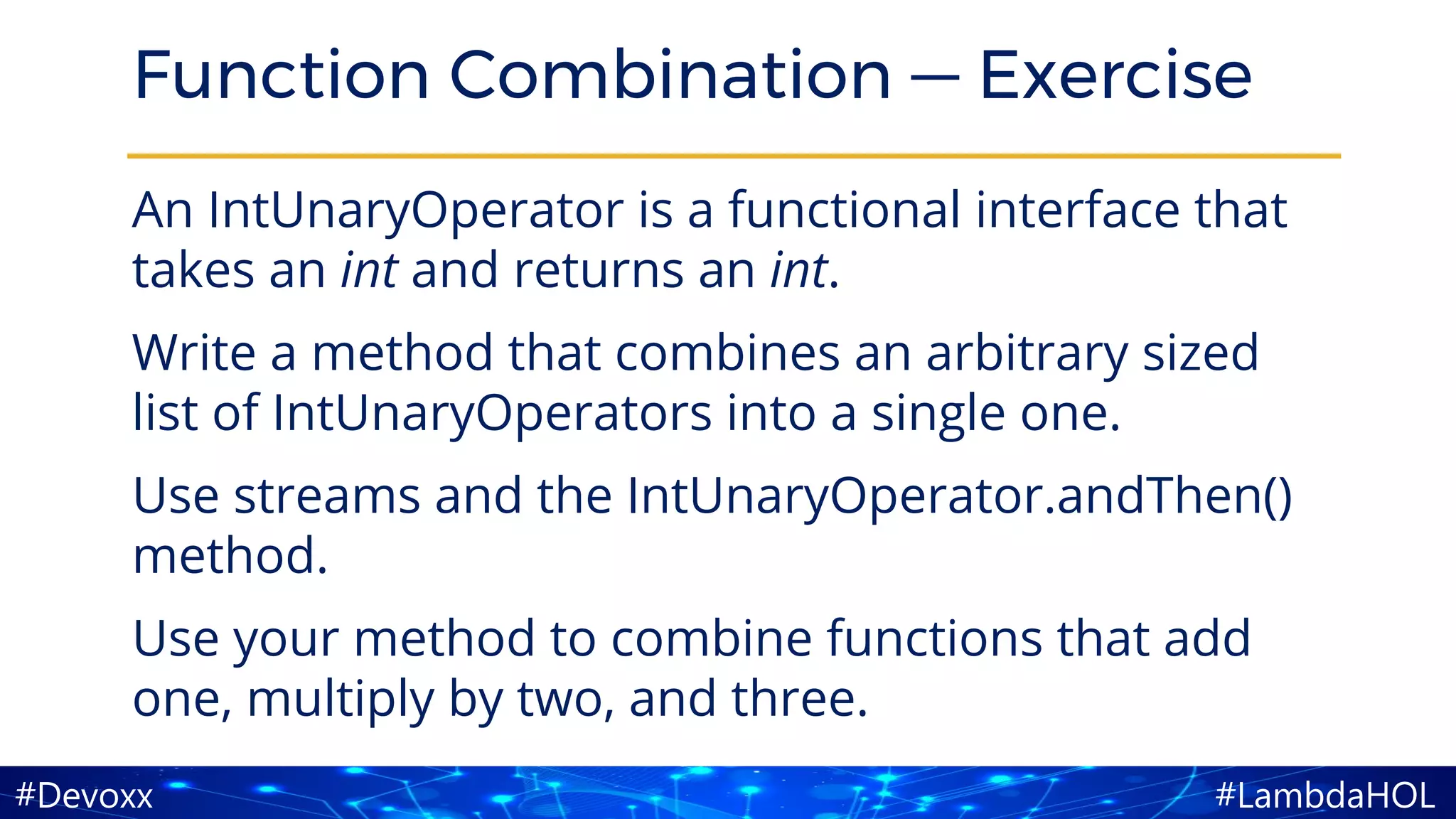
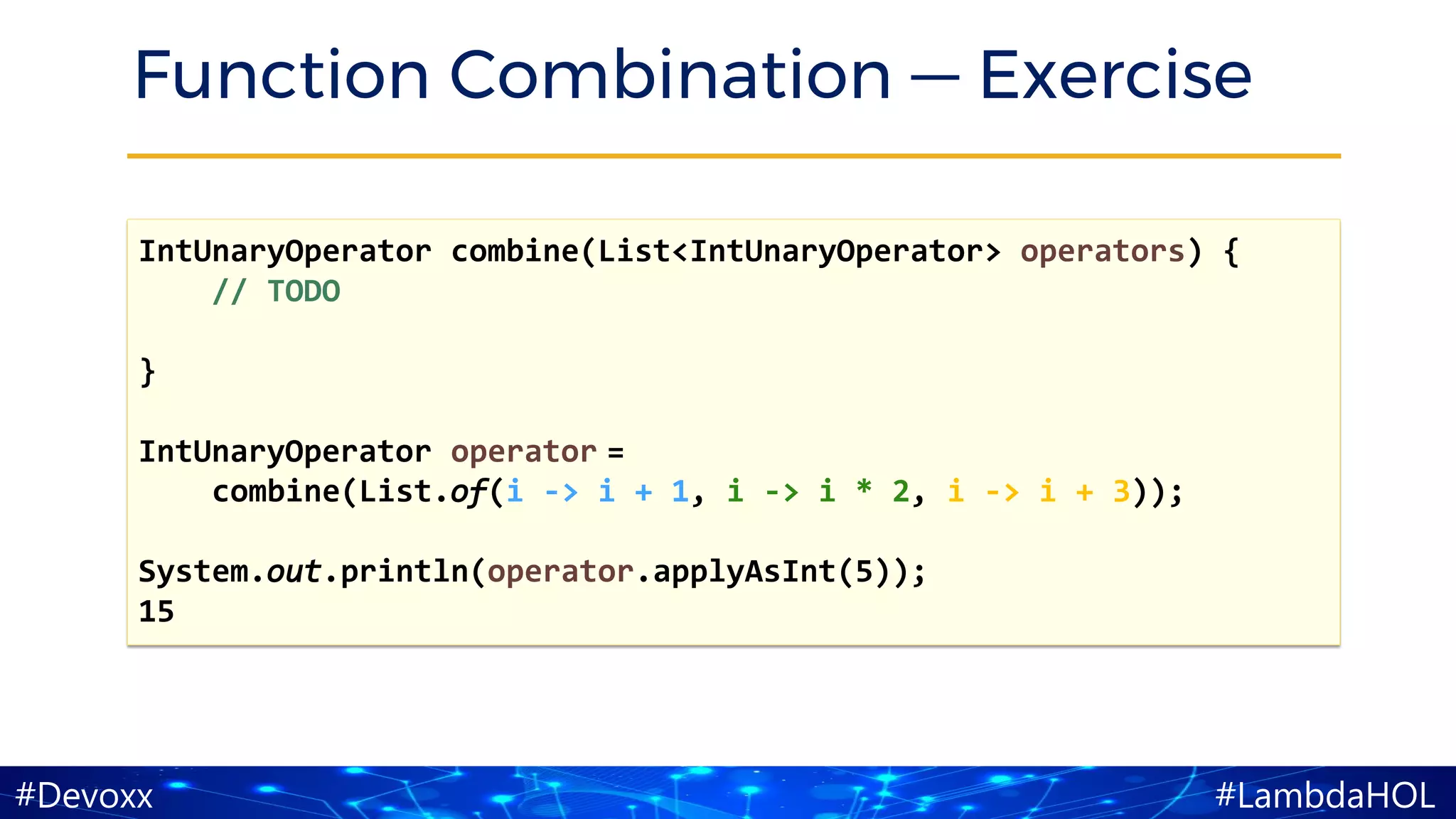
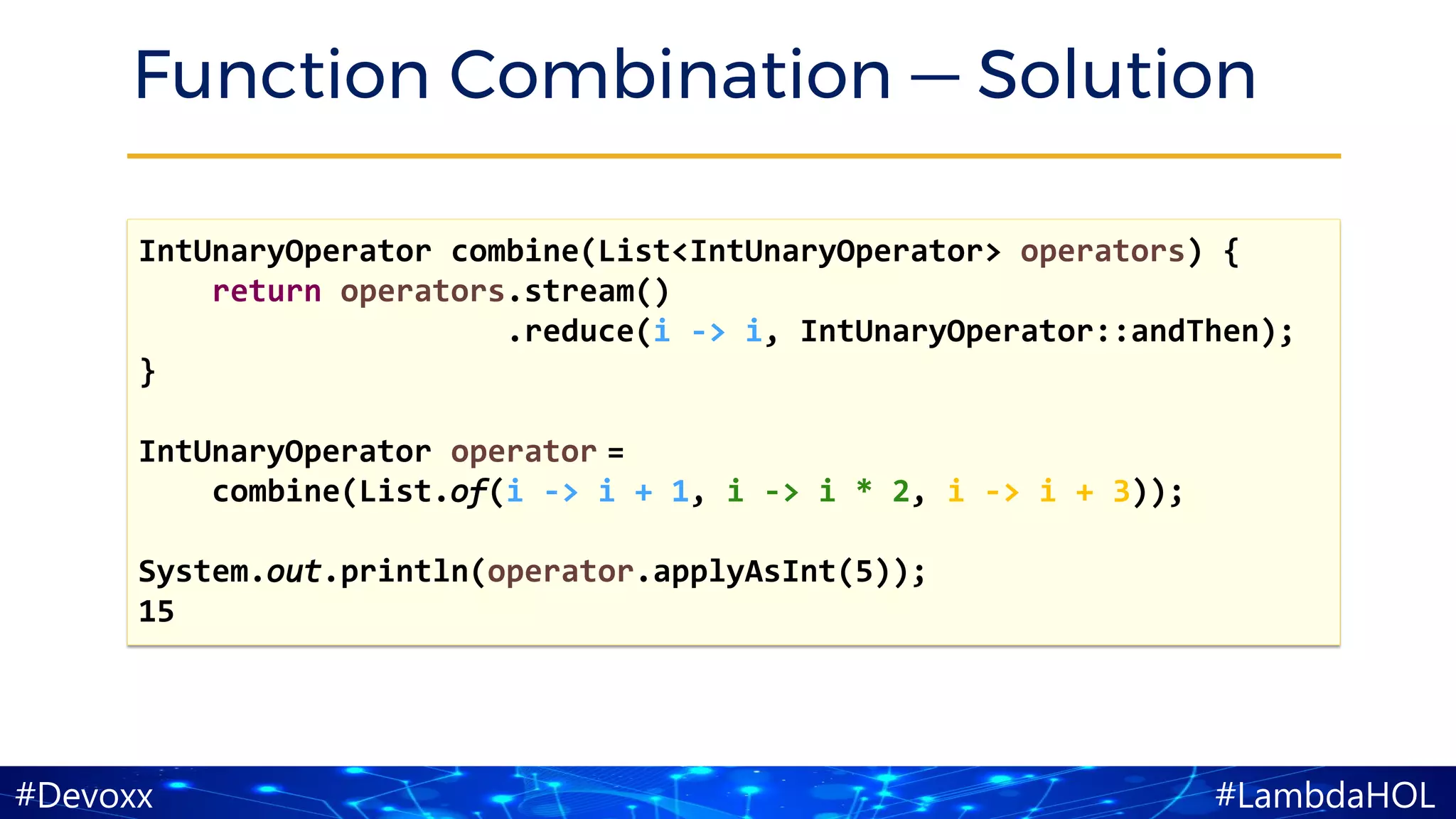
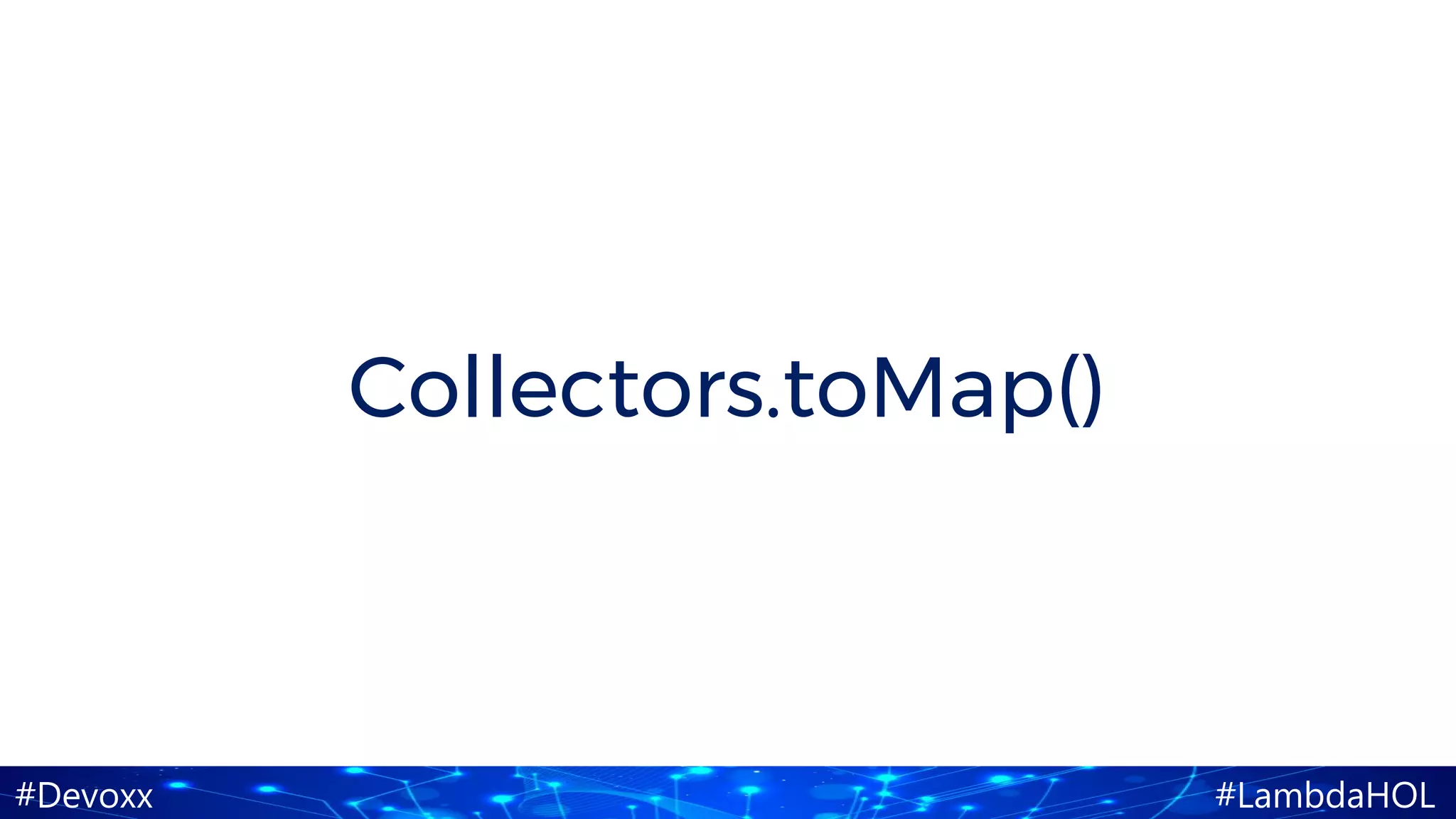
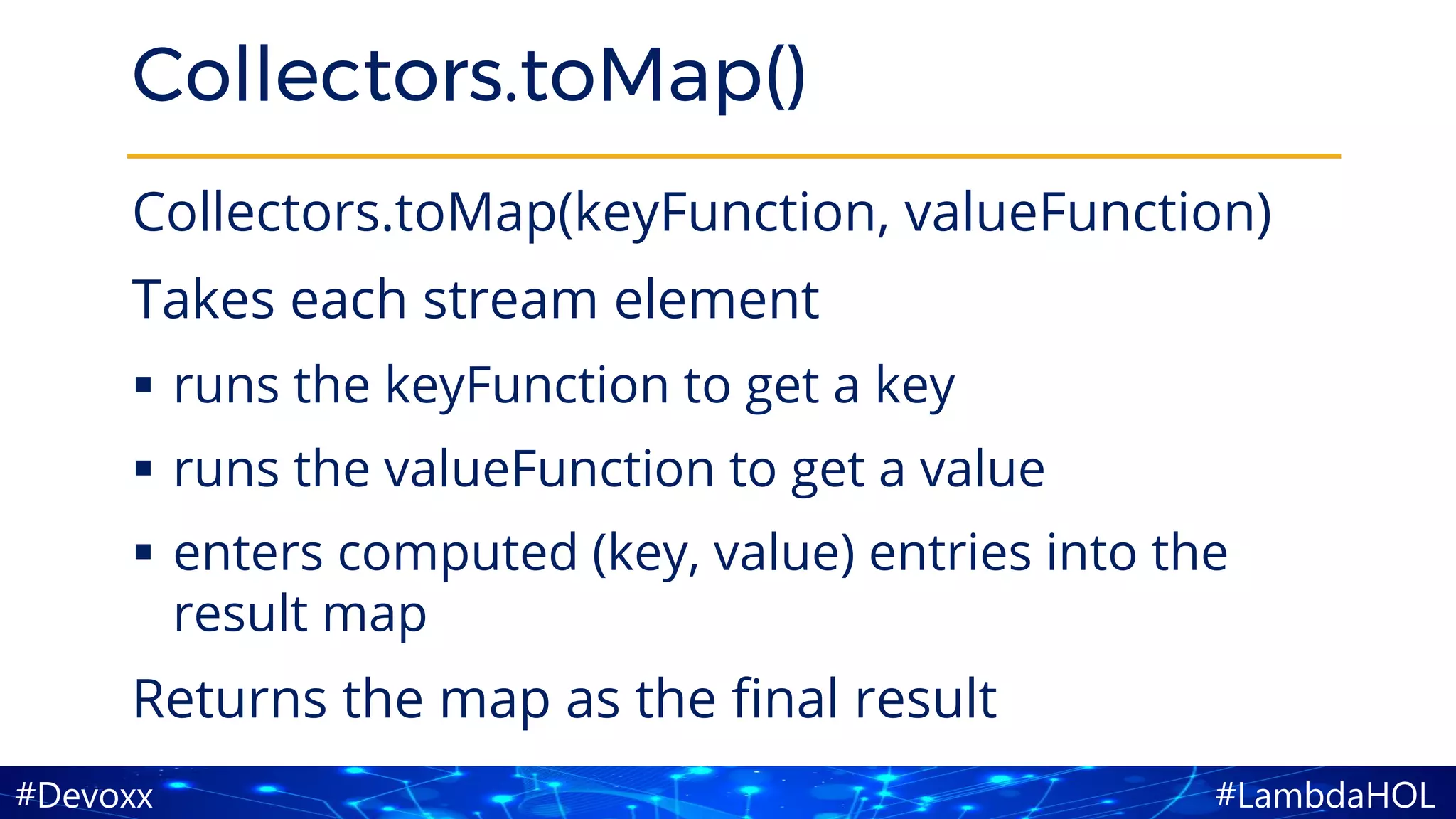
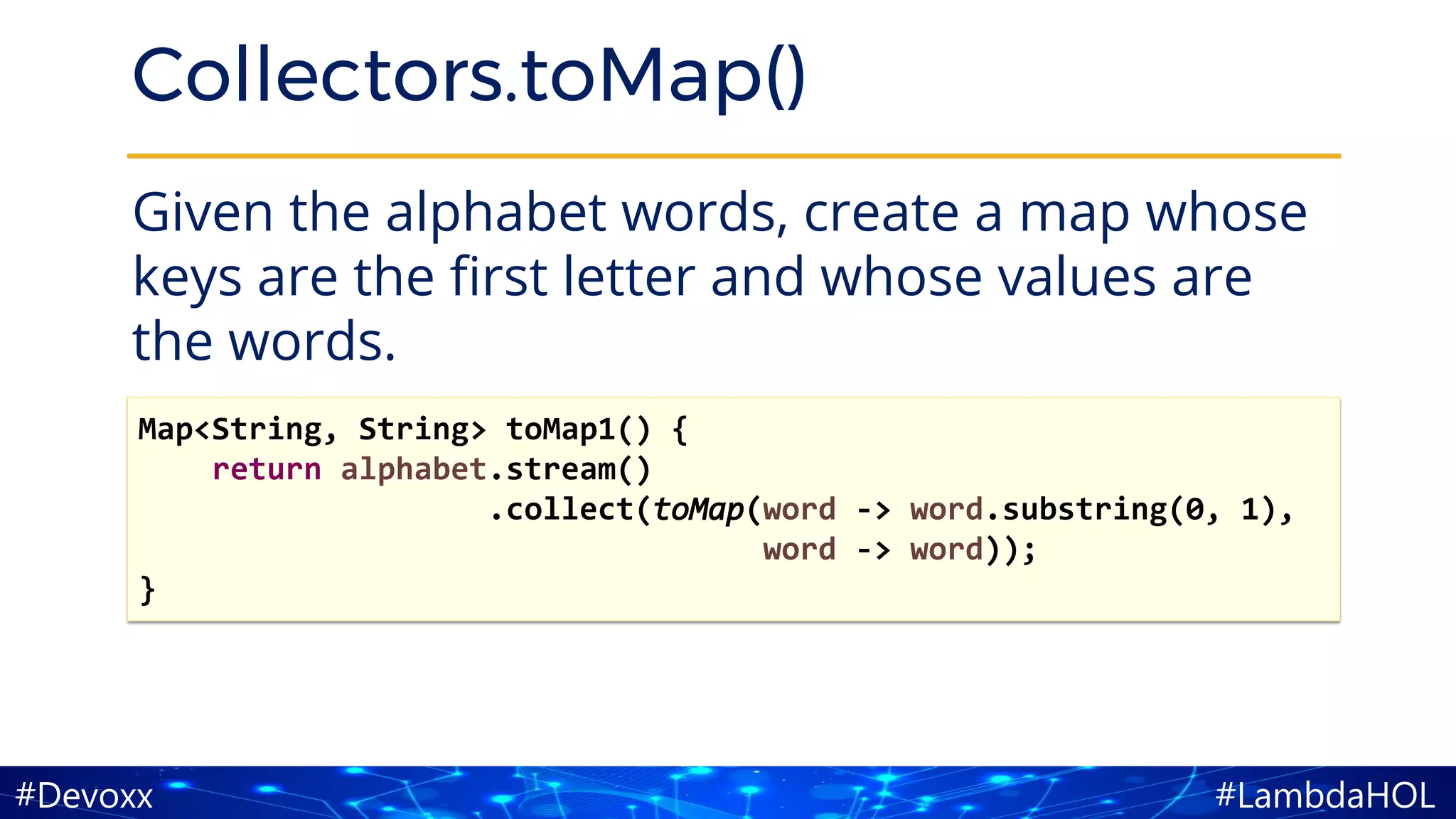
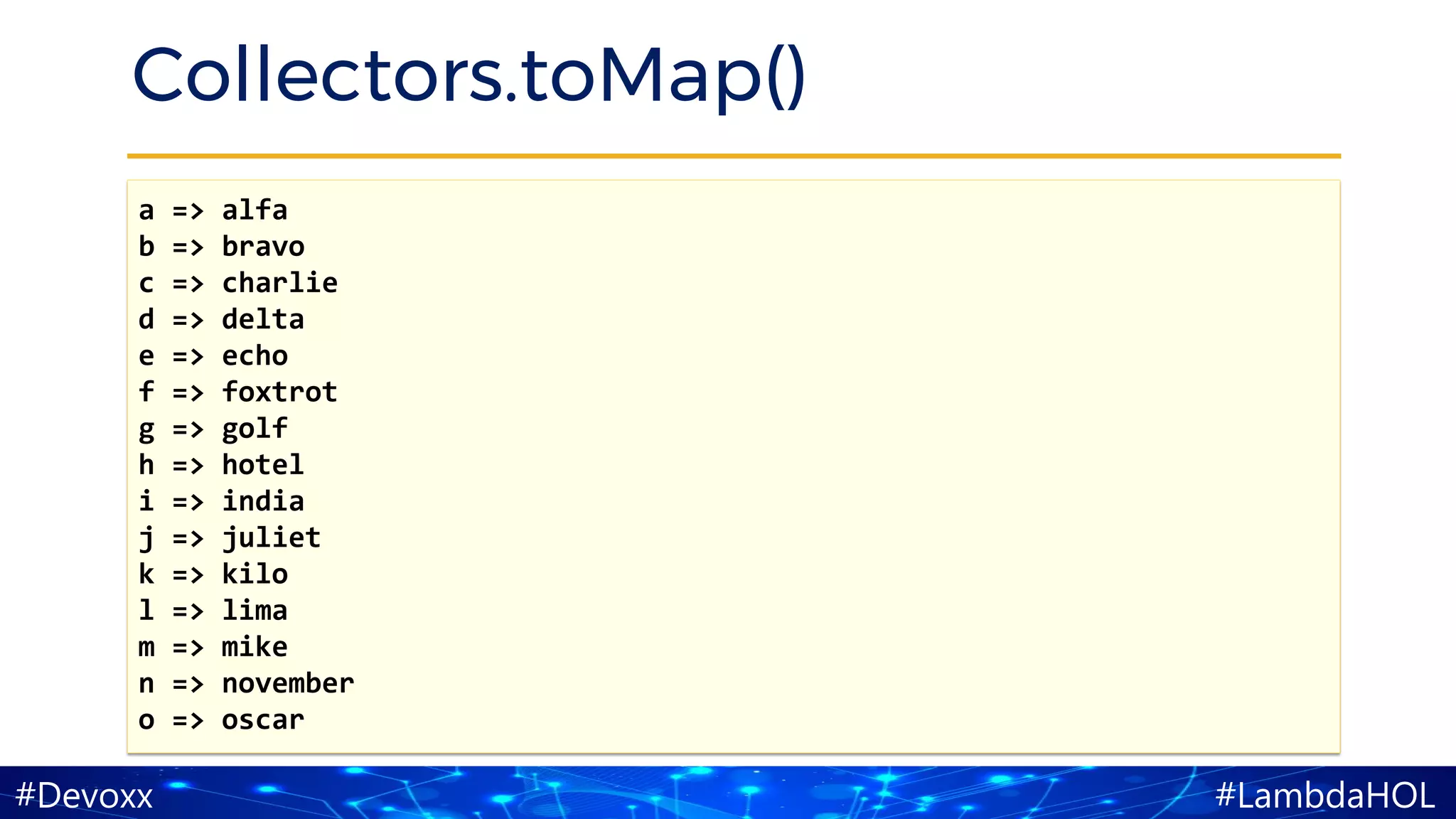
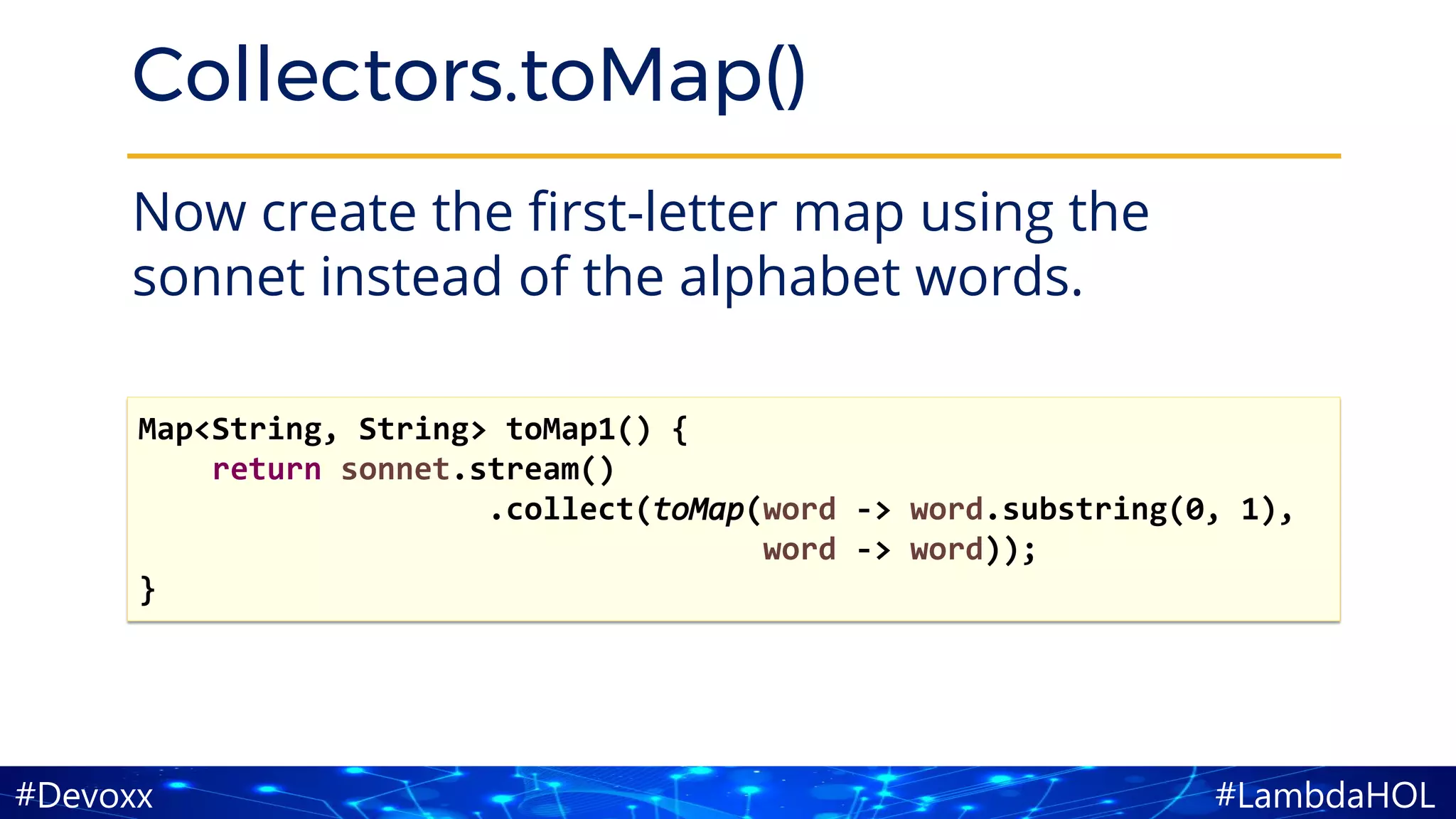
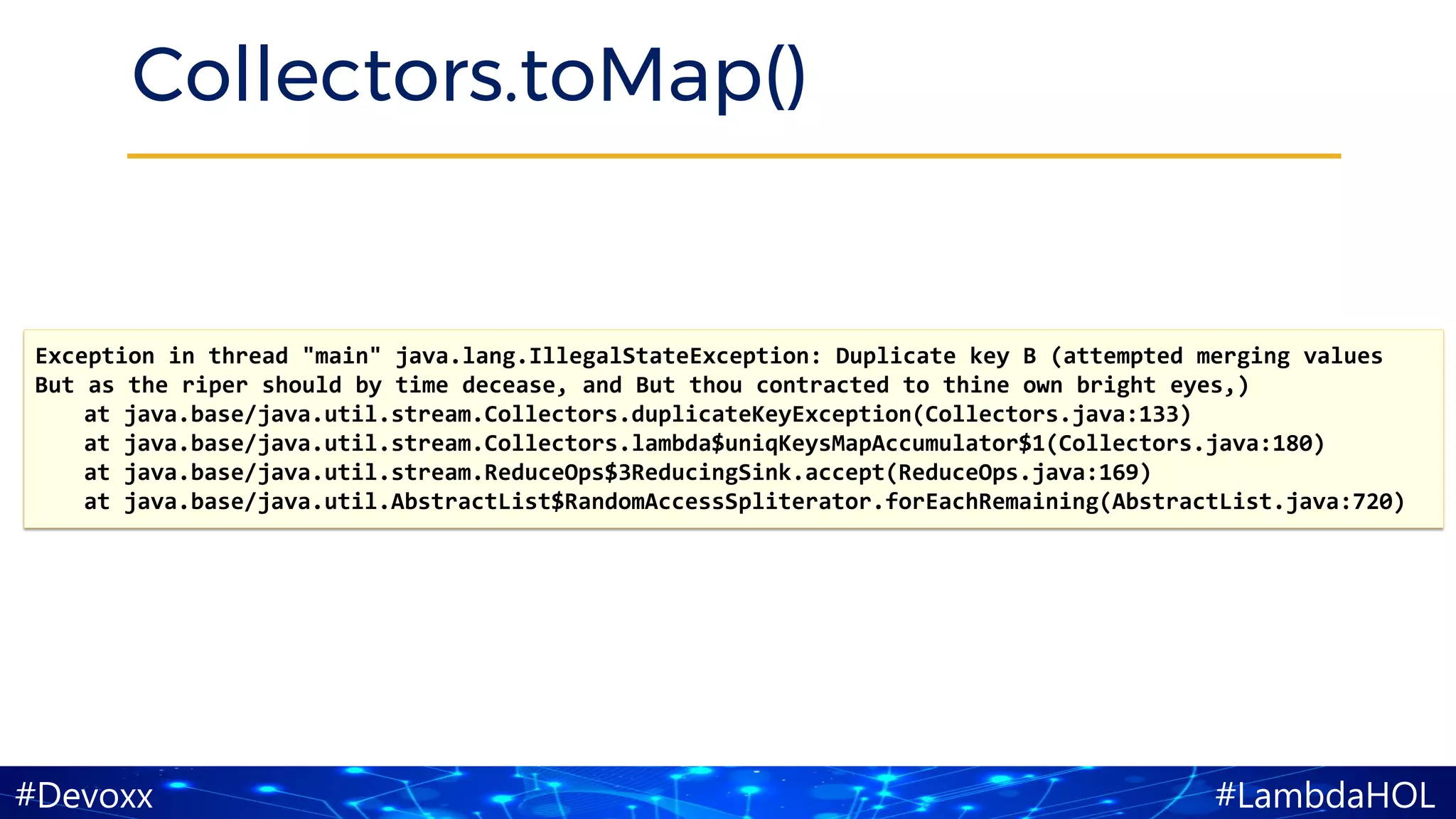
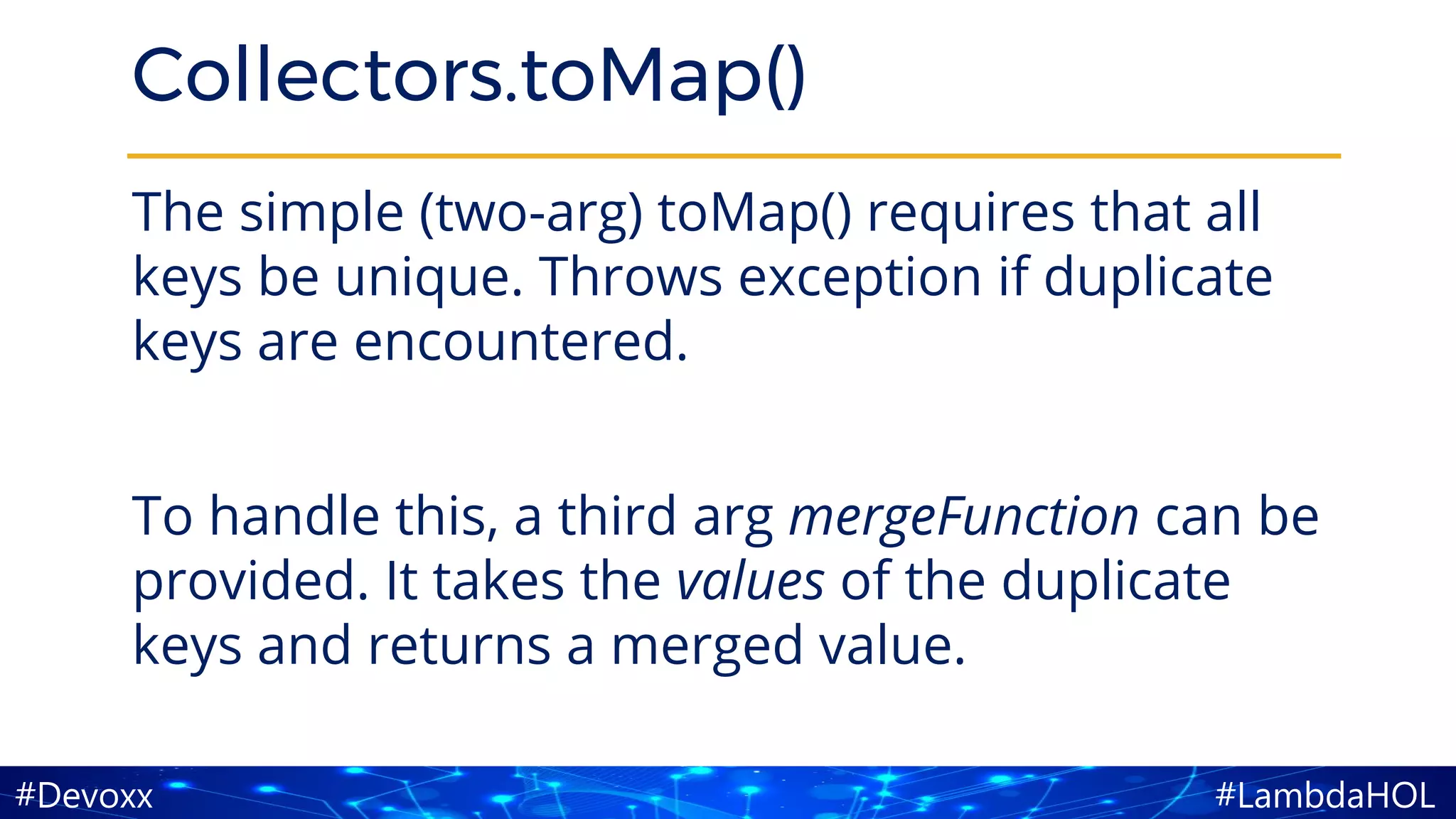
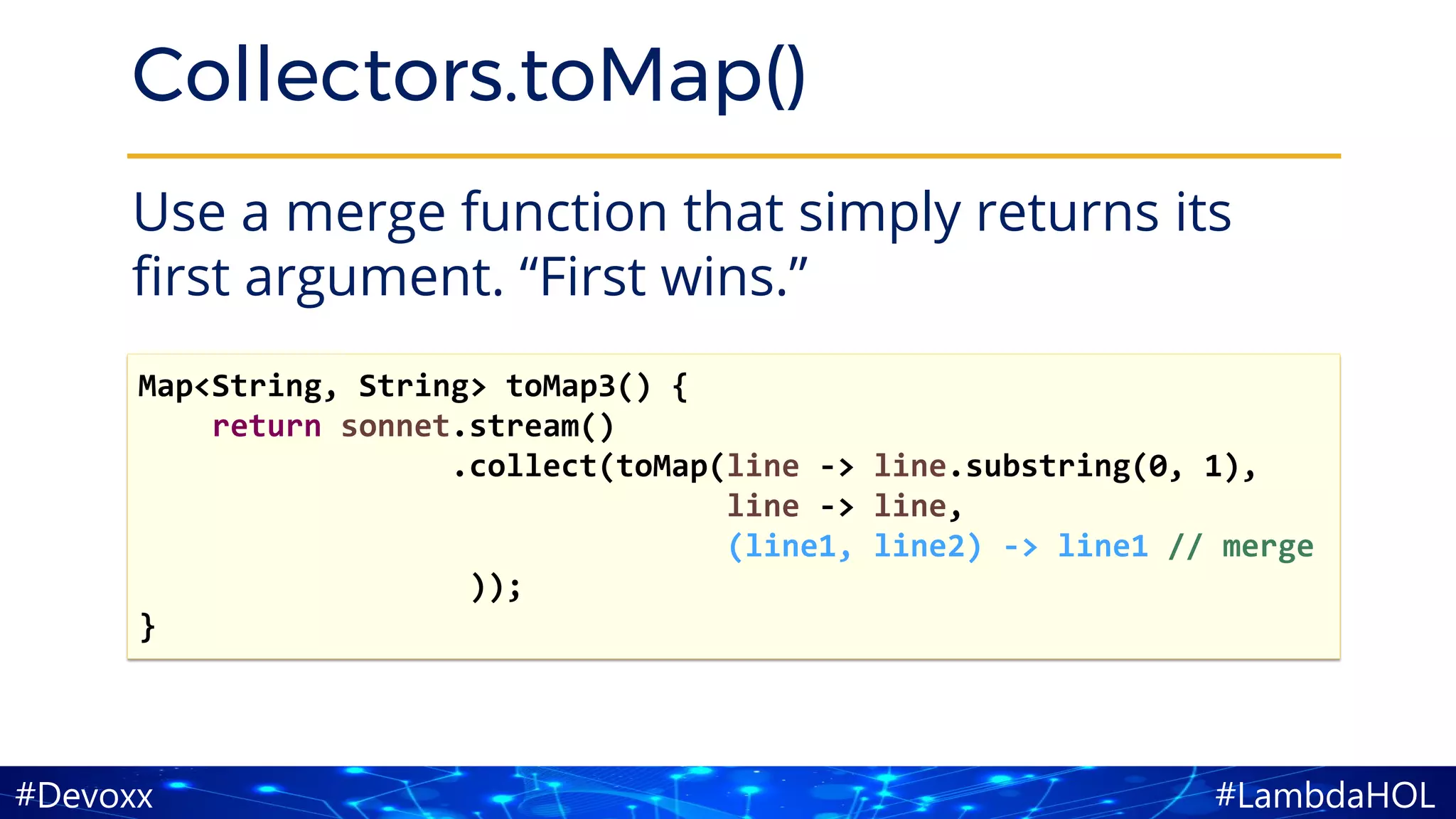
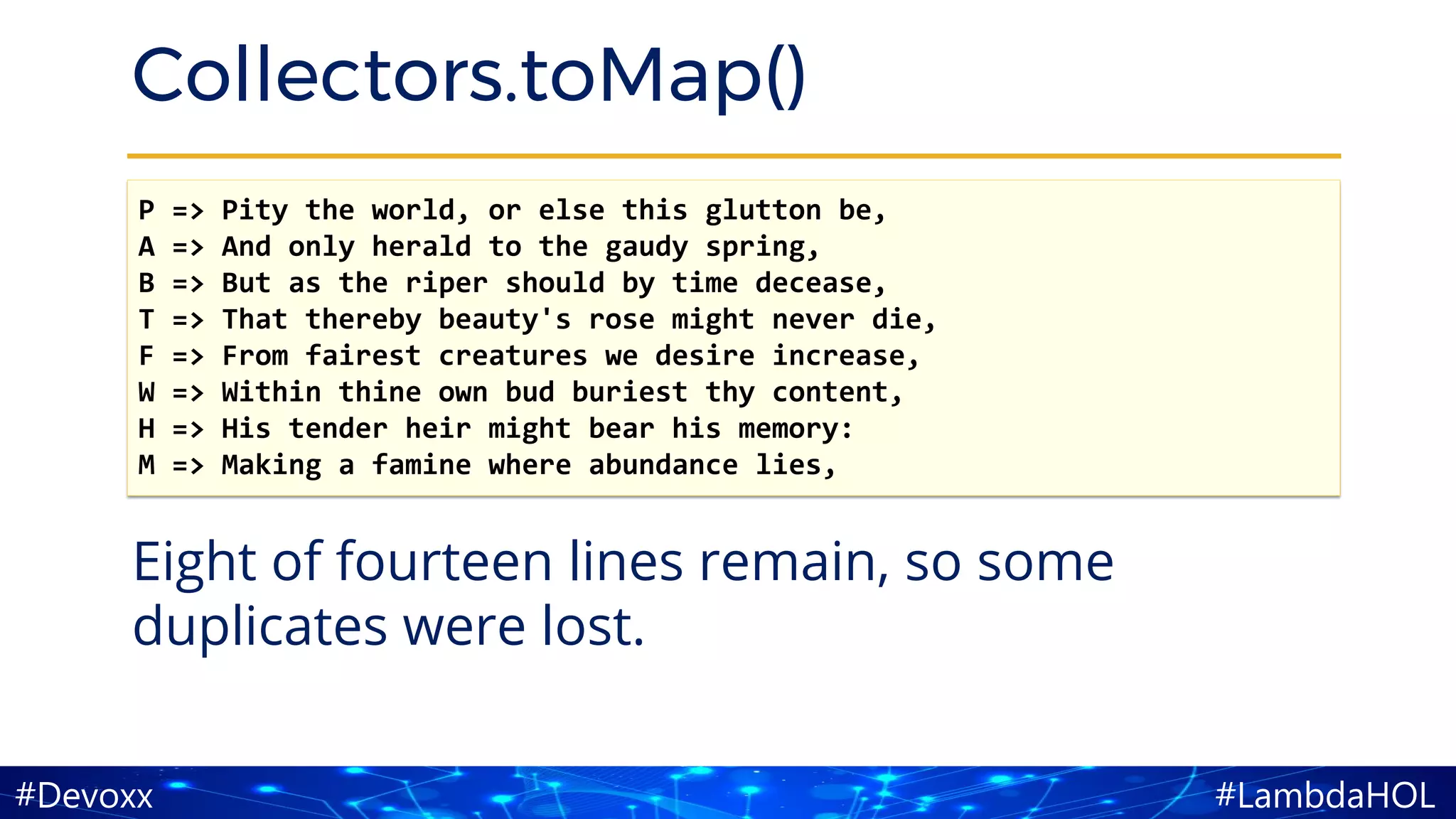

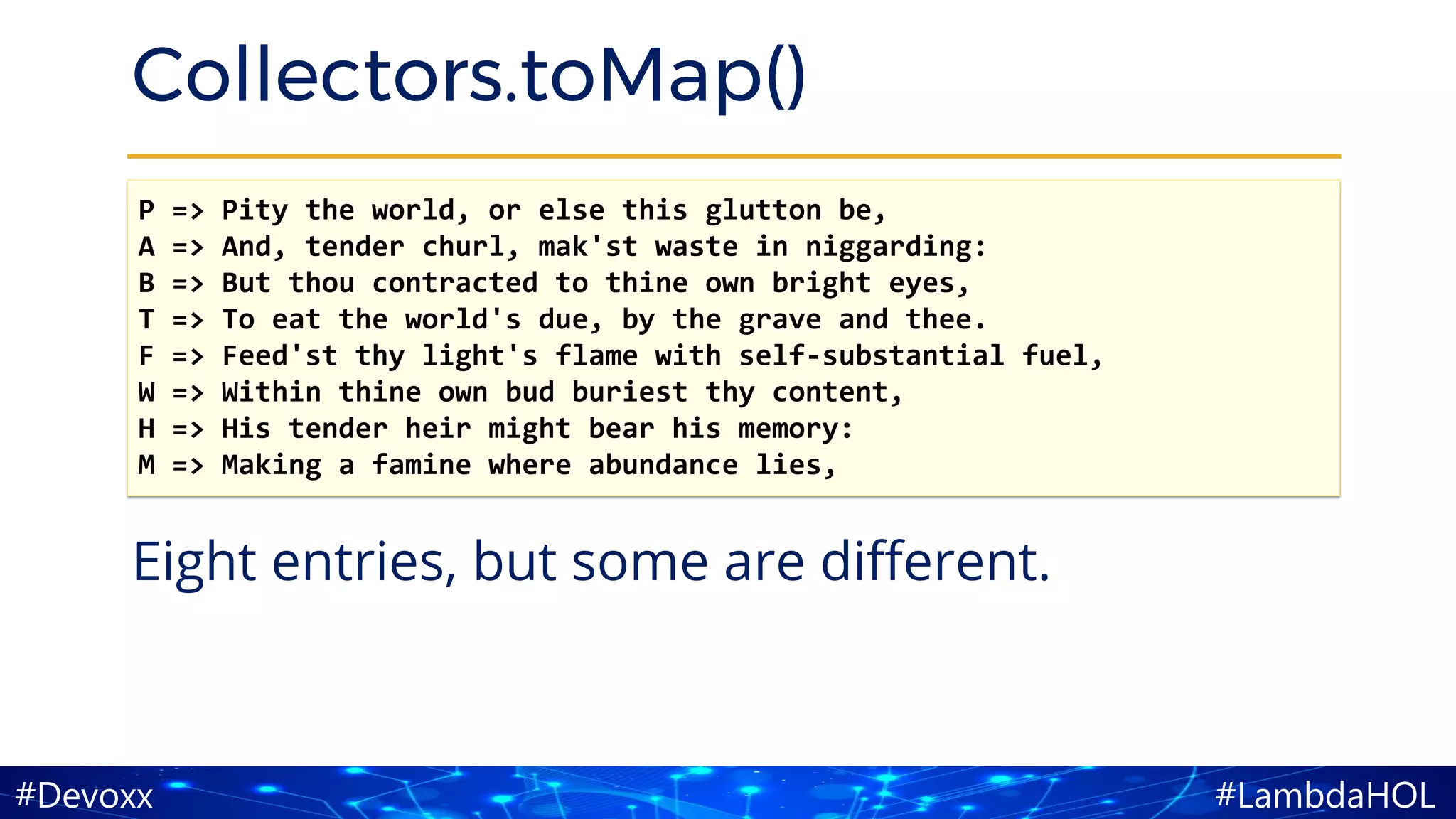
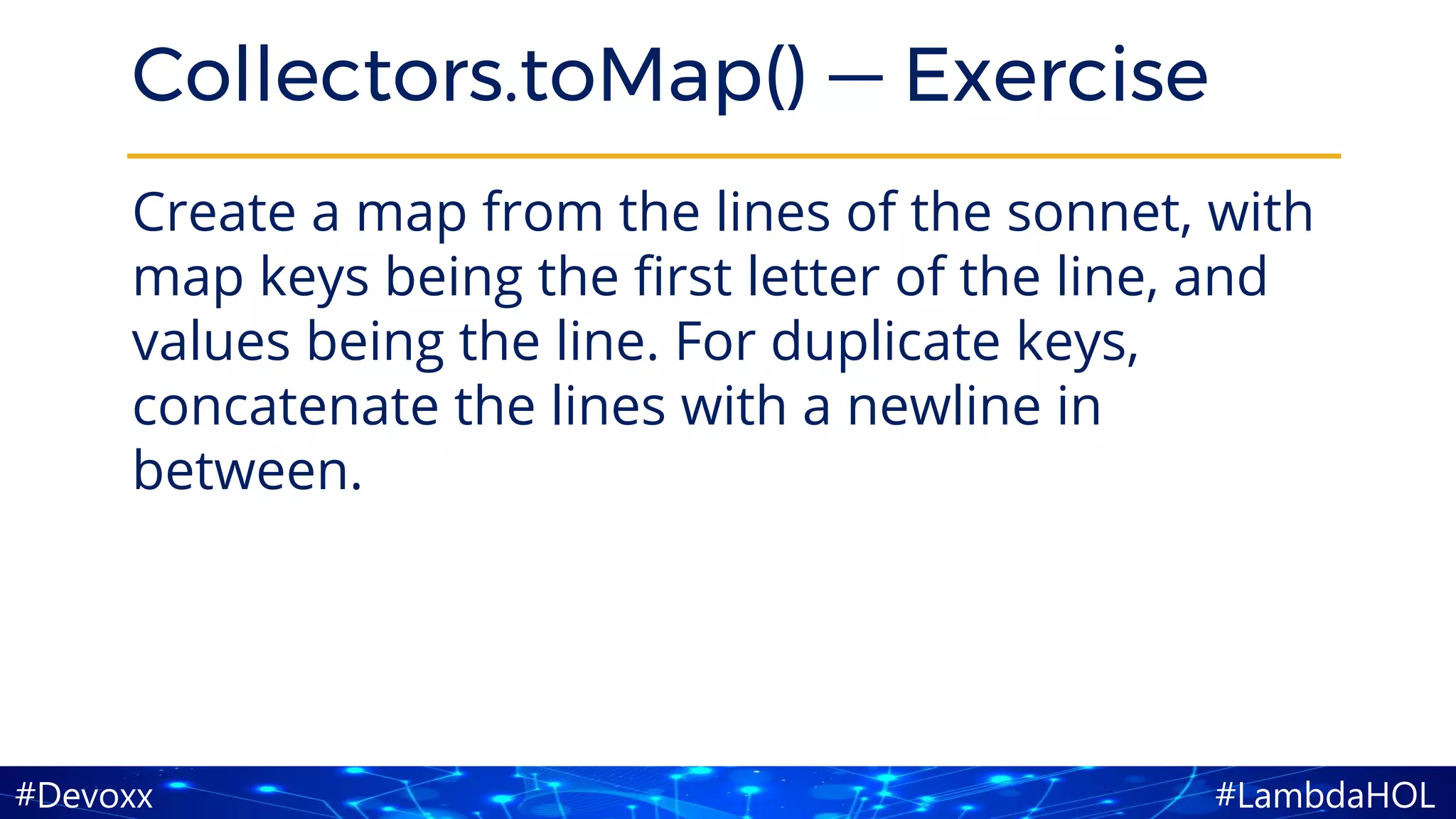
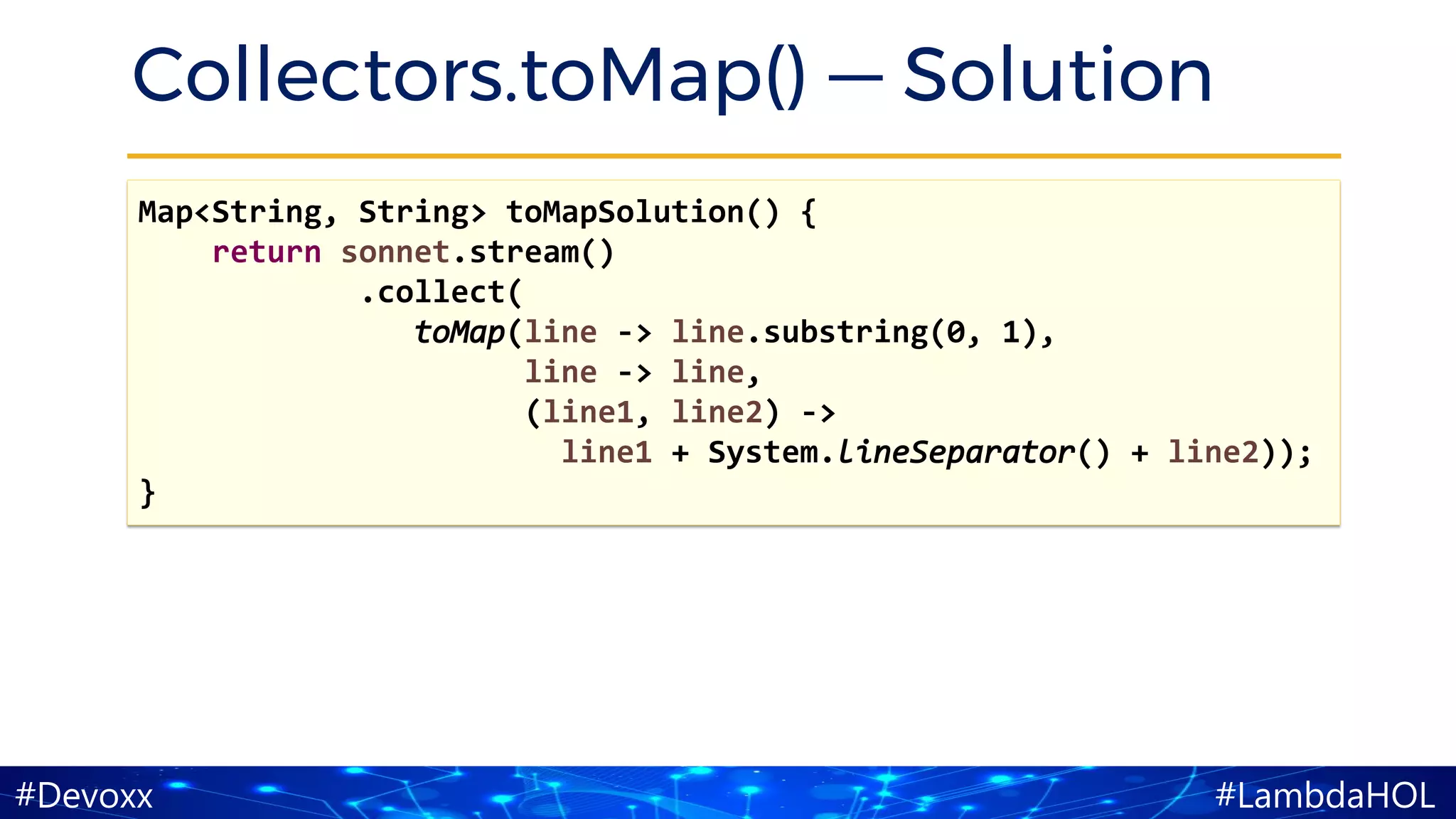
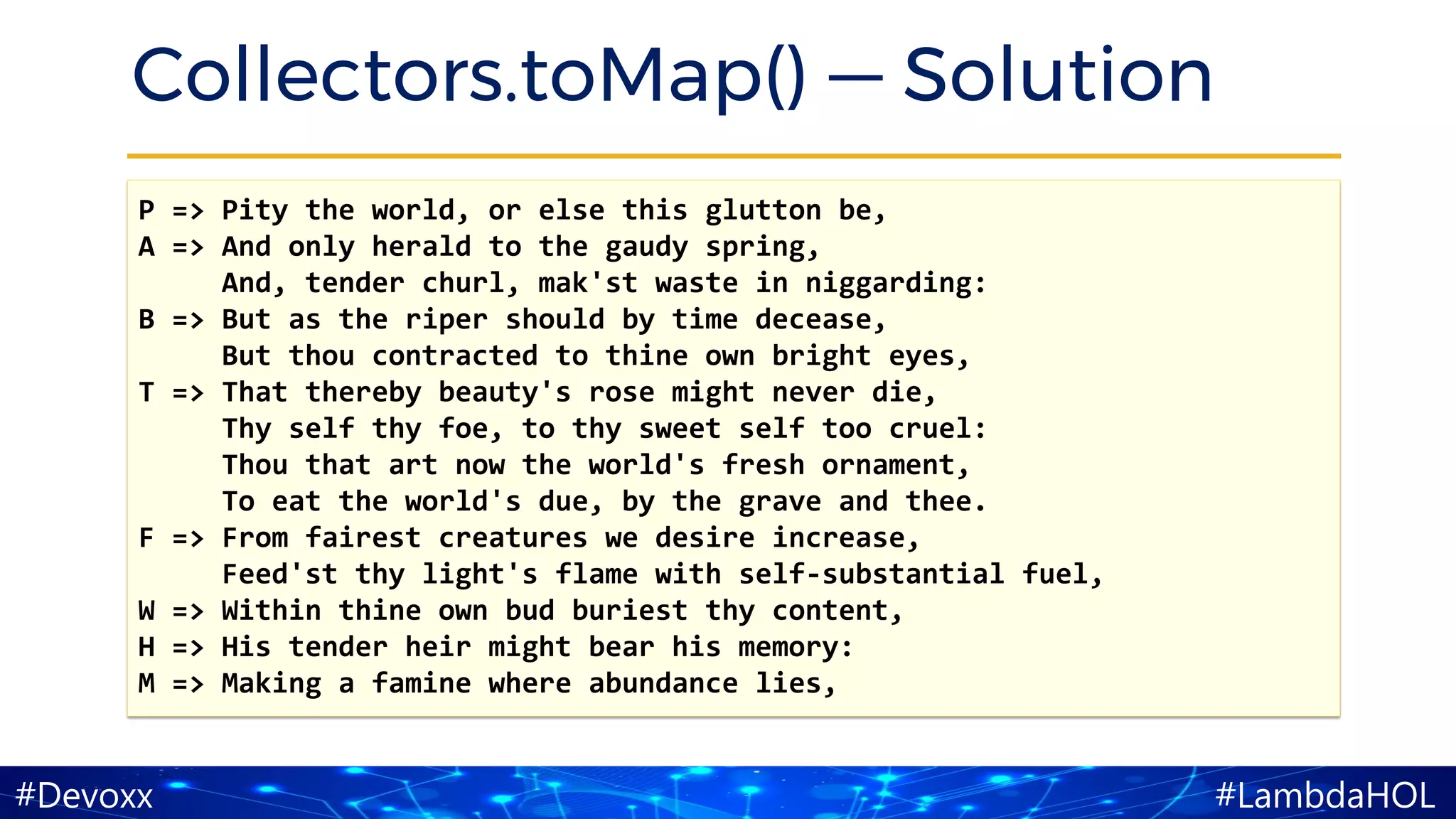
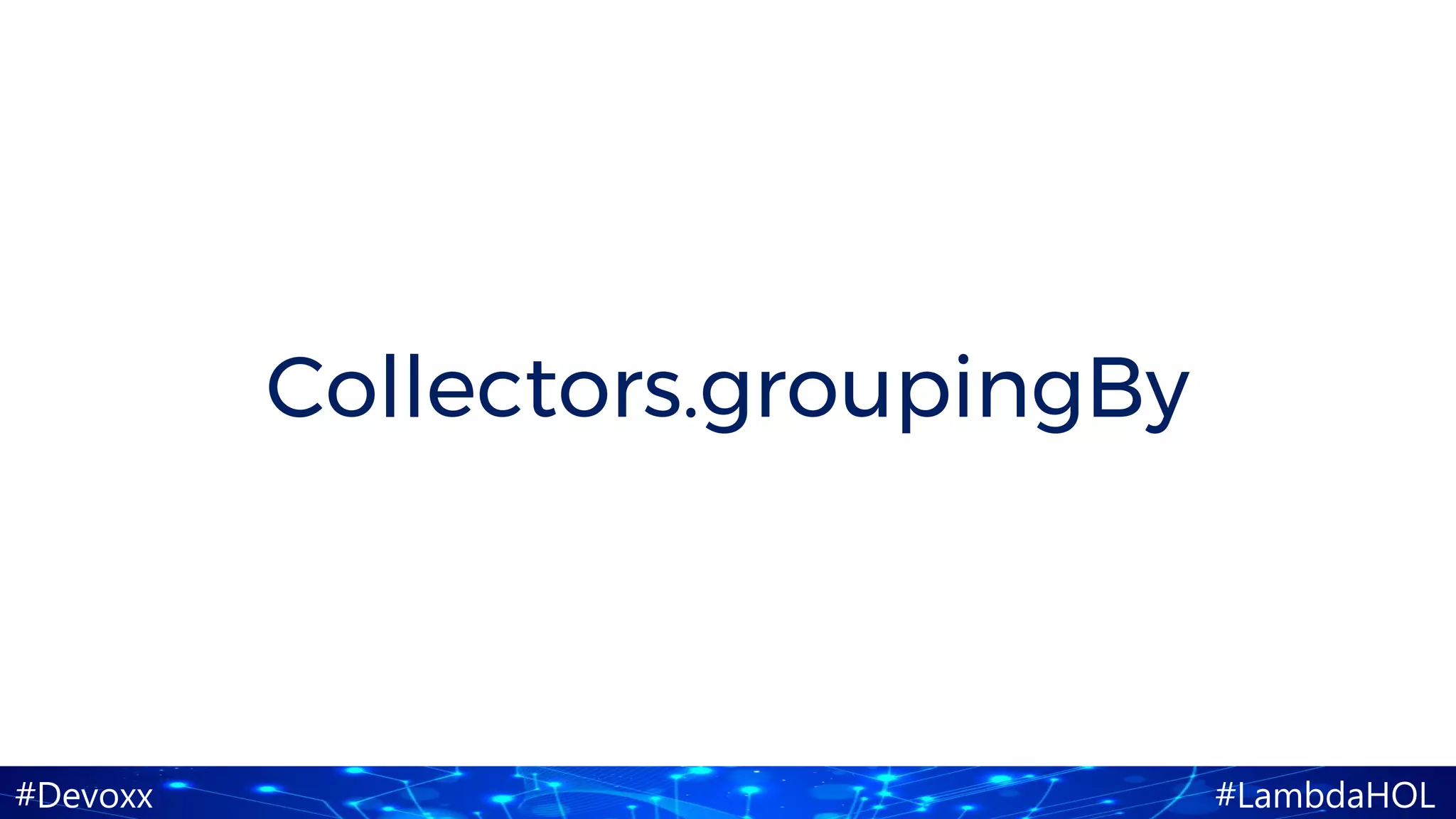
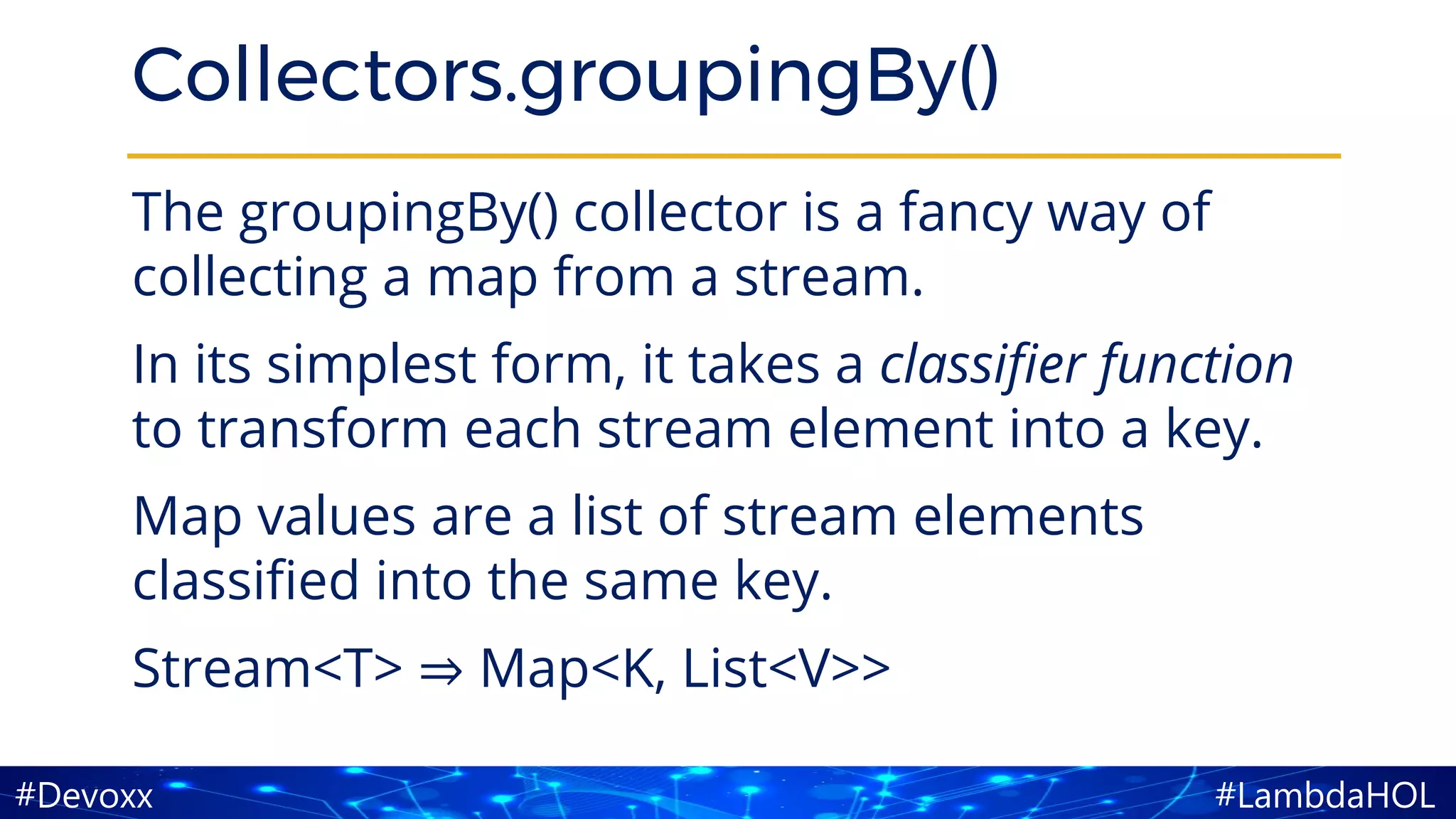
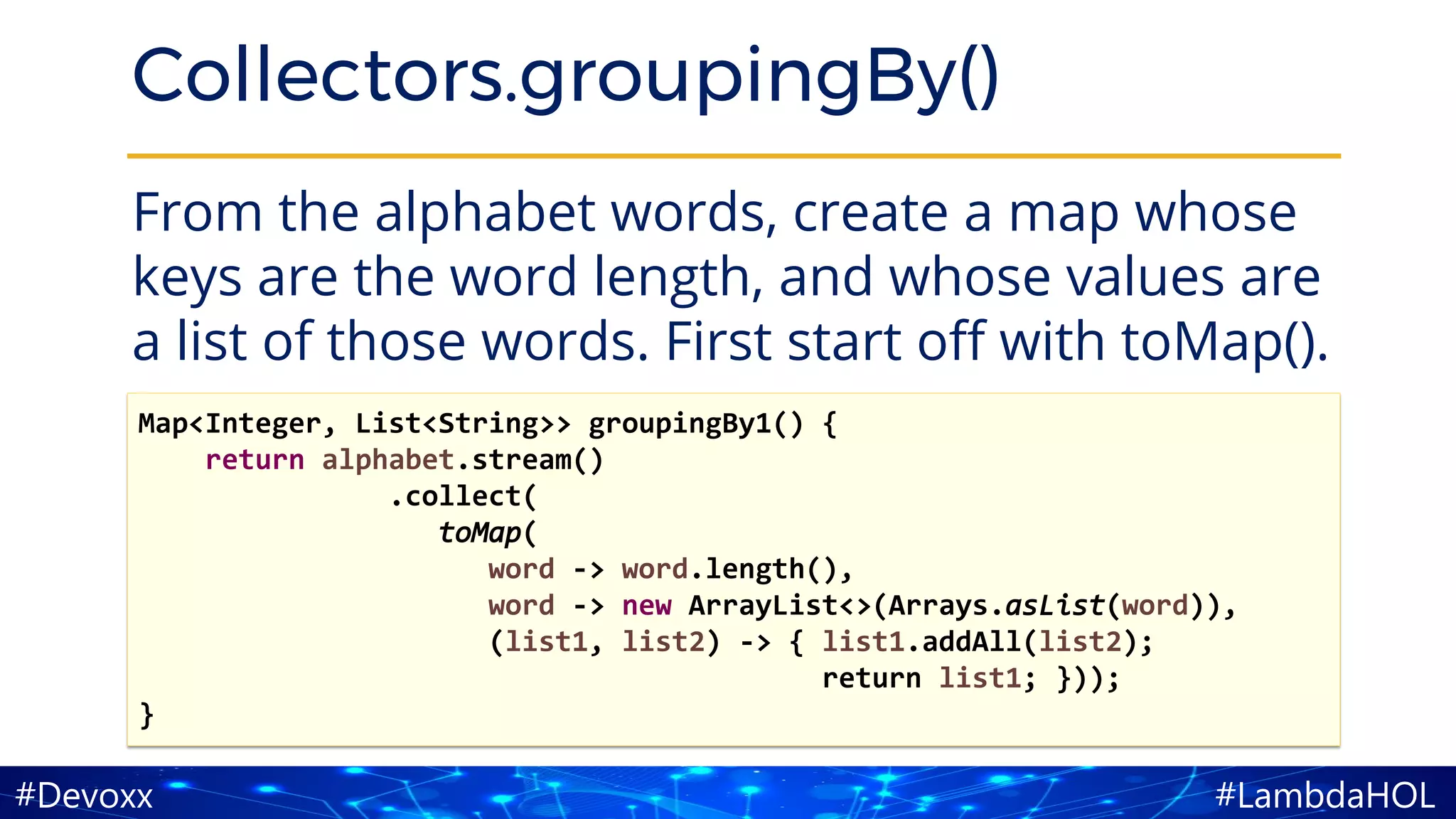
![#LambdaHOL#Devoxx
Collectors.groupingBy()
4 => [alfa, echo, golf, kilo, lima, mike, papa, zulu]
5 => [bravo, delta, hotel, india, oscar, romeo, tango, x-ray]
6 => [juliet, quebec, sierra, victor, yankee]
7 => [charlie, foxtrot, uniform, whiskey]
8 => [november]](https://image.slidesharecdn.com/devoxxbe-2018-part02-181114210036/75/Lambdas-and-Streams-Master-Class-Part-2-55-2048.jpg)
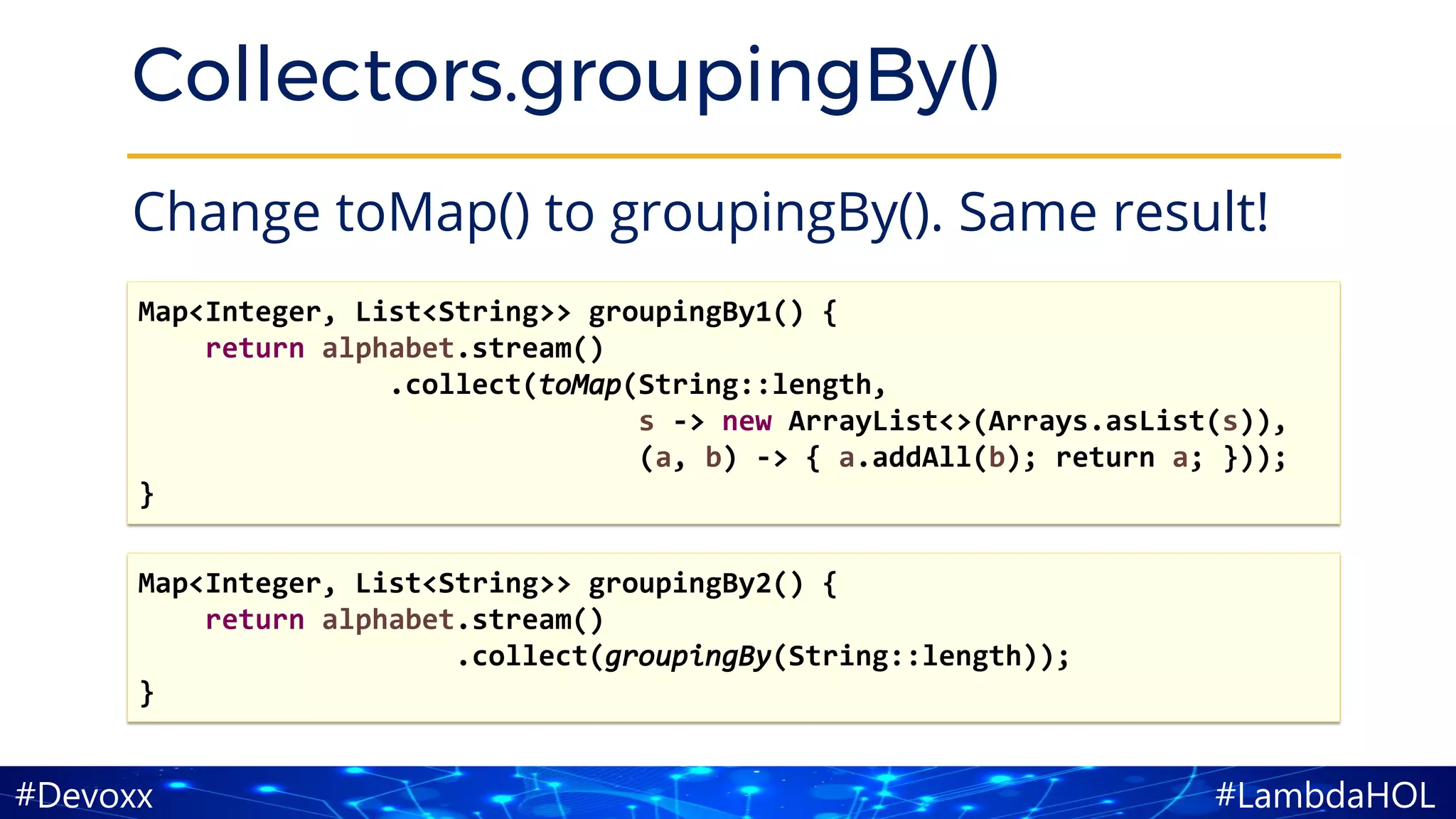
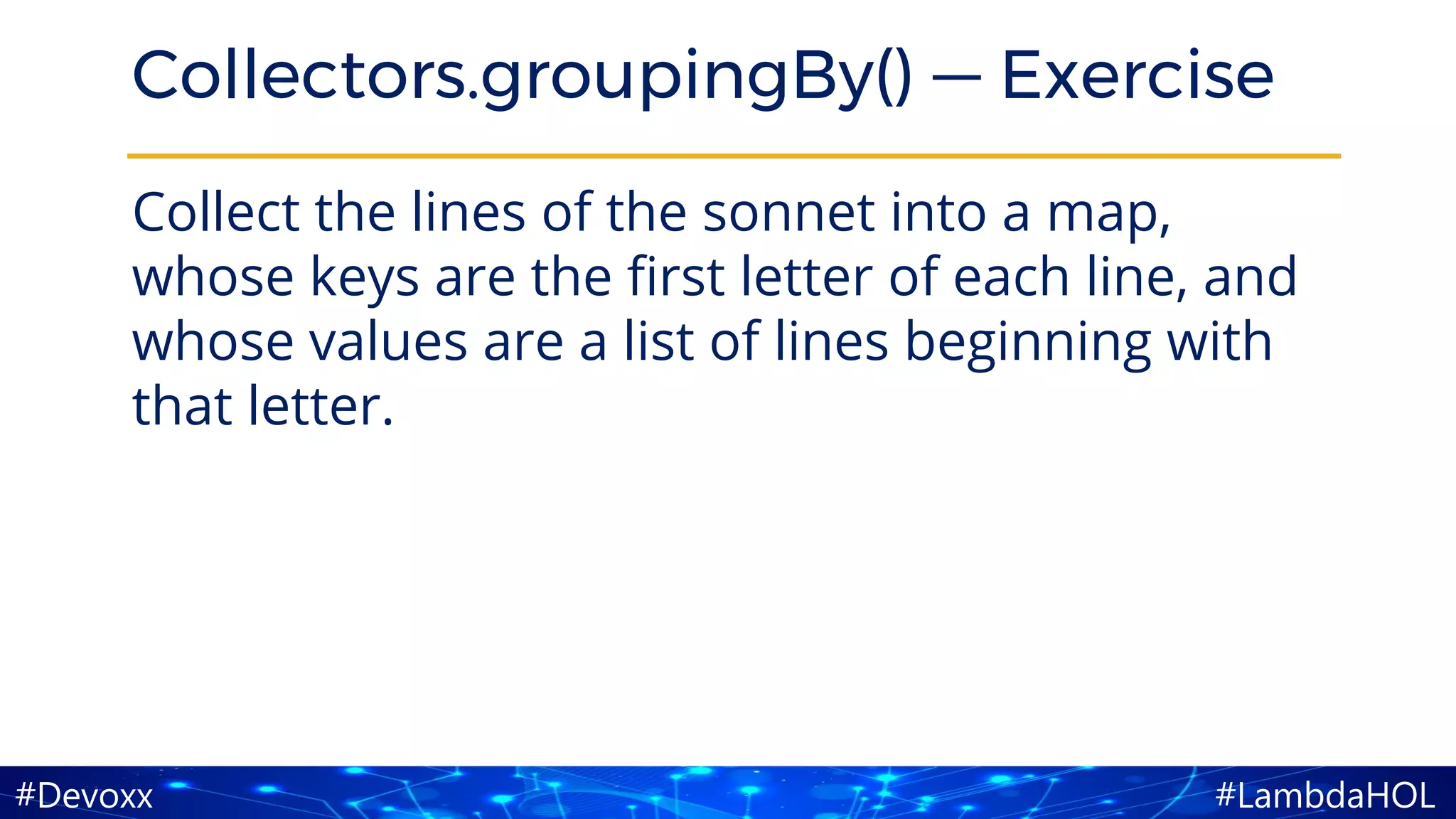
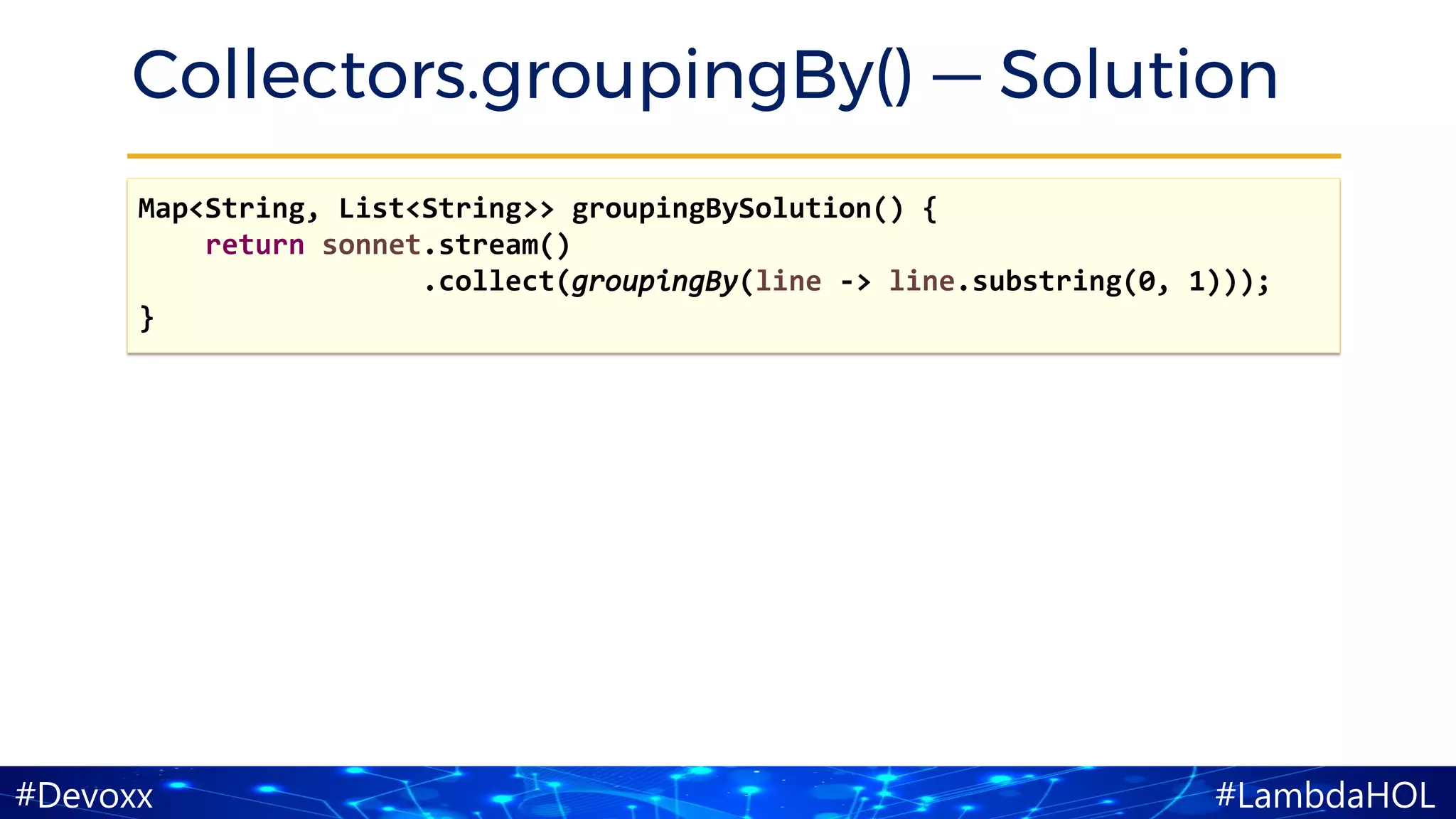
![#LambdaHOL#Devoxx
Collectors.groupingBy() — Solution
P => [Pity the world, or else this glutton be,]
A => [And only herald to the gaudy spring,,
And, tender churl, mak'st waste in niggarding:]
B => [But as the riper should by time decease,,
But thou contracted to thine own bright eyes,]
T => [That thereby beauty's rose might never die,,
Thy self thy foe, to thy sweet self too cruel:,
Thou that art now the world's fresh ornament,,
To eat the world's due, by the grave and thee.]
F => [From fairest creatures we desire increase,,
Feed'st thy light's flame with self-substantial fuel,]
W => [Within thine own bud buriest thy content,]
H => [His tender heir might bear his memory:]
M => [Making a famine where abundance lies,]](https://image.slidesharecdn.com/devoxxbe-2018-part02-181114210036/75/Lambdas-and-Streams-Master-Class-Part-2-59-2048.jpg)
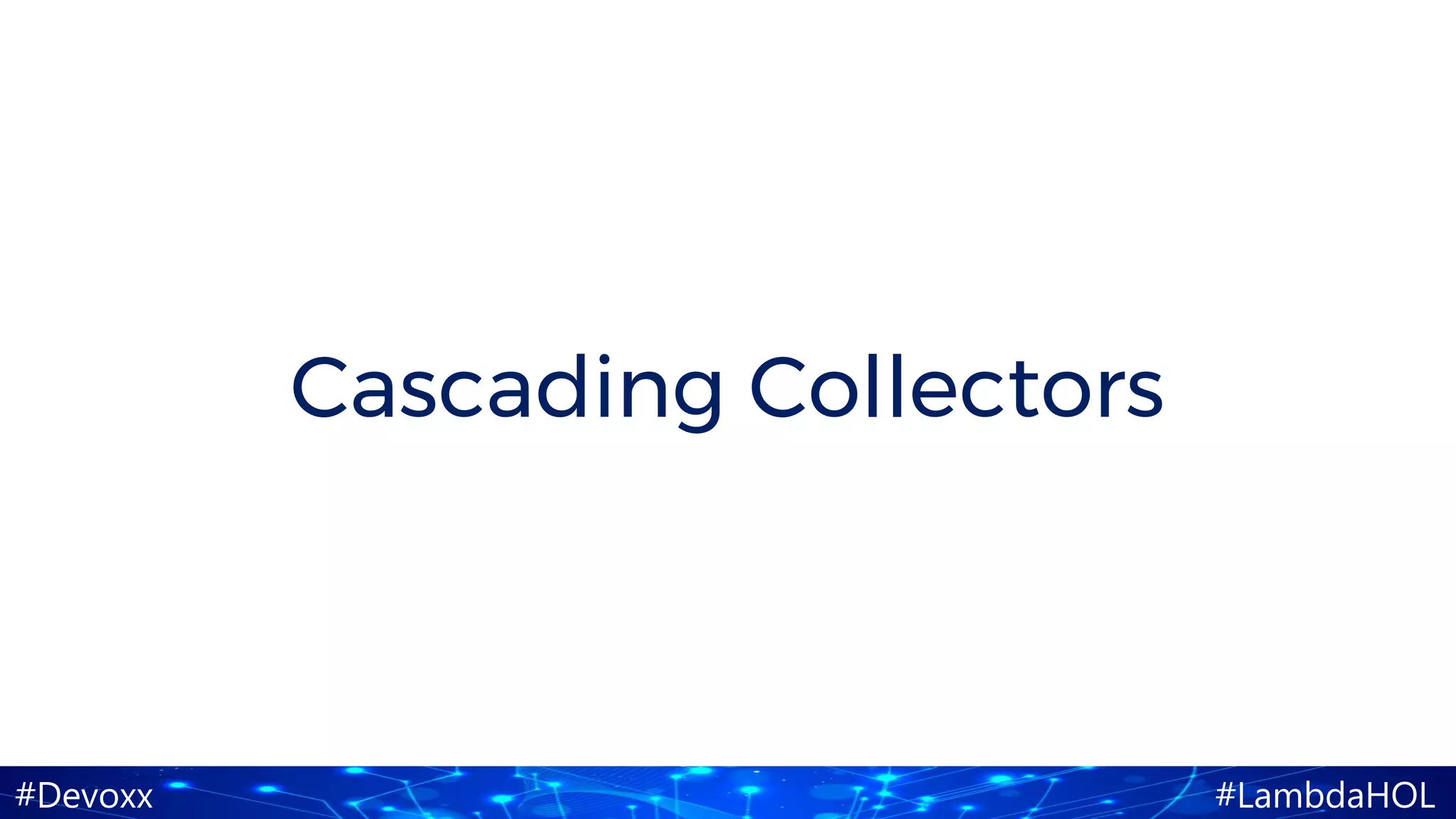
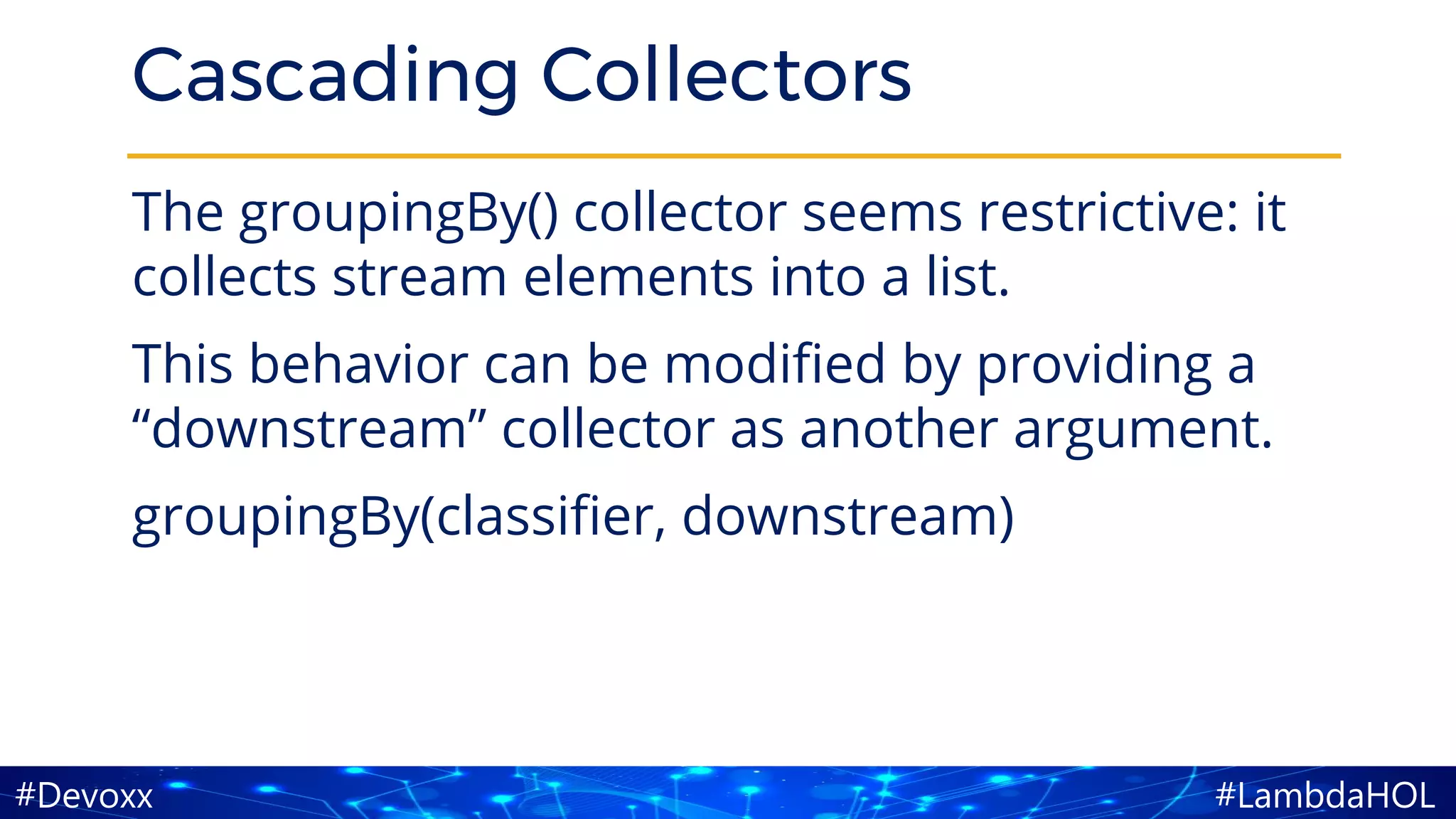
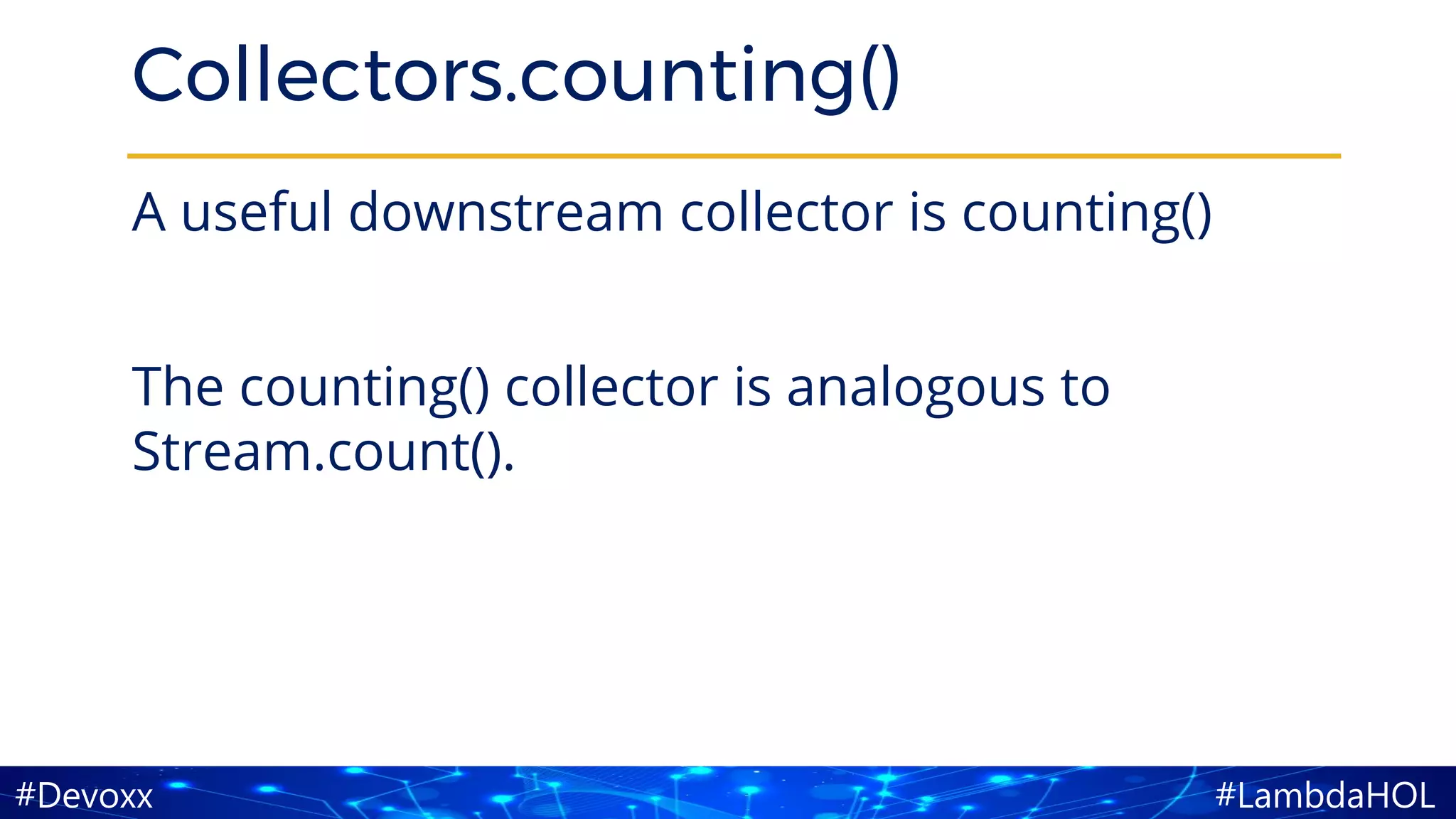
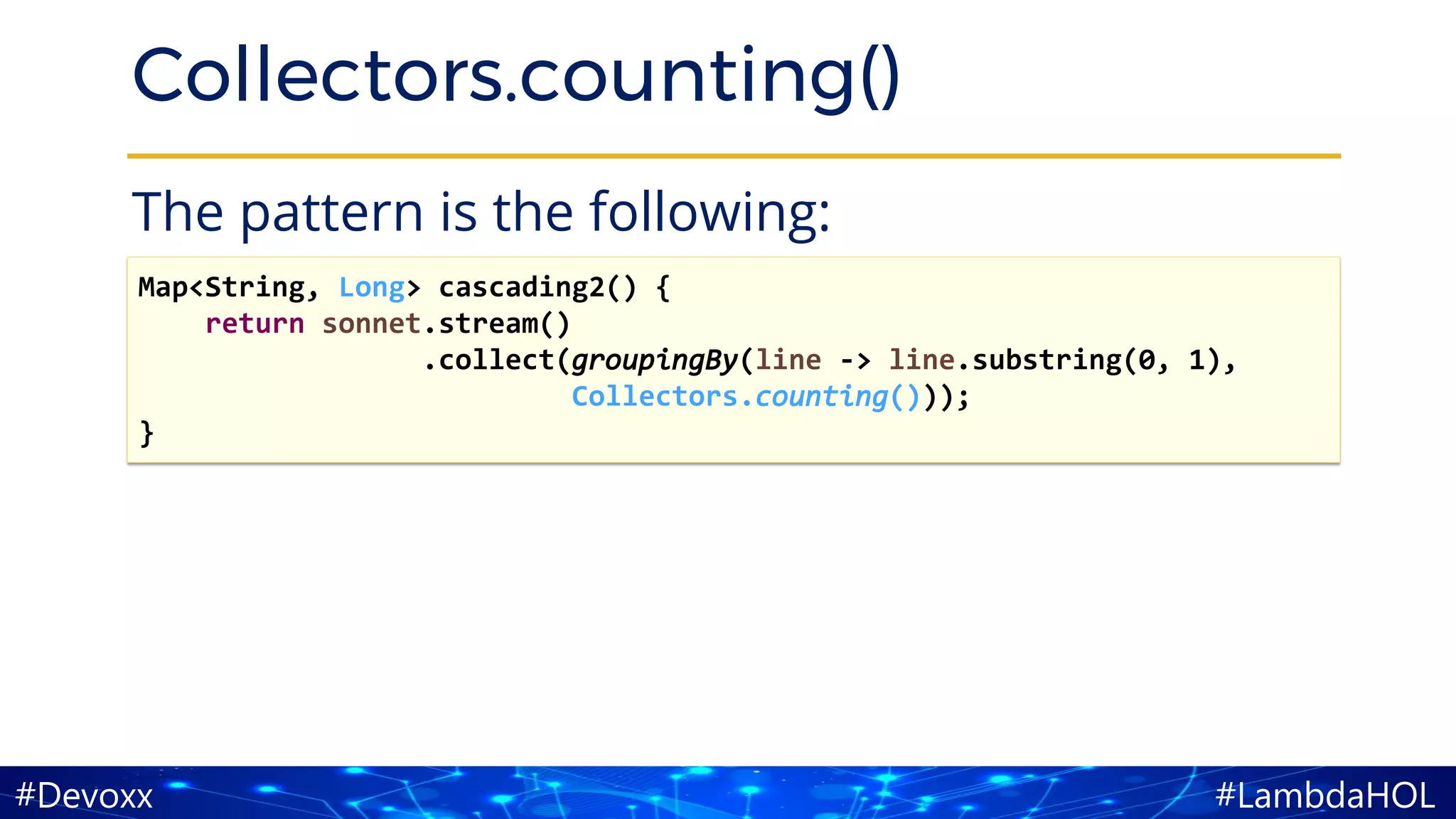
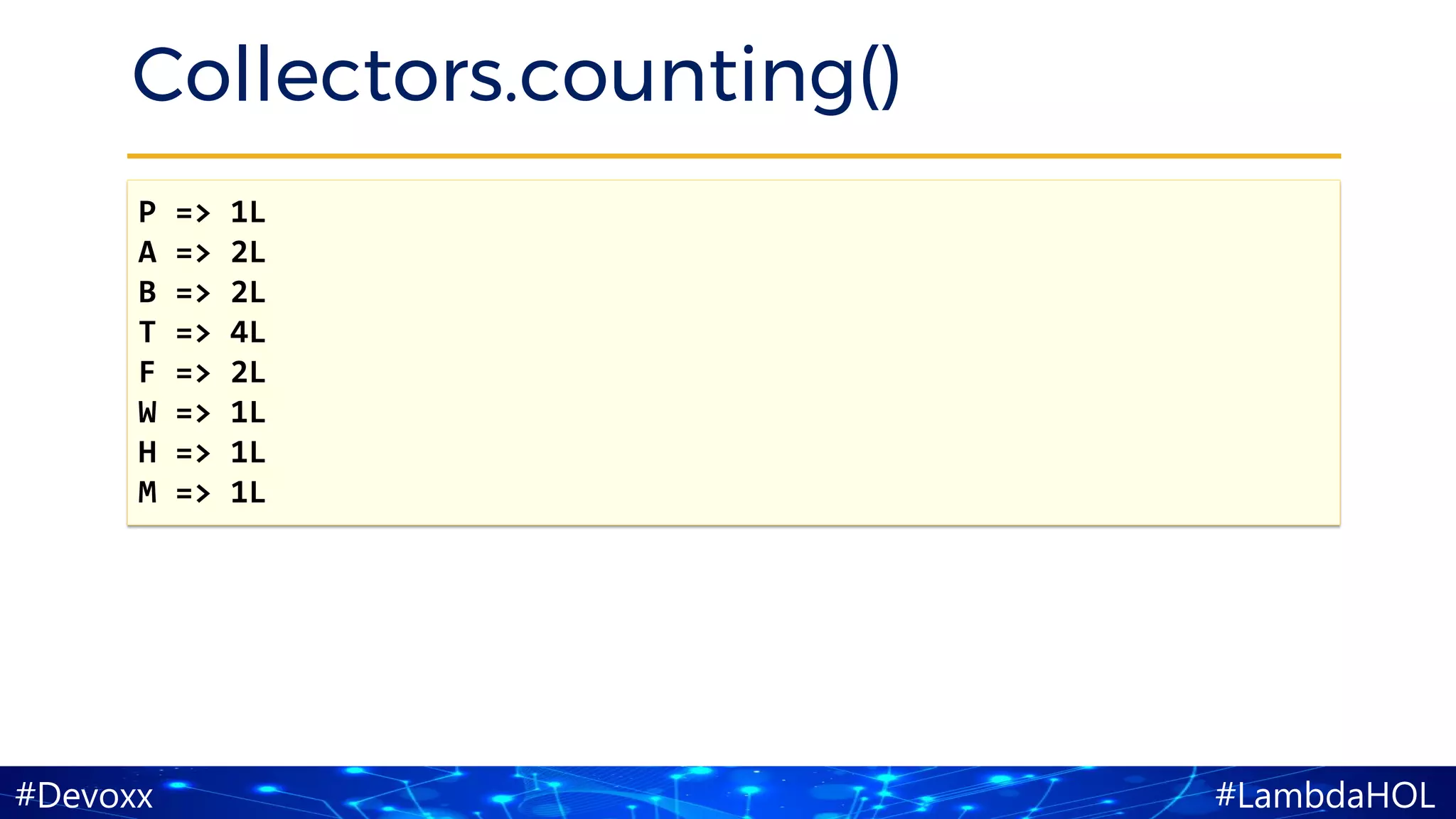
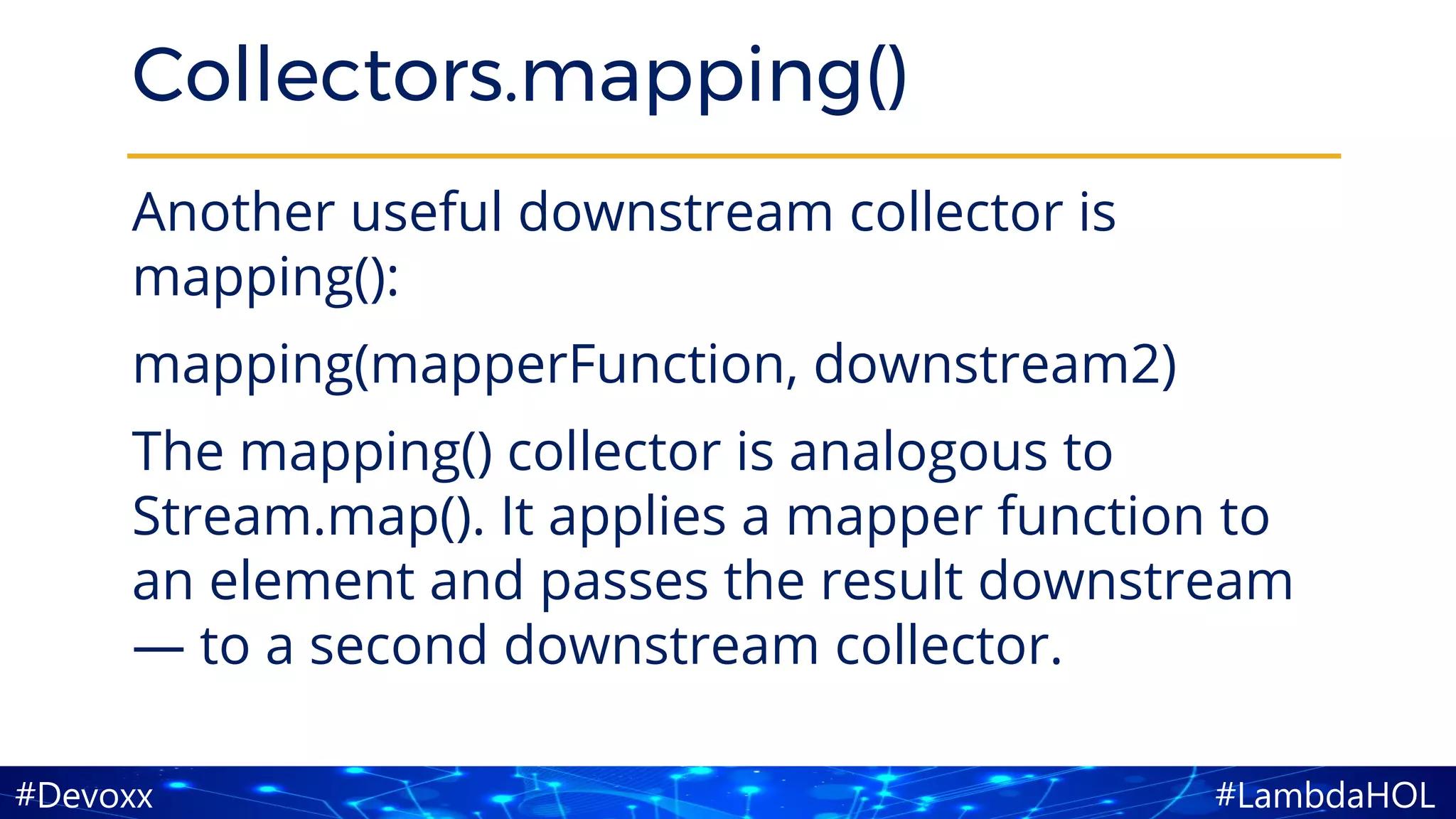
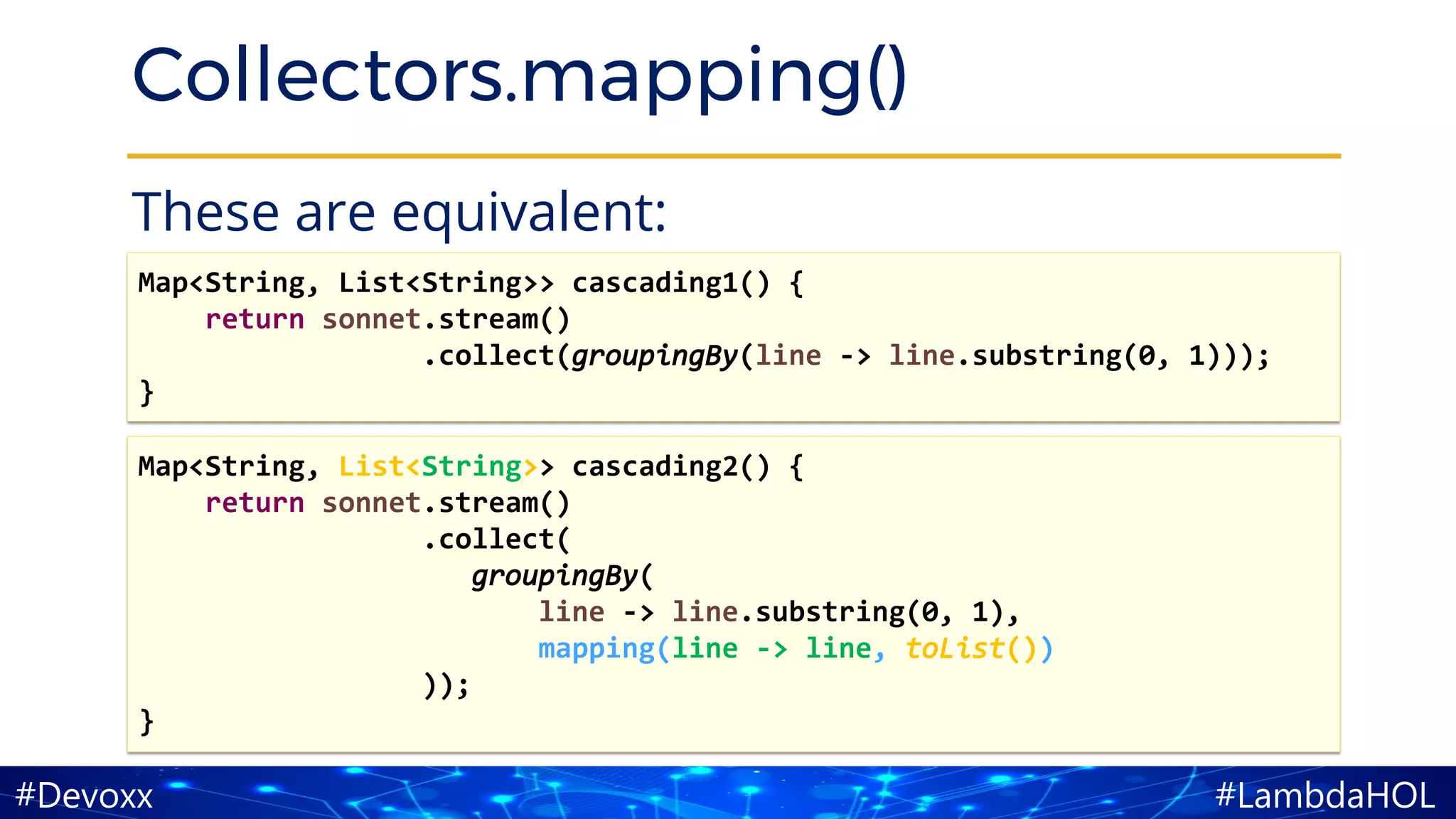
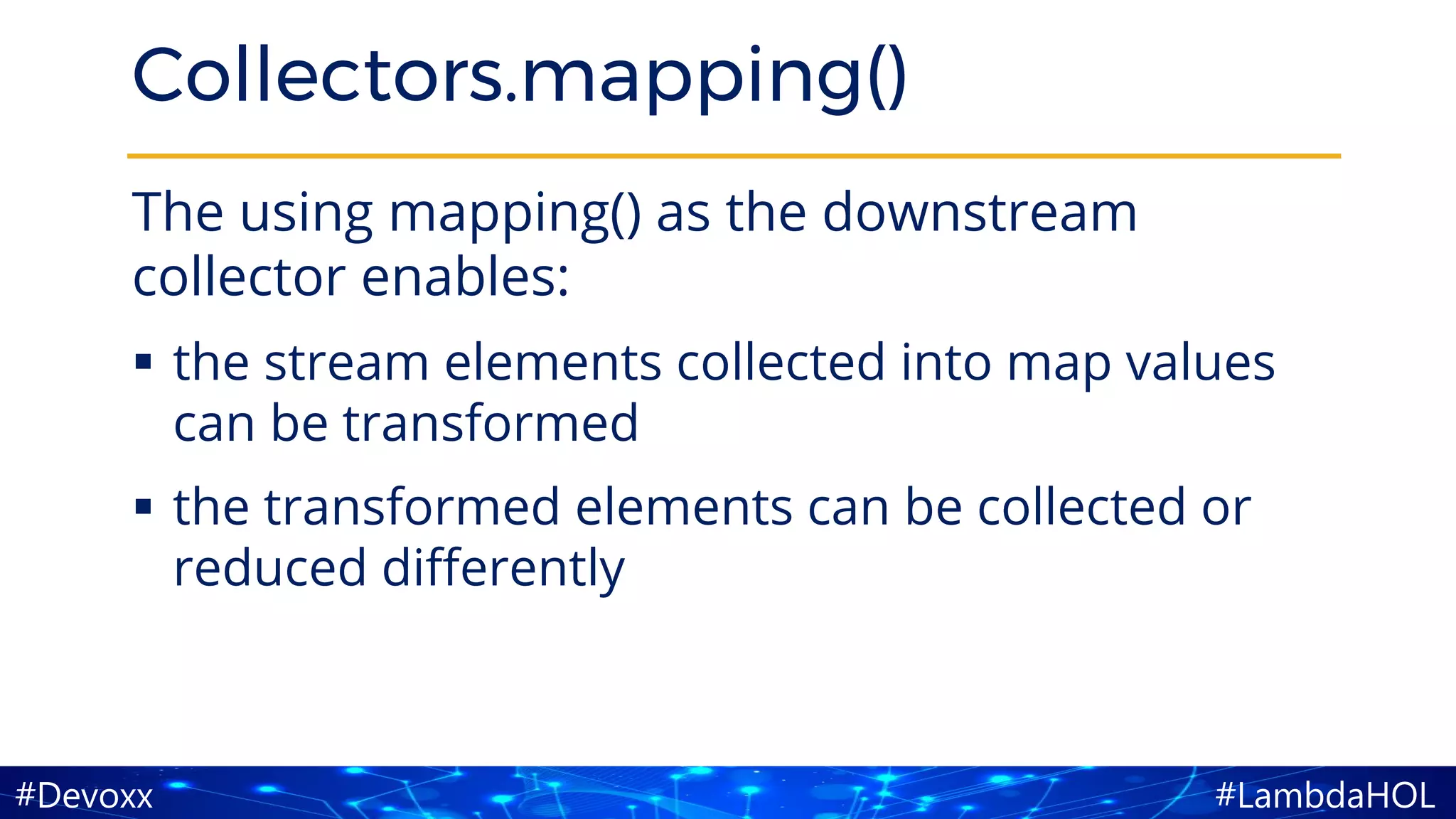
![#LambdaHOL#Devoxx
Collectors.mapping()
Map<String, List<Integer>> cascading3() {
return sonnet.stream()
.collect(
groupingBy(
line -> line.substring(0, 1),
mapping(String::length, toList())
));
} P => [40]
A => [36, 46]
B => [40, 45]
T => [43, 46, 45, 46]
F => [42, 53]
W => [41]
H => [38]
M => [37]](https://image.slidesharecdn.com/devoxxbe-2018-part02-181114210036/75/Lambdas-and-Streams-Master-Class-Part-2-68-2048.jpg)
![#LambdaHOL#Devoxx
Cascading Collectors — Exercise
Group the lines of the sonnet by first letter, and
collect the first word of grouped lines into a set.
To extract the first word of a line, use
string.split(" +")[0]](https://image.slidesharecdn.com/devoxxbe-2018-part02-181114210036/75/Lambdas-and-Streams-Master-Class-Part-2-69-2048.jpg)
![#LambdaHOL#Devoxx
Cascading Collectors — Solution
Map<String, Set<Integer>> cascading3() {
return sonnet.stream()
.collect(
groupingBy(
line -> line.substring(0, 1),
mapping(line -> line.split(" +")[0], toSet())
));
} P => [Pity]
A => [And, And,]
B => [But]
T => [That, Thy, To, Thou]
F => [Feed'st, From]
W => [Within]
H => [His]
M => [Making]](https://image.slidesharecdn.com/devoxxbe-2018-part02-181114210036/75/Lambdas-and-Streams-Master-Class-Part-2-70-2048.jpg)
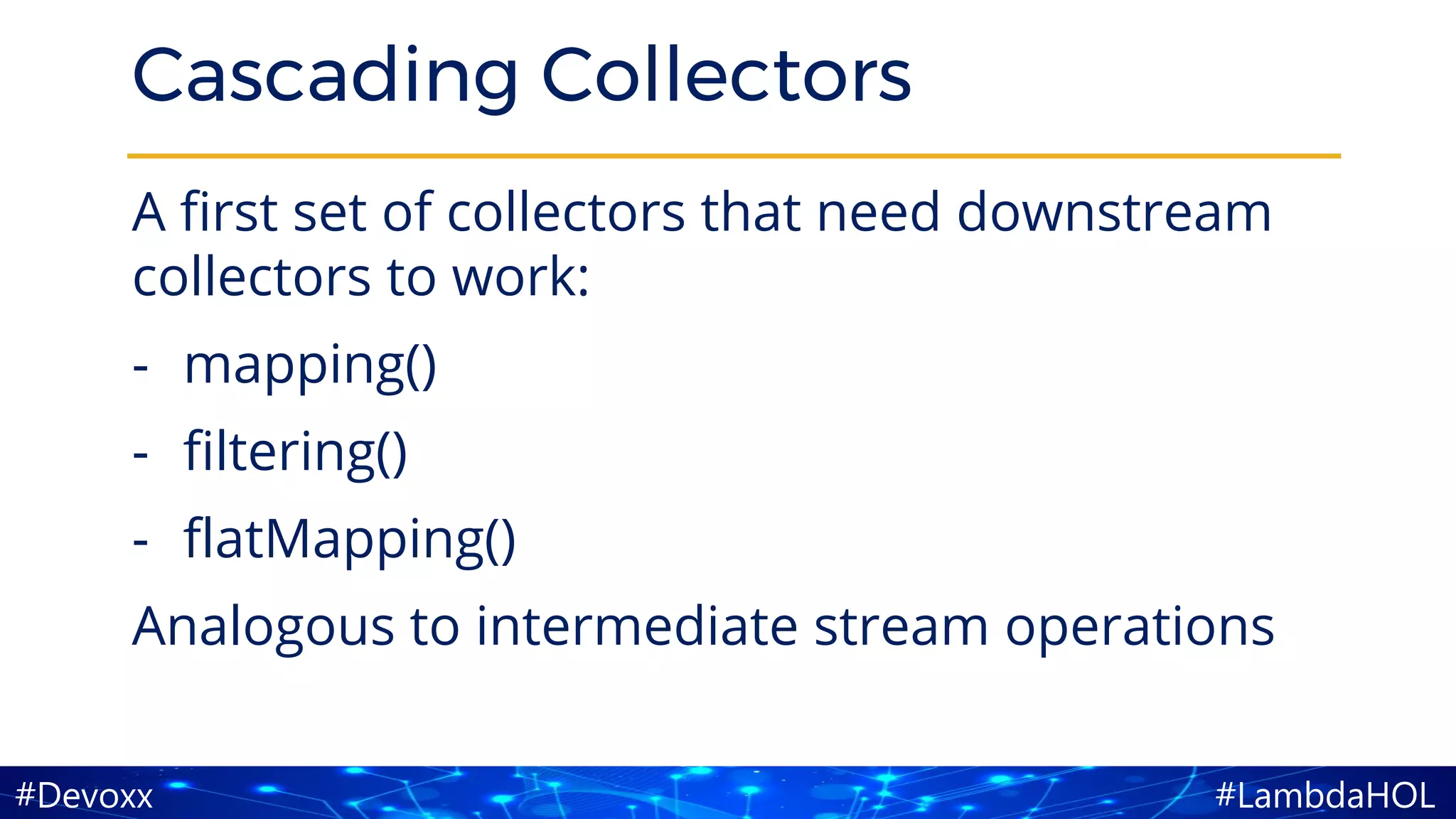
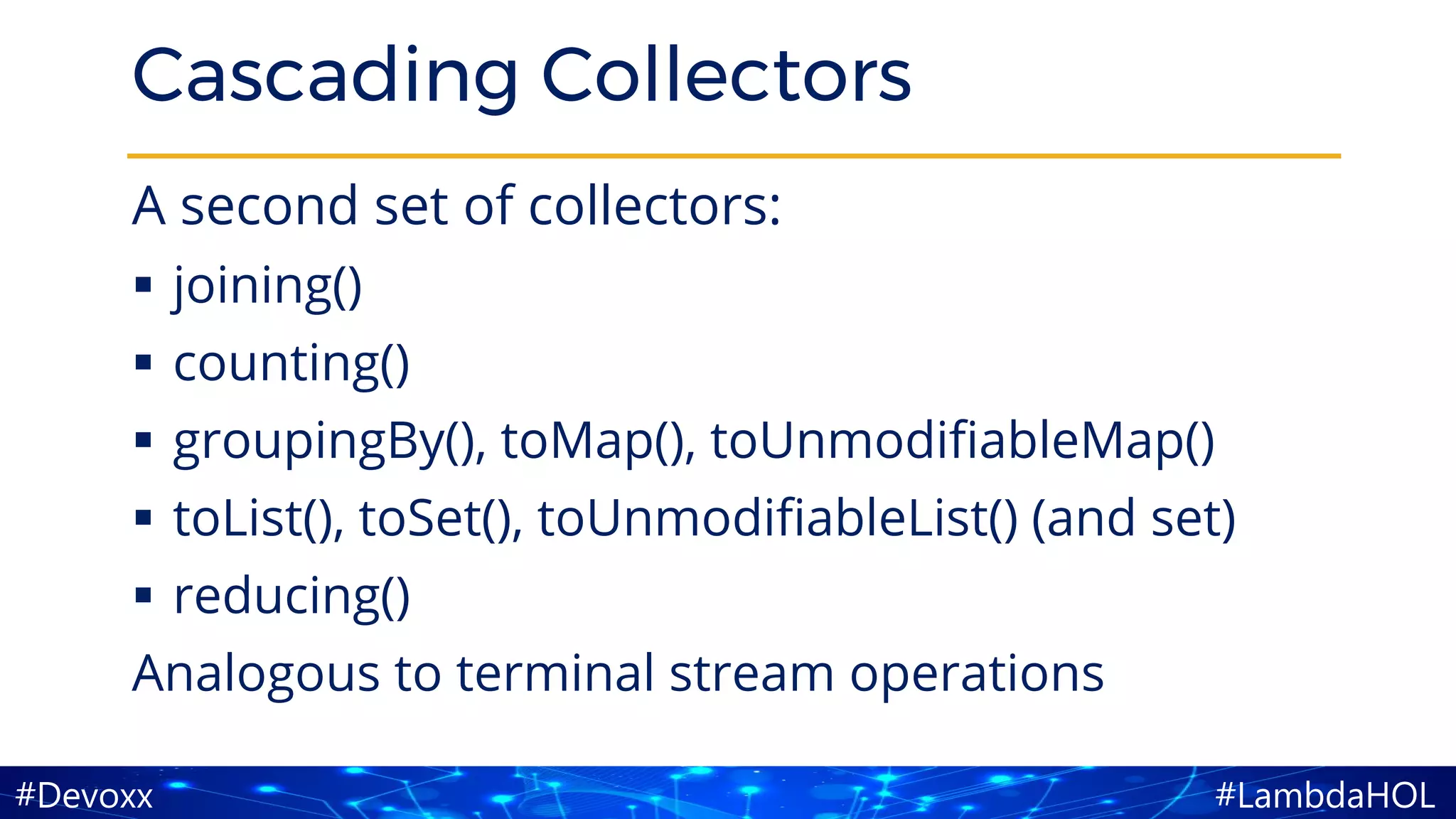
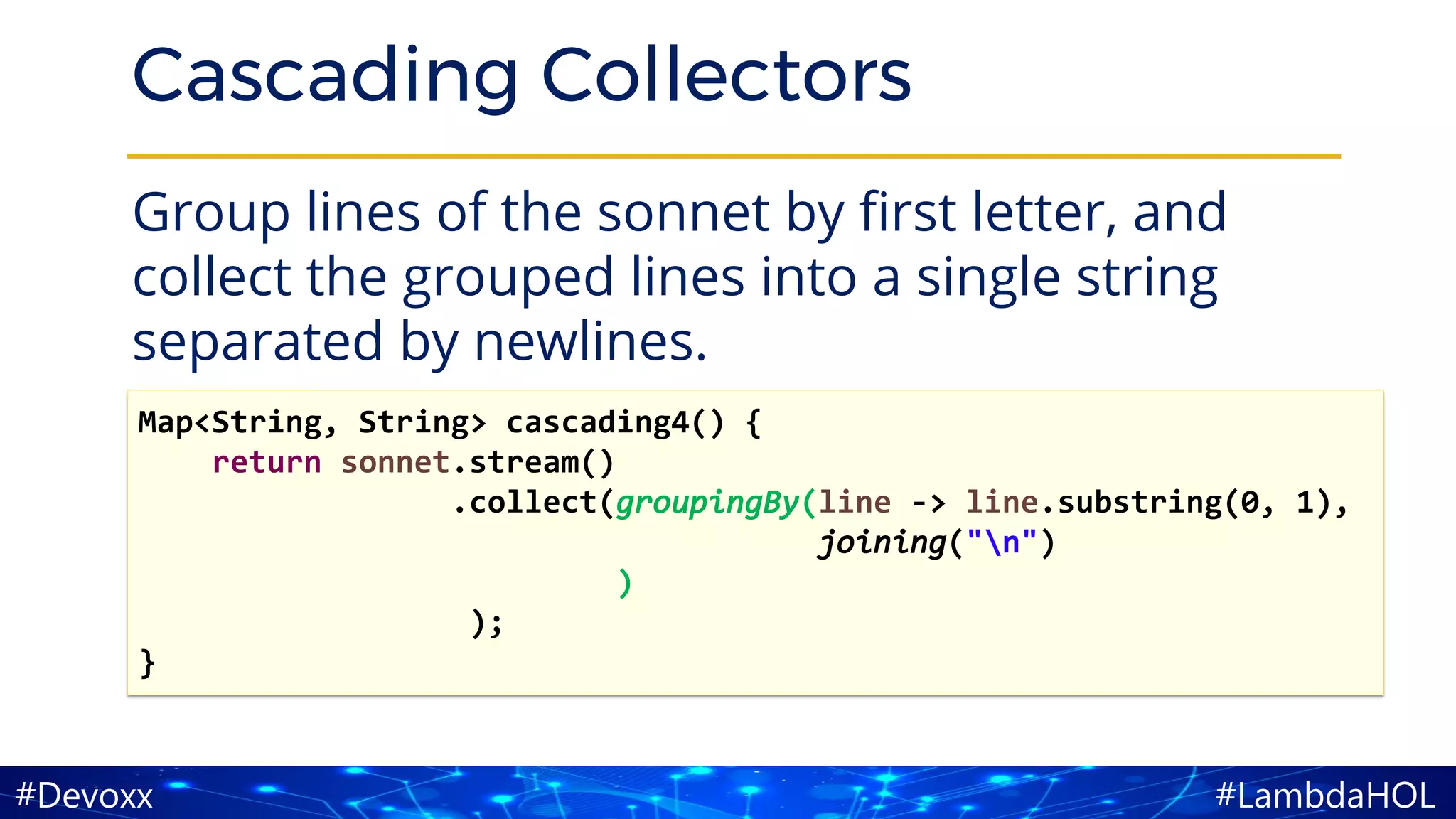
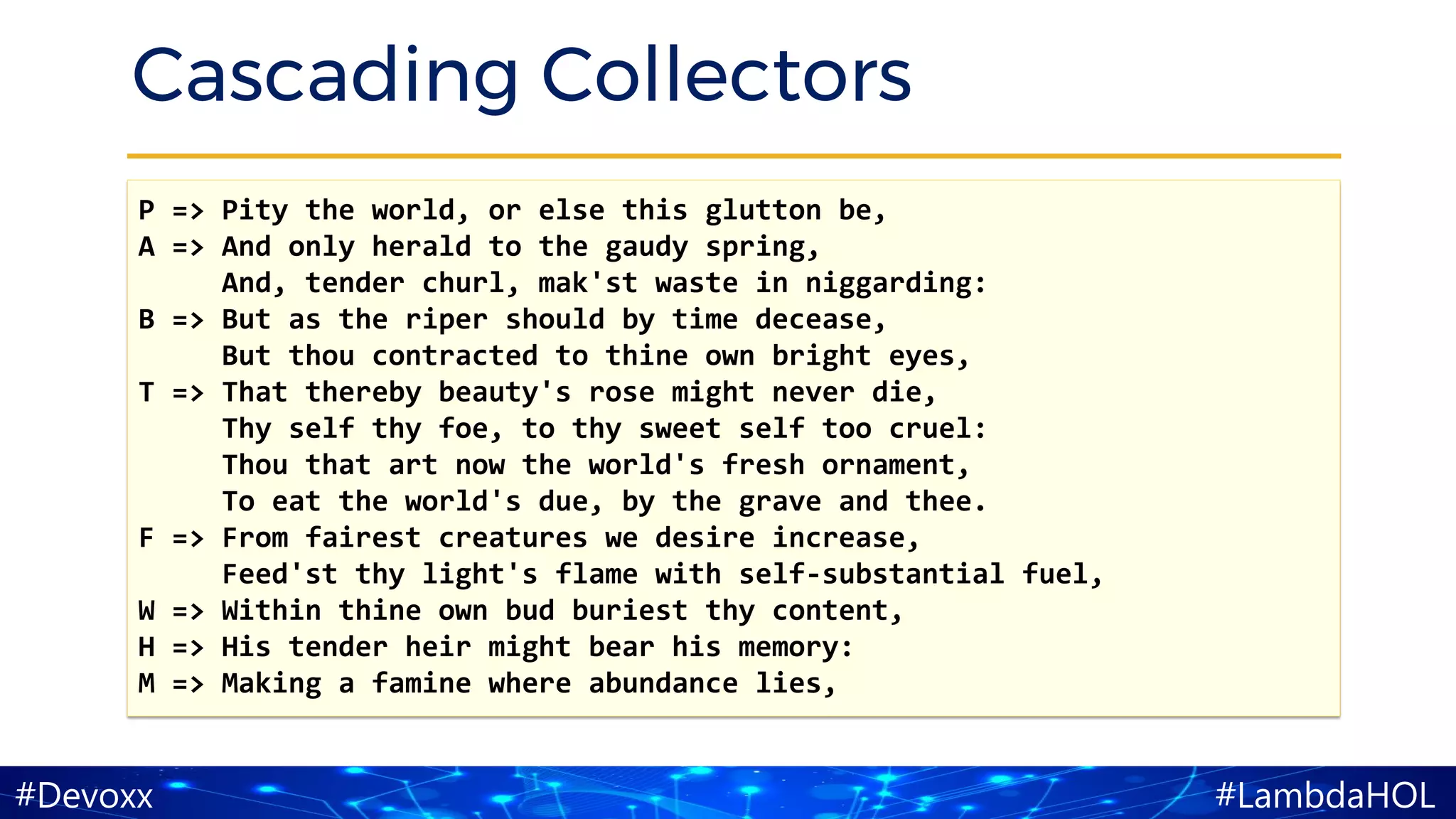
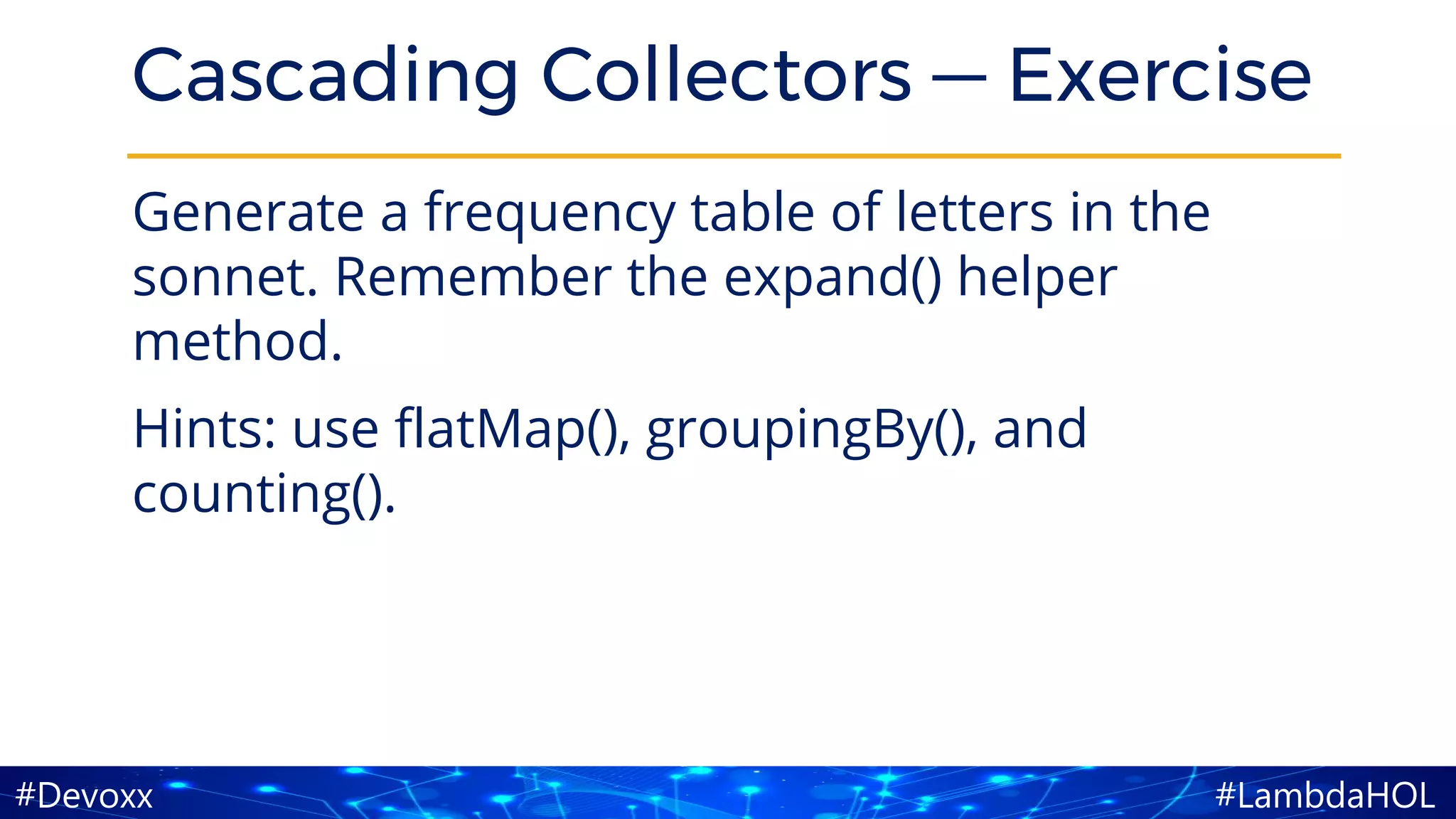
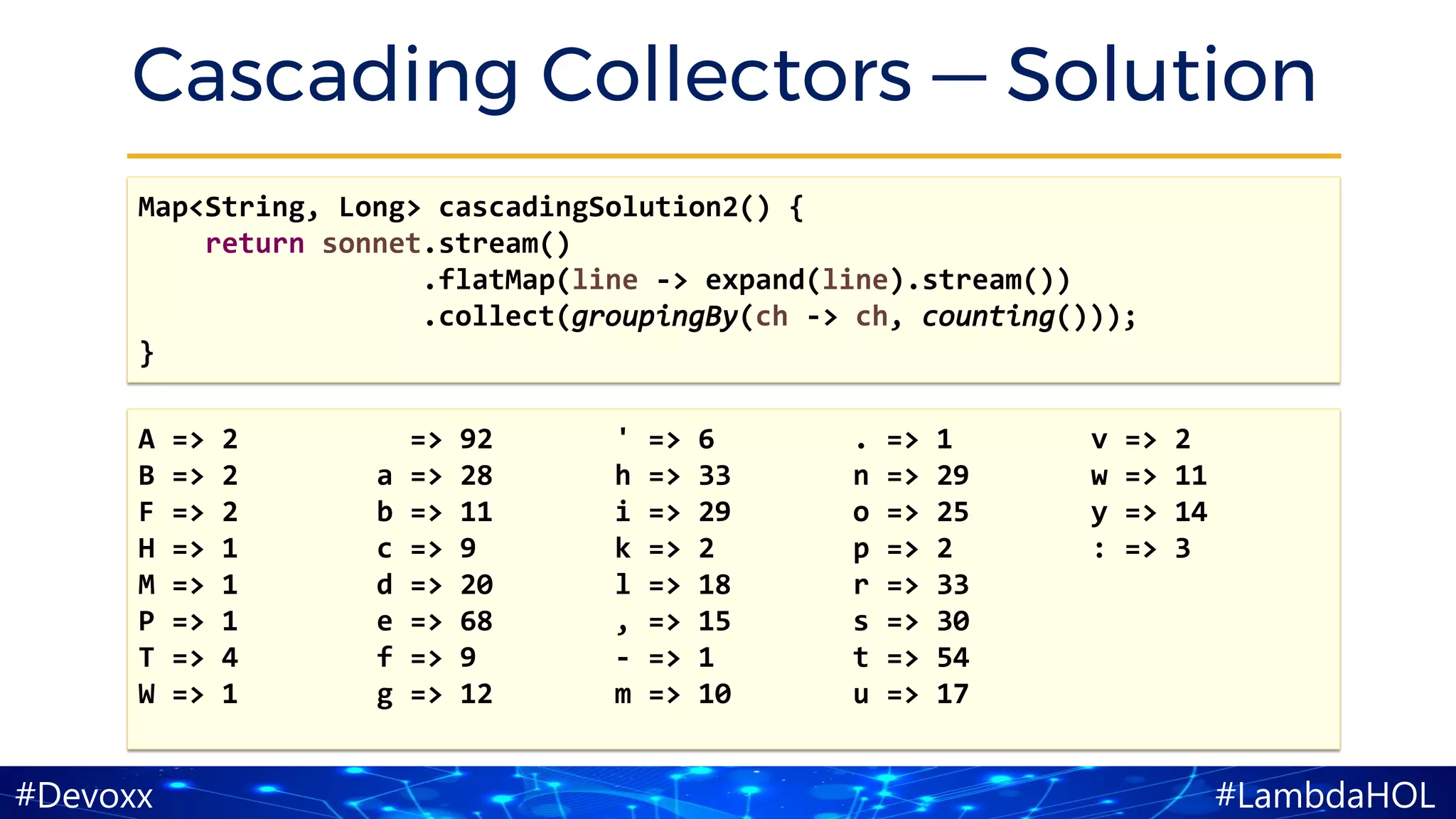
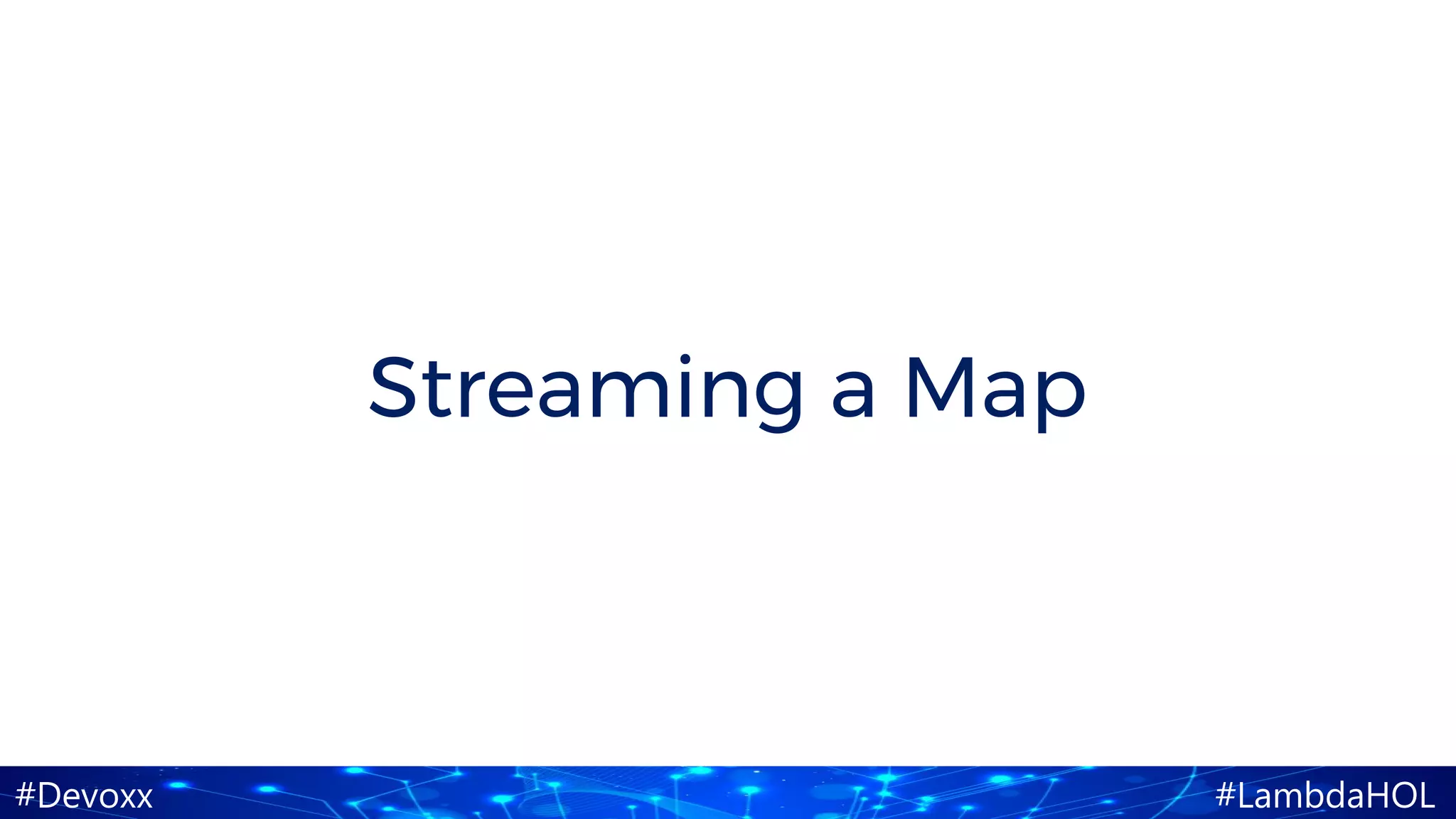
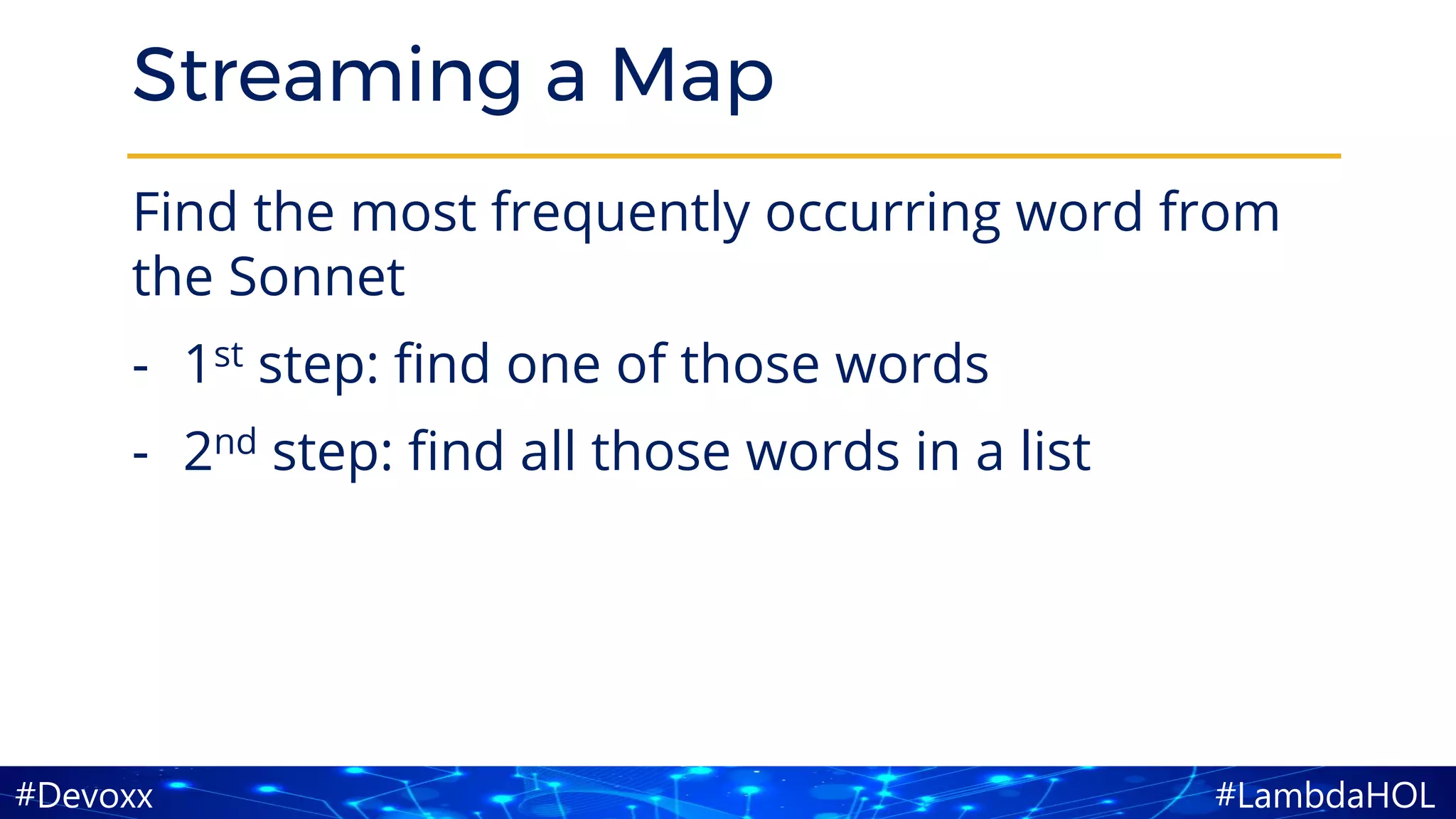
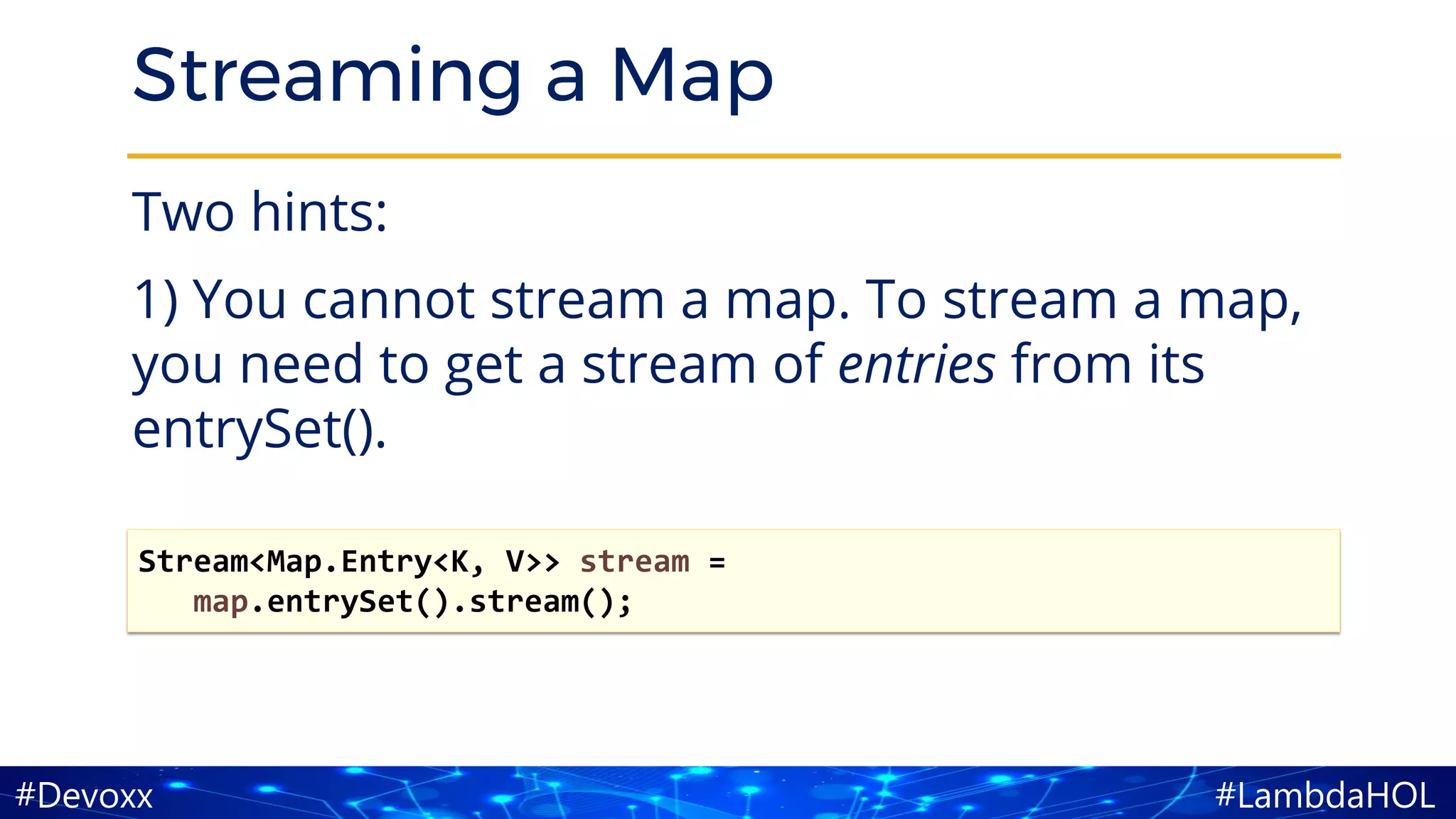
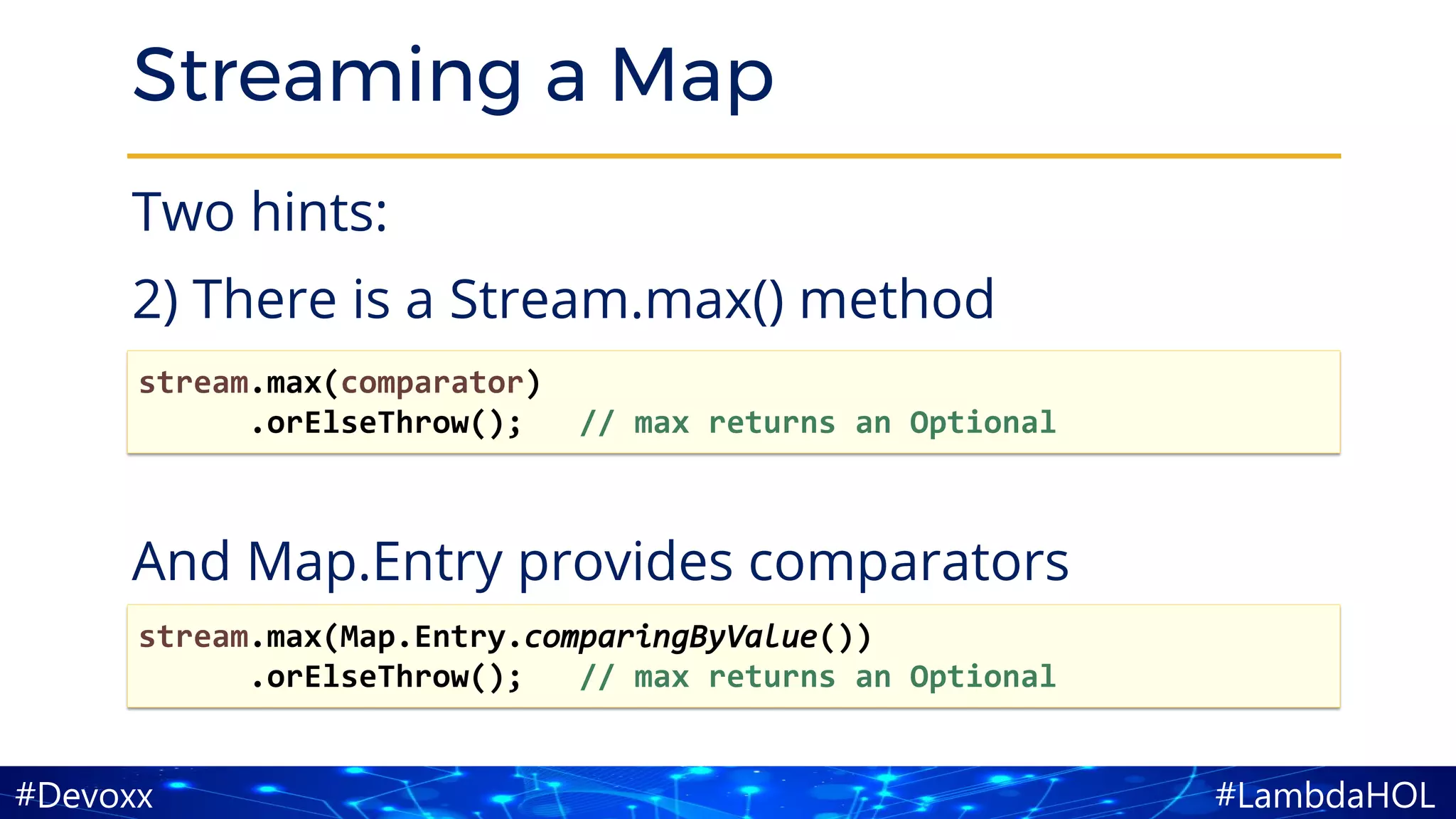
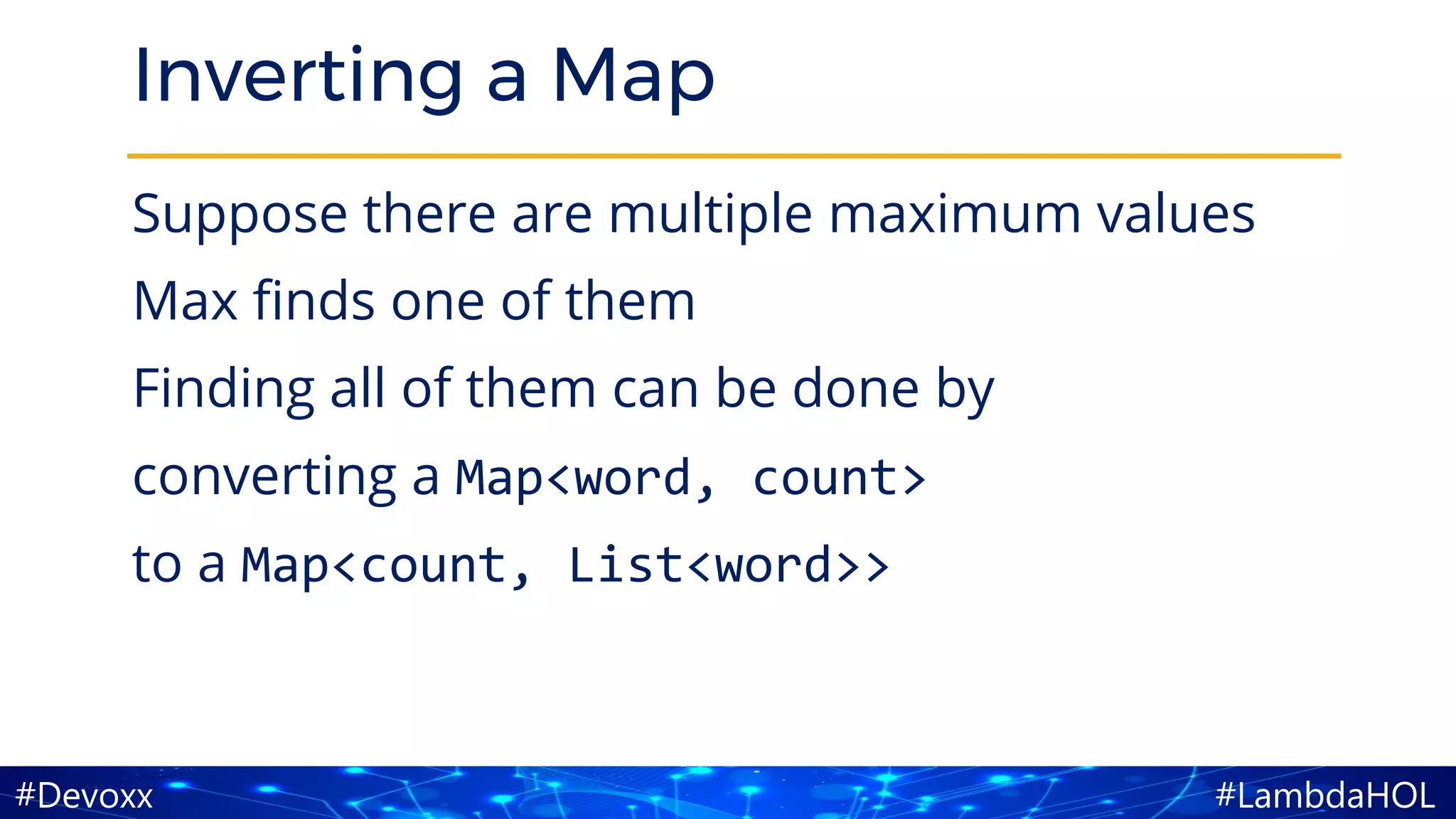
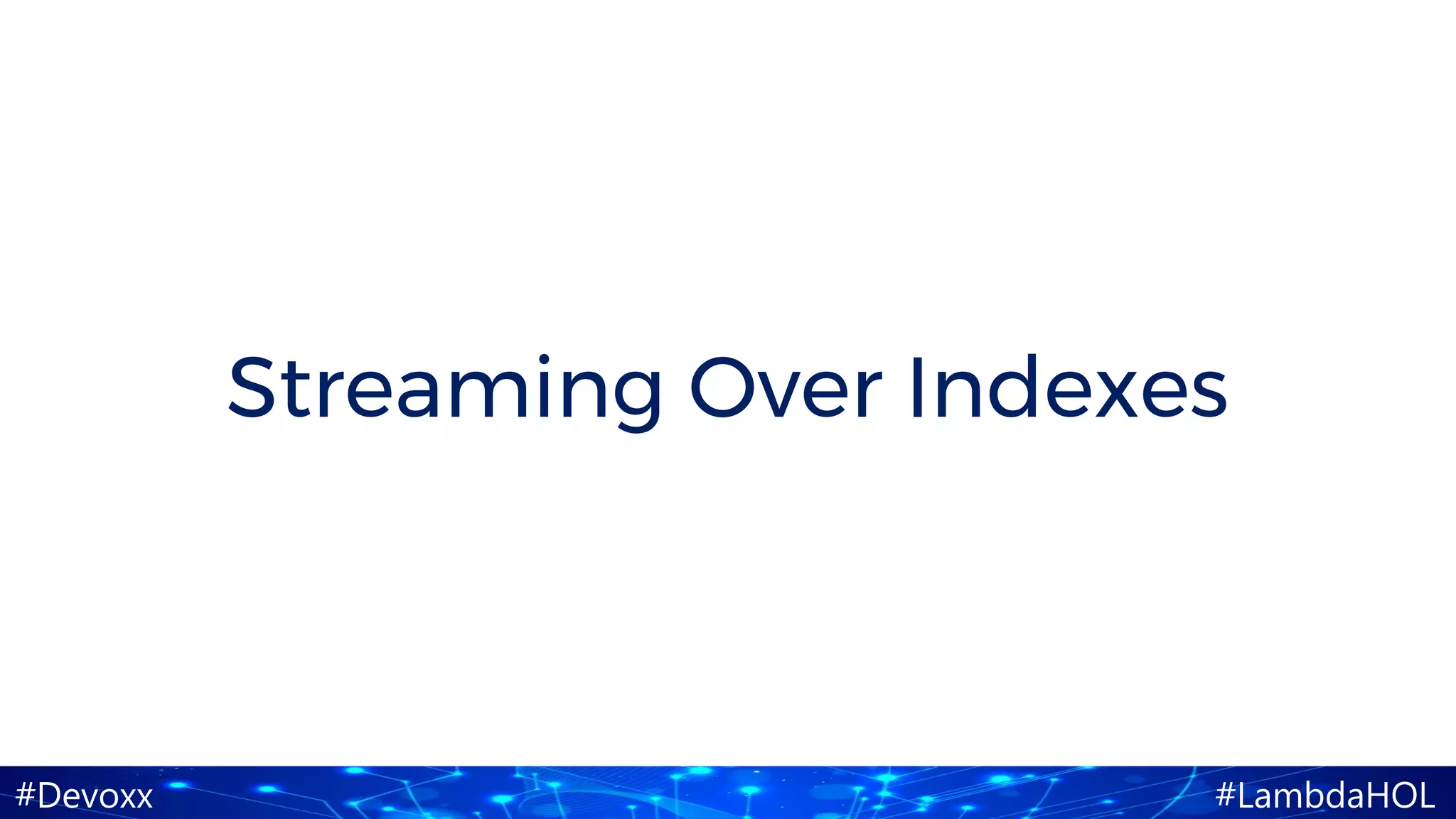
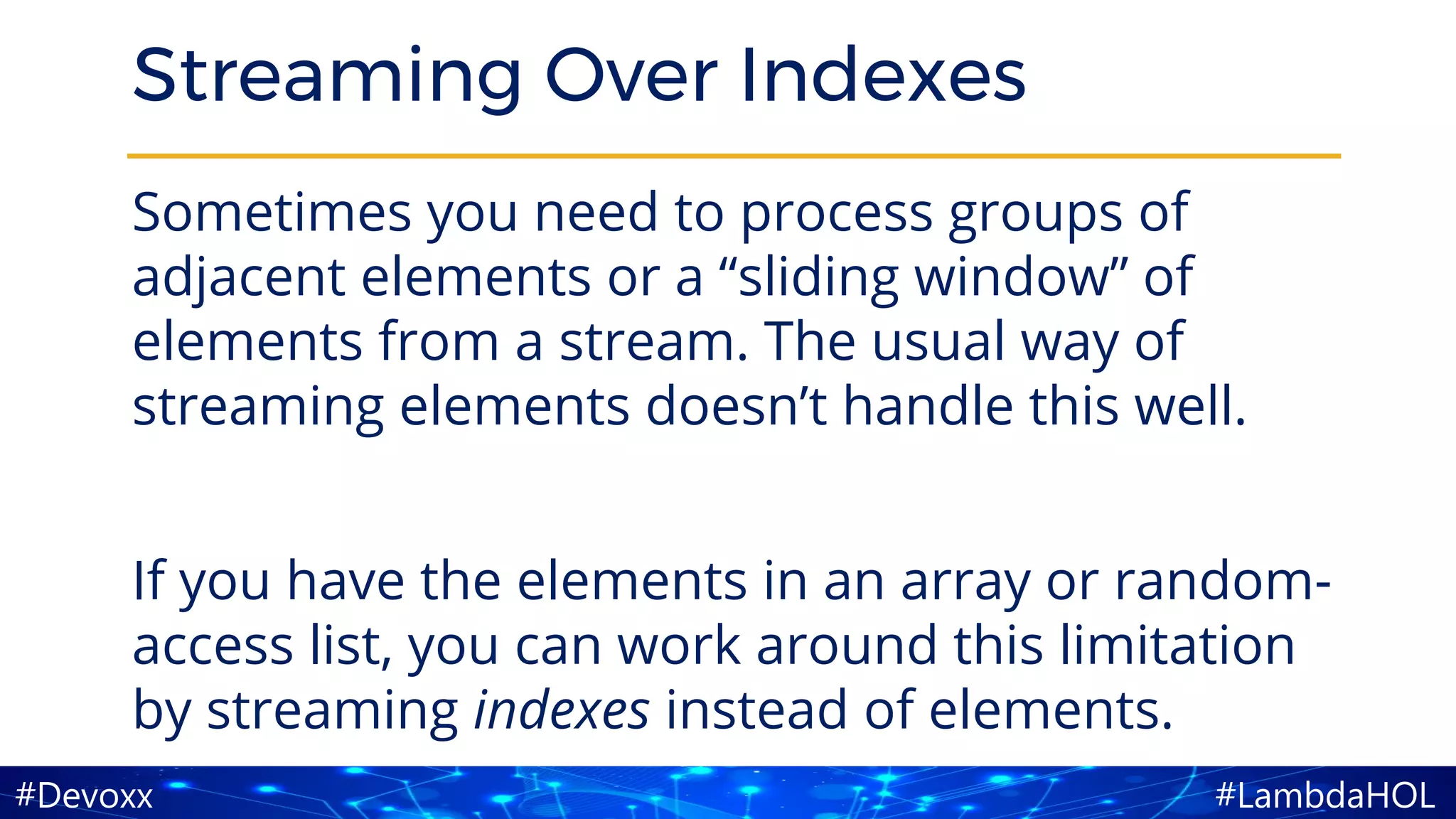
![#LambdaHOL#Devoxx
Streaming Over Indexes
Split into sublists of size N adjacent elements:
N=3:
List<List<String>> streamIndexes1(int N) {
int SIZE = alphabet.size();
return IntStream.range(0, SIZE/N)
.mapToObj(i -> alphabet.subList(N*i, N*(i+1)))
.collect(toList());
}
[[alfa, bravo, charlie], [delta, echo, foxtrot], [golf, hotel, india],
[juliet, kilo, lima], [mike, november, oscar], [papa, quebec, romeo],
[sierra, tango, uniform], [victor, whiskey, x-ray]]](https://image.slidesharecdn.com/devoxxbe-2018-part02-181114210036/75/Lambdas-and-Streams-Master-Class-Part-2-84-2048.jpg)
![#LambdaHOL#Devoxx
Streaming Over Indexes
Adjust ranges and protect bounds with min():
List<List<String>> streamIndexes2(int N) {
int SIZE = alphabet.size();
return IntStream.range(0, (SIZE+N-1)/N)
.mapToObj(i -> alphabet.subList(N*i, Math.min(SIZE, N*(i+1))))
.collect(toList());
}
[[alfa, bravo, charlie], [delta, echo, foxtrot], [golf, hotel, india],
[juliet, kilo, lima], [mike, november, oscar], [papa, quebec, romeo],
[sierra, tango, uniform], [victor, whiskey, x-ray], [yankee, zulu]]](https://image.slidesharecdn.com/devoxxbe-2018-part02-181114210036/75/Lambdas-and-Streams-Master-Class-Part-2-85-2048.jpg)
![#LambdaHOL#Devoxx
Streaming Over Indexes
Alternatively, use rangeClosed():
List<List<String>> streamIndexes2(int N) {
int SIZE = alphabet.size();
return IntStream.rangeClosed(0, (SIZE+N-1)/N)
.mapToObj(i -> alphabet.subList(N*i, Math.min(SIZE, N*(i+1))))
.collect(toList());
}
[[alfa, bravo, charlie], [delta, echo, foxtrot], [golf, hotel, india],
[juliet, kilo, lima], [mike, november, oscar], [papa, quebec, romeo],
[sierra, tango, uniform], [victor, whiskey, x-ray], [yankee, zulu]]](https://image.slidesharecdn.com/devoxxbe-2018-part02-181114210036/75/Lambdas-and-Streams-Master-Class-Part-2-86-2048.jpg)
![#LambdaHOL#Devoxx
Streaming Over Indexes — Exercise
From the alphabet list, produce a list of
overlapping sublists of length N (sliding
window)
[[alfa, bravo, charlie], [bravo, charlie, delta], [charlie, delta,
echo], [delta, echo, foxtrot], [echo, foxtrot, golf], ...](https://image.slidesharecdn.com/devoxxbe-2018-part02-181114210036/75/Lambdas-and-Streams-Master-Class-Part-2-87-2048.jpg)
![#LambdaHOL#Devoxx
Streaming Over Indexes — Solution
One solution:
[[alfa, bravo, charlie], [bravo, charlie, delta], [charlie, delta,
echo], [delta, echo, foxtrot], [echo, foxtrot, golf], ...
List<List<String>> streamIndexesSolution1(int N) {
int SIZE = alphabet.size();
return IntStream.range(0, SIZE-N+1)
.mapToObj(i -> alphabet.subList(i, i+N))
.collect(toList());
}](https://image.slidesharecdn.com/devoxxbe-2018-part02-181114210036/75/Lambdas-and-Streams-Master-Class-Part-2-88-2048.jpg)
![#LambdaHOL#Devoxx
Streaming Over Indexes — Solution
Variation:
[[alfa, bravo, charlie], [bravo, charlie, delta], [charlie, delta,
echo], [delta, echo, foxtrot], [echo, foxtrot, golf], ...
List<List<String>> streamIndexesSolution2(int N) {
int SIZE = alphabet.size();
return IntStream.rangeClosed(N, SIZE)
.mapToObj(i -> alphabet.subList(i-N, i))
.collect(toList());
}](https://image.slidesharecdn.com/devoxxbe-2018-part02-181114210036/75/Lambdas-and-Streams-Master-Class-Part-2-89-2048.jpg)
![#LambdaHOL#Devoxx
Streaming Over Indexes — Exercise 2
Split the alphabet list into runs (sublists) of
strings of non-decreasing length, preserving
order.
That is, within each sublist, the next string
should always be the same length or longer.
[[alfa, bravo, charlie], [delta], [echo, foxtrot], [golf, ...] ...]](https://image.slidesharecdn.com/devoxxbe-2018-part02-181114210036/75/Lambdas-and-Streams-Master-Class-Part-2-90-2048.jpg)
![#LambdaHOL#Devoxx
Streaming Over Indexes — Solution 2
Insight: a new sublist starts when this string is
shorter than the previous string. Find the
indexes where this occurs.
[3, 4, 6, 10, 14, 15, 17, 19, 21, 23, 25]
List<Integer> breaks =
IntStream.range(1, alphabet.size())
.filter(i -> alphabet.get(i).length() <
alphabet.get(i-1).length())
.boxed()
.collect(toList());](https://image.slidesharecdn.com/devoxxbe-2018-part02-181114210036/75/Lambdas-and-Streams-Master-Class-Part-2-91-2048.jpg)
![#LambdaHOL#Devoxx
Streaming Over Indexes — Solution 2
We want sublists between these breaks. Run a
stream over the breaks to generate sublists.
[[delta], [echo, foxtrot], [golf, hotel, india, juliet], [kilo, lima,
mike, november], [oscar], [papa, quebec], [romeo, sierra], [tango,
uniform], [victor, whiskey], [x-ray, yankee]]
List<List<String>> sublists =
IntStream.range(0, breaks.size()-1)
.mapToObj(i -> alphabet.subList(breaks.get(i),
breaks.get(i+1)))
.collect(toList());](https://image.slidesharecdn.com/devoxxbe-2018-part02-181114210036/75/Lambdas-and-Streams-Master-Class-Part-2-92-2048.jpg)
![#LambdaHOL#Devoxx
Streaming Over Indexes — Solution 2
Add starting and ending indexes to break list to
pick up leading and trailing sublists.
[[alfa, bravo, charlie], [delta], [echo, foxtrot], [golf, hotel, india,
juliet], [kilo, lima, mike, november], [oscar], [papa, quebec], [romeo,
sierra], [tango, uniform], [victor, whiskey], [x-ray, yankee], [zulu]]
breaks.add(0, 0);
breaks.add(alphabet.size());
List<List<String>> sublists =
IntStream.range(0, breaks.size()-1)
.mapToObj(i -> alphabet.subList(breaks.get(i),
breaks.get(i+1)))
.collect(toList());](https://image.slidesharecdn.com/devoxxbe-2018-part02-181114210036/75/Lambdas-and-Streams-Master-Class-Part-2-93-2048.jpg)
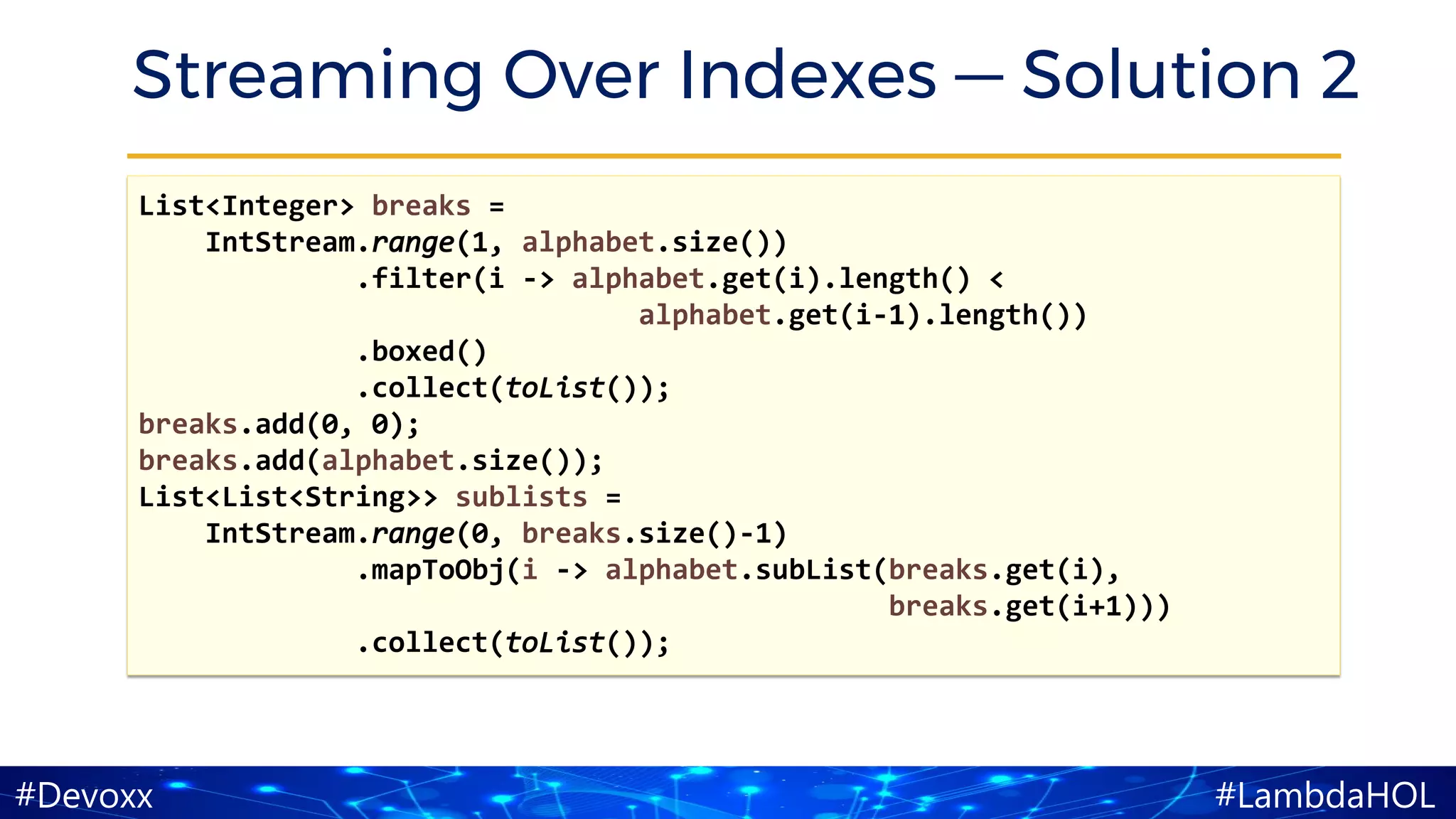
![#LambdaHOL#Devoxx
Streaming Over Indexes — Solution 2
[[alfa, bravo, charlie], [delta], [echo, foxtrot], [golf, hotel, india,
juliet], [kilo, lima, mike, november], [oscar], [papa, quebec], [romeo,
sierra], [tango, uniform], [victor, whiskey], [x-ray, yankee], [zulu]]](https://image.slidesharecdn.com/devoxxbe-2018-part02-181114210036/75/Lambdas-and-Streams-Master-Class-Part-2-95-2048.jpg)
